 31/05/2013 16:16 31/05/2013 16:16 |
|
| | | OFFLINE | | Post: 26.771
Post: 9.256 | Registrato il: 28/08/2005
Registrato il: 20/01/2009 | Administratore | Utente Master | |
|


ALWAYS AND EVER OUR MOST BELOVED BENEDICTUS XVI




Friday, May 31, Eighth Week in Ordinary Time

FEAST OF THE VISITATION
Orthodox icons of the Visitation (extreme left and extreme right, above) usually portray Jesus and John the Baptist, the two other protagonists of the scene, as babies in their mother's wombs. Center photo is the contemporary portrayal of the Biblical scene in the Church of the Visitation at Ein Karim just outside Jerusalem, built at what is traditionally believed to have been the site of the meeting. The contemporary icon towards the right is also from Ein Karim.
Readings for today's Mass:
www.usccb.org/bible/readings/053113.cfm
AT THE VATICAN TODAY
Pope Francis met with
- H.E. Vuk Jeremić, President of the 67th session of the Unitede Nations General Assembly, with his delegation
- Cardinal Fernando Filoni, Prefect of the Congregation for the Evangelization of Peoples (weekly meeting)
- Mons. Luis Francisco Ladaria Ferrer, S.J., Secretary of the Congregation for the Doctrine of the Faith
At 8:00 p.m., Pope Francis will close the Marian month of May by leading the rosary in St. Peter's Square.
He will deliver a meditation and give his apostolic blessing. Benedict XVI presided at a similar observance
in 2008. (In other years, the occasion was marked by a candlelight procession from St. Peter's Square to the shrine
of Our Lady of Lourdes in the Vatican Gardens, where the Pope addressed the faithful and imparted his blessing.

One year ago...
Benedict XVI led the traditional celebration marking the end of Mary's month at the shrine to Our Lady of Lourdes in the Vatican Gardens. He was leave the next day for a three-day pastoral visit to Milan where he would preside at the concluding events of the VII World Encounter of Families.

Photos in strip from 2011 prayer.
Traditional Vatican procession
and prayer ends Marian month

May 31, 2012
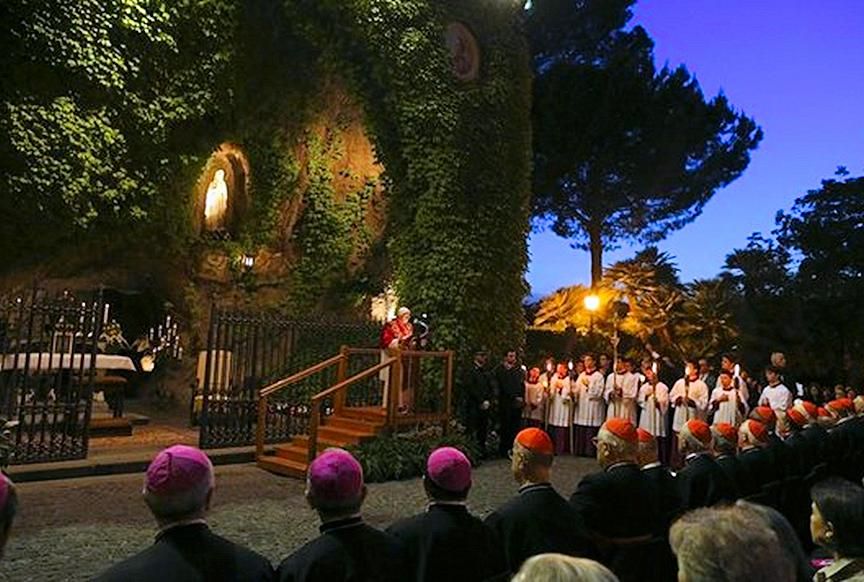
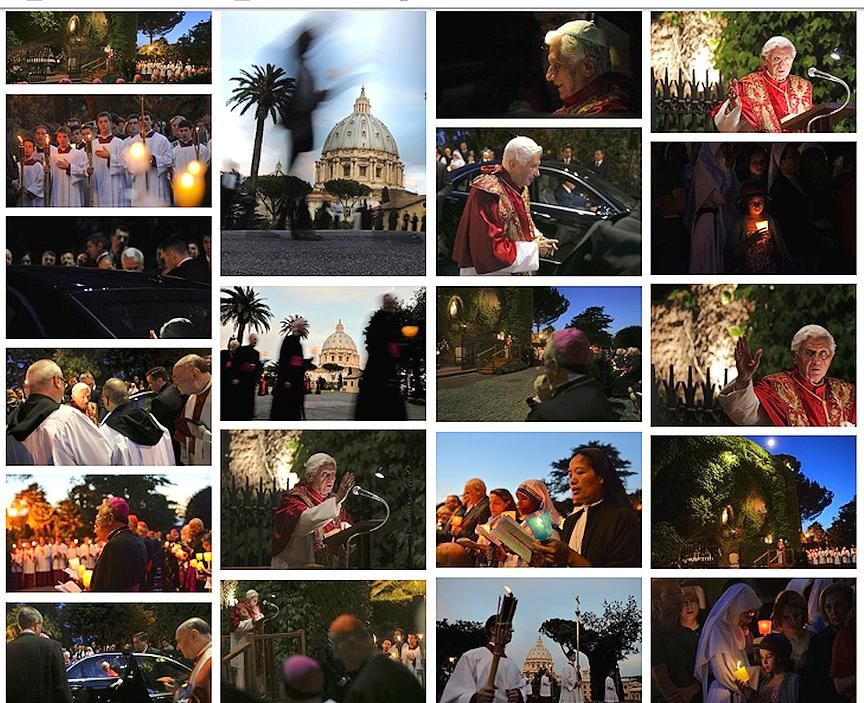
The rites began at 8 pm. with the traditional procession and recitation of the Rosary, starting from the Church of Santo Stefano degli Abissini opposite the apse of St. Peter's Basilica, towards the grotto of Our Lady of Lourdes in the Vatican Gardens. The procession was led by Cardinal Angelo Comastri, the Pope's Vicar-General for the Vatican and Arch-Priest of St. Peter's Basilica.
The Holy Father joined the assembly at 9 pm and addressed the faithful before imparting his Apostolic Blessing. Here is a translation of his words:
I am always very happy to take part in this Marian vigil at the Vatican - a moment which, despite the presence of so many people, always has an intimate and familial character.
The month which the devotion of the faithful dedicate very especially to veneration of the Mother of God closes with the liturgical feast of the 'second joyful mystery': Mary's visit to her relative Elizabeth.
This event is characterized by the joy expressed in the words with which the Blessed Virgin glorifies the Almighty for the great things that he had done despite the humility of his handmaid: "My soul proclaims the greatness of the Lord; my spirit rejoices in God my savior" (Lk 1,46).
The Magnificat is the song of praise that arises from mankind redeemed by divine mercy, it rises form all the people of God. At the same time, it is the hymn that denounces the illusion of those who think they are the lords of history and arbiters of their own destiny.
Instead, Mary gad placed God at the center of her life, she had abandoned herself trustfully to his will, in an attitude of humble obedience to his plan of love.
Because of this poverty of spirit and humility of heart, she was chosen to be the temple who would carry in her the Word, God made man. Because of this, too, she was be prefigured by the 'daughter of Zion' whom the prophet Sophronius had invited to rejoice and exult with joy (cfr Sof 3,14).
Dear friends, this evening let us turn our look to Mary with renewed filial affection. We always have something to learn from our heavenly mother: her faith invites us to look beyond appearances and believe firmly that our daily difficulties are a preparation for a spring that began with Jesus Christ.
We wish to draw tonight from the Immaculate Heart of Mary with renewed trust so that we can let ourselves be infected with her joy, which finds its deepest wellspring in the Lord.
Joy, a fruit of the Holy Spirit, is a distinctive basic element of the Christian: It is founded on hope in God, it draws strength from incessant prayer, it allows us to face tribulations with serenity.
St. Paul reminds us: "Rejoice in hope, endure in affliction, persevere in prayer" (Rm 12,12). These words of the Apostle are like an echo of Mary's Magnificat, and exhort us to reproduce in ourselves, in our life of everyday, the sentiments of joy in the faith, as it is expressed in the Marian canticle.
I wish for each and everyone of you, dear brothers and sisters, venerated Cardinals, bishops, protests, consecrated persons, and faithful, that this spiritual joy, overflowing from the heart filled with gratitude of the Mother of Christ and our Mother, may be more consolidated in our spirits at the end of this month of May, in our personal and familial life, in every circle, especially in the life of the family here at the Vatican at the service of the universal Church.

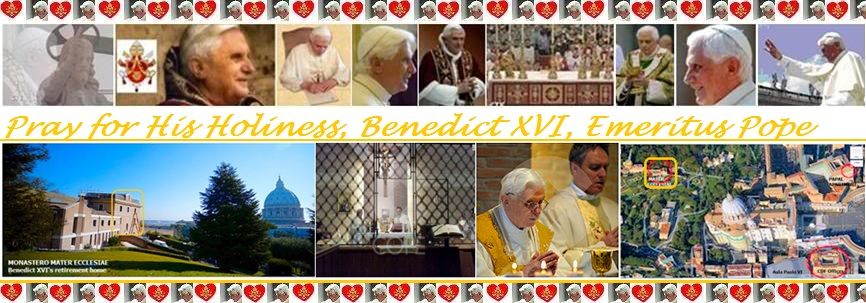
[Modificato da TERESA BENEDETTA 02/06/2013 15:18] |
| |
|
| |
 31/05/2013 17:22 31/05/2013 17:22 |
|
| | | OFFLINE | | Post: 26.772
Post: 9.257 | Registrato il: 28/08/2005
Registrato il: 20/01/2009 | Administratore | Utente Master | |
|
  Vatican Radio's English service now has the report and the translation of yesterday's homily...
Corpus Domini with Pope Francis
Vatican Radio's English service now has the report and the translation of yesterday's homily...
Corpus Domini with Pope Francis

May 31, 2013
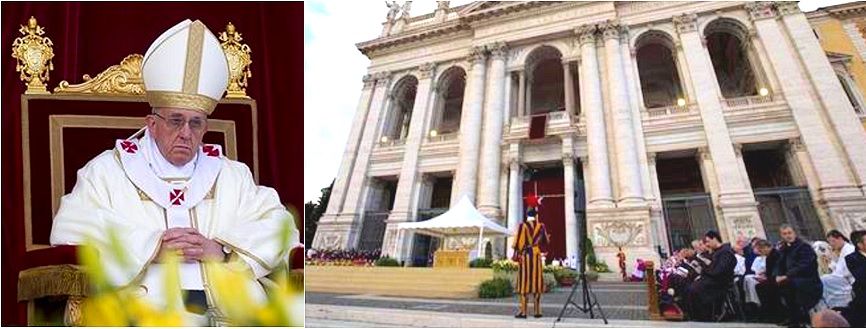 Pope Francis at his first Corpus Domini Mass as Pope at the Lateran Basilica. (2 out of 6 hardly representative photos of the event from Vatican Insider - again, no photo of the
Pope Francis at his first Corpus Domini Mass as Pope at the Lateran Basilica. (2 out of 6 hardly representative photos of the event from Vatican Insider - again, no photo of the
assembly.)
A crowd of about 20,000 gathered for an outdoor mass with Pope Francis on Thursday at the Basilica of Saint John Lateran to celebrate the Feast of Corpus Christi.
In his homily, the Pope commented on the day’s reading from the Gospel of St. Luke, which recounts how Jesus fed 5,000 people with five loaves of bread and two fish. The Gospel, he said, recalls three key words—discipleship, fellowship and sharing—and calls us to solidarity. Here is a full translation of the homily:
Dear brothers and sisters,
In the Gospel we have just heard, there is an expression of Jesus that always strikes me: “Give them somehting to eat. (Lk 9:13)” Starting from this sentence, I let myself be guided by three words: discipleship, fellowship and sharing.
1. First of all: who are those to whom we are to give to eat? The answer is found at the beginning of the Gospel: it is the crowd, the multitude. Jesus is in the midst of the people: He welcomes them, talks to them, He cures them, He shows them the mercy of God. In their midst, he chooses the twelve Apostles to be with Him, and like Him, to immerse themselves in the concrete situations of the world.
People follow Him, listen to Him, because Jesus speaks and acts in a new way, with the authority of someone who is authentic and consistent, who speaks and acts with truth, who gives the hope that comes from God, who is the revelation of the face of a God who is love - and the people with joy, bless God.
This evening we are the crowd of [which] the Gospel [tells]: let us also strive to follow Jesus, to listen to him, to enter into communion with Him in the Eucharist, to accompany Him and in order that He accompany us. Let us ask ourselves: how do I follow Jesus? Jesus speaks in silence in the Mystery of the Eucharist and every time reminds us that to follow Him means to come out of ourselves and make of our own lives, not a possession, but a gift to Him and to others.
2. Let us take a step forward: whence is born the invitation that Jesus makes to his disciples to feed the multitude themselves? It is born from two elements: first, the crowd, having followed Jesus, now finds itself in the open, away from inhabited areas, as evening falls, and then, because of the concern of the disciples, who asked Jesus to dismiss the crowd so that they might seek food and lodging in the nearby towns (cf. Lk 9:12).
Faced with the need of the crowd, the solution of the disciples is that every man should take care of himself: “Dismiss the crowd!” [the disciples say]. How many times do we Christians have this temptation! We do not care for the needs of others, dismissing them with a pitiful, “God help you.” Jesus’s solution, on the other hand, goes in another direction, a direction that surprises the disciples: “You give them something to eat.”
But how is it that we are to feed a multitude? “We have only five loaves and two fish, unless we go and buy food for all these people.” But Jesus is not discouraged. He asks the disciples to seat the people in communities of fifty people, He raises his eyes to heaven, recites the blessing, breaks the loaves, and gives them to the disciples for distribution.
It is a moment of profound communion: the crowd, whose thirst has been quenched by the word of the Lord, is now nourished by His bread of life – and they all ate their fill, the Evangelist tells us.
This evening, we too are gathered around the Lord’s table, the table of the Eucharistic Sacrifice, in which He gives us once again His body, makes present the one sacrifice of the Cross.
It is in listening to his Word, in nourishing ourselves with his Body and his Blood, that He makes us go from being a multitude to being a community, from [being strangers] to being [in] communion.
The Eucharist is the sacrament of communion, which brings us out from individualism to live together our journey in His footsteps, our faith in Him. We ought, therefore, to ask ourselves before the Lord: How do I live the Eucharist? Do I live it anonymously or as a moment of true communion with the Lord, [and] also with many brothers and sisters who share this same table? How are our Eucharistic celebrations?
3. A final element: whence is born the multiplication of the loaves? The answer lies in the invitation of Jesus to his disciples: “You yourselves give [to them]...,” “give,” share. What do the disciples share? What little they have: five loaves and two fishes. But it is precisely those loaves and fishes that in God’s hands feed the whole crowd.
And it is the disciples, bewildered by the inability of their means, by the poverty of what they have at their disposal, who invite the people to sit down, and - trusting the Word of Jesus – distribute the loaves and fishes that feed the crowd.
This tells us that in the Church, but also in society, a keyword that we need not fear is “solidarity,” that is, knowing how to place what we have at God’s disposal: our humble abilities, because [it is] only in the sharing, in the giving of them, that our lives will be fecund, will bear fruit. Solidarity: a word upon which the spirit of the world looks unkindly!
Tonight, once again, the Lord distributes for us the bread which is His body, He makes a gift of Himself. We, too, are experiencing the “solidarity of God” with man, a solidarity that never runs out, a solidarity that never ceases to amaze us: God draws near to us; in the sacrifice of the Cross He lowers Himself, entering into the darkness of death in order to give us His life, which overcomes evil, selfishness, death.
Jesus this evening gives Himself to us in the Eucharist, shares our same journey – indeed, He becomes food, real food that sustains our life even at times when the going is rough, when obstacles slow down our steps.
The Lord in the Eucharist makes us follow His path, that of service, of sharing, of giving – and what little we have, what little we are, if shared, becomes wealth, because the power of God, which is that of love, descends into our poverty to transform it.
Let us ask ourselves this evening, adoring the Christ truly present in the Eucharist: do I let myself be transformed by Him? Do I let the Lord who gives Himself to me, guide me to come out more and more from my little fence to get out and be not afraid to give, to share, to love Him and others?
Discipleship, communion and sharing. Let us pray that participation in the Eucharist move us always to follow the Lord every day, to be instruments of communion, to share with Him and with our neighbor who we are. Then our lives will be truly fruitful. Amen.
P.S. A CNS information bulletin says John Paul II revived the papal Corpus Domini procession in 1979 after 109 years, and that until 1994, he walked the distance between the Lateran Basilica and Santa Maria Maggiore. So it was not another 'first' for Pope Francis.
[Modificato da TERESA BENEDETTA 31/05/2013 17:46] |
| |
 31/05/2013 21:37 31/05/2013 21:37 |
|
| | | OFFLINE | | Post: 26.773
Post: 9.258 | Registrato il: 28/08/2005
Registrato il: 20/01/2009 | Administratore | Utente Master | |
|
 Cardinal Meisner 'in trouble'
Cardinal Meisner 'in trouble'
again for statement on natality
that was taken out of context
by Joe Carter

May 30, 2013
...A recent article that ran in the U.K.’s Daily Telegraph and was distributed by Canada’s National Post Wire Services, was entitled “Cardinal says German women should stay home and have ‘three or four children’ to avoid need for immigrants.”
Although the headline is both factual and neutral, it gives the impression the Catholic leader was asked, “So, what do you think about German women?” and answered that they need to get busy making babies. But the context is much more interesting [AND RELEVANT, NOT IMMATERIAL TO WHAT THE CARDINAL SAID!]:
German women should be encouraged to “stay at home and bring three or four children into the world,” rather than relying on immigration to solve the country’s demographic crisis, the Roman Catholic Archbishop of Cologne has declared.
Cardinal Joachim Meisner compared Angela Merkel’s government’s family policies to Communist East Germany, where, he said, women who stayed at home were considered “demented”.
Germany, which has the lowest birth rate in Europe, is seeking more workers from crisis-hit countries, including Spain, to solve its shortage of skilled labour.
In unusually direct criticism of the chancellor, Cardinal Meisner said: “Where are women really publicly encouraged to stay at home and bring three or four children into the world? This is what we should do, and not — as Mrs Merkel does now — simply present immigration as the solution to our demographic problem.”
So Germany has a demographic crisis (which creates an ongoing economic crisis) but the country’s government also, at least according to Cardinal Meisner, has policies that encourage women to work rather than solving the demography problem by having more children...
In order to g[account for] both preferences, a third-party has to sacrifice. As Cardinal Meisner implies, the third-party in this case is Spain and Portugal. Instead of having babies of their own, Germany’s plan is to import them when they reach working age.
As a representative of a transnational organization with strong pro-natalist leanings [i.e., the Catholic Church - and it is an understatement to say it has 'strong pro-natalist leanings' - it is unequivocally pro-natalist]!, Cardinal Meisner feels an obligation to note that producing the source material for future German journalists and archbishops is an important a job that shouldn’t be outsourced.
This is a legitimate disagreement about policy preferences and could have been used as a starting point for a discussion on how to resolve Germany’s demographic crisis. But instead, the Telegraph uses Cardinal Meisner’s statement as a proxy [pretext] for pointing out that the Catholic Church’s habit of telling people what they should do is out of touch with the times we live in:
Annegret Laakmann, the president of the Catholic group Women’s Dignity dismissed the 79-year-old archbishop’s views. “Age doesn’t always bring wisdom,” she said. “The Church can’t drag women back into the kitchen. We don’t live in the 1940s – women are more educated and have greater opportunity for leadership now.
“I myself only have one child, and that’s because I’ve always worked. It is difficult to combine children and a career.”
There’s nothing wrong (journalistically speaking) with quoting a source who believes having a career is more important than having babies. But shouldn’t the question be open for debate? The Telegraph doesn’t seem to think so which is why they add this non sequiter at the end of the article:
Cardinal Meisner also commented on the controversy in January when two Catholic hospitals denied treatment to a rape victim, apparently because they did not want to give advice on dealing with an unwanted pregnancy.
He said that while rape was a serious crime, the Church had to warn women against birth control methods that were not compatible with Catholic beliefs.
Now, what does this subject have to do with the original story? Nothing at all.
But it does help the newspaper’s readers understand that Cardinal Meisner has a tendency to tell people what choices they should make. And as Laakmann noted, we don’t live in the 1940s anymore. Religious leaders shouldn’t be telling us what desires and preferences should take precedence. Apparently, that is now a job reserved for journalists only.
[Modificato da TERESA BENEDETTA 31/05/2013 21:39] |
| |
 01/06/2013 13:52 01/06/2013 13:52 |
|
| | | OFFLINE | | Post: 26.774
Post: 9.259 | Registrato il: 28/08/2005
Registrato il: 20/01/2009 | Administratore | Utente Master | |
|
 Vatican bank chief's priority:
Vatican bank chief's priority:
Clean up IOR'S 'reputation'
not any actual financial mess

VATICAN CITY, May 31 The new head of the Vatican bank says his top priority is to clean up the bank's reputation, saying the institution hasn't served the Pope well [because of the 'bad' reputation - mostly undeserved!] but provides valuable financial services to the Holy See and its clients that should continue.
Ernst von Freyberg was named president of the Institute for Religious Works (IOR) in February, replacing Ettore Gotti Tedeschi, an Italian banker ousted by the bank's board last May for incompetence and other failings.
Von Freyberg's appointment was part of the Vatican's efforts to shed the bank's image as a secretive tax haven and improve its reputation in global financial circles following a series of scandals, including a money-laundering investigation launched by Rome prosecutors in 2010. [Apart frem the unceremonious dismissal of Gotti Tedeschi, which has nothing to do with any questionable dealings, the only 'scandal' that has happened at IOR in the eight years of Benedict XVi's Pontificate is the 2010 investigation mentioned - what this article does not mention is that the Italian prosecutors eventually released some $24 million euros they had frozen for a few months over this alleged questionable transaction, in which they insisted that an IOR fund transfer to a German bank to pay for bonds bought by the IOR was actrully done in behalf of some unnamed client or clients.]
In interviews published Friday, Von Freyberg said he had hired a leading firm, Promontory Financial Group, and the U.S.-based law firm Cleary Gottlieb Steen & Hamilton to ensure that the bank complies with anti-money laundering and anti-terror financing standards. He also hired an outside public relations expert, saying a big part of the bank's problem was its failure to communicate.
"When I came here, I thought I would need to focus on what is normally described as cleaning out and dealing with improper deposits,'' he told Vatican Radio. "There is -- until now -- nothing I can detect. That doesn't mean that there isn't anything, but it means that it is not our biggest issue. Our biggest issue is our reputation,'' he said.
Some of the sharpest calls for reform of the Vatican bureaucracy that accompanied the March election of Pope Francis focused on the bank and came from cardinals who suggested it needn't exist at all, given its shady reputation. [A reputation that has carried over from the catastrophic Banco Ambrosiano crash in 1982 that cost IOR some $250-million to restitute bank depositors, since IOR was the majority stockholder. A reputation the IOR never appeared to outlive. And the 'stupid' cardinals - pardon the language - were simply gung-ho to pile on any bad thing they could on Benedict XVI's Pontificate, as if they themselves have been running their dioceses faultlessly!]
Von Freyberg, a 54-year-old German industrialist and aristocrat, said the bank's 18,900 customers choose to stay with the IOR because it provides "very, very safe'' investment returns and other services such as asset management and wire transfers.
"They want us to be there,'' he said of the customers. But he acknowledged: "We haven't rendered a good service to the Holy Father with the reputation we have, and this reputation obscures the message. And that I consider my first and most important task to address.''
Earlier this month, Von Freyberg announced the bank would publish its annual report online for the first time on Oct. 1.
In a parallel bid to show greater transparency, the Vatican's new financial watchdog agency published its own annual report last week, revealing that six suspect transactions had been reported in 2012, two of which were forwarded onto Vatican prosecutors for further investigation.
Von Freyburg said, so far, another seven suspicious transactions have been reported by the bank in 2013.
The IOR was founded in 1942 by Pope Pius XII to manage assets destined for religious or charitable works. Located in a tower just inside the gates of Vatican City, it also manages the pension system for the Vatican's thousands of employees.
The IOR on Friday provided preliminary figures for 2012, saying its net profit was 86.6 million euros ($112.6 million), with total assets under management of 7.1 billion euros ($9.23 billion).
It didn't provide figures for 2011, saying only its average net profit from 2009-2012 was 69 million euros ($89.7 million). The bump was due in large part to the performance of Italian government bonds last year.
The bank is not open to the public. Depositors are usually limited to Vatican employees, religious orders and diplomats accredited by the Holy See, though its customer base has long been the subject of speculation that Italians were hiding money there to avoid paying taxes. Currently, each account is being checked to ensure the owner belongs there.
As part of its transparency bid, the Vatican agreed to an independent evaluation process to ensure it was complying with international anti-money laundering and anti-terrorist financing norms. It passed the first evaluation of the Council of Europe's Moneyval process last summer.
Von Freyberg has set a July 31 deadline to come up with norms for customer checks, after the bank missed its December deadline.
"We are late, and I will do my utmost to catch up,'' he said in an e-mail via his Munich-based spokesman, Max Hohenberg of CNC Communications.
Von Freyberg, a member of the Roman Catholic charitable group Knights of Malta, was named IOR president after a months-long search by a headhunting firm, a novelty for the Vatican where backroom deals, nepotism and patronage appointments are common.
His appointment initially raised eyebrows, since he is also chairman of German shipbuilder Blohm + Voss. Von Freyberg chairs the company's civilian branch, but that unit is part of a consortium building four frigates for the German navy.
The Vatican and its bank have traditionally steered clear of investments in companies that manufacture weapons or contraceptives. [Frigates are ships, not 'weapons', even if they are for the German navy!]
Von Freyberg lives at Casa Santa Marta
attends some of the Pope's Masses -
and they have spoken casually
but never about IOR

VATICAN CITY, May 31 (Translated from AGI) - Named president of IOR last February 15 by Benedict XVI, Ernst von Freyberg told Radio Vatican in an interview that he took office midway through someone else's term and that therefore his term ends in 2015.
He said he had the 'privilege' of living in Casa Sabta Narta and therefore, "sometimes I take part in the Mass celebrated by the Pope" [Apparently he was not there the day Pope Francis made a remark about IOR during his homily! Or was he?]
However, in his interview with Corriere della Sera, ge said he had not spoken with the Pope about the problems of IOR. [It obviously is not that much of a problem then, any more than the Curia, as everyone and his grandmother were decrying loudly before the Conclave!]
"I have met the Pope, when I take part in the Mass at Santa Marta, but I have never spoken to him about the future of IOR. I have only heard his homilies".
Since after the Holy Week, Pope Francis has been meeting each of the heads of Vatican offices one by one, going by the daily list of audiences, but he has not gotten around to the IOR yet.
 Just as a news curiosity, here is the AP item from two years ago, to the day, about the release of the sequestered IOR funds:
Prosecutors release sequestered
Just as a news curiosity, here is the AP item from two years ago, to the day, about the release of the sequestered IOR funds:
Prosecutors release sequestered
$33 million to the Vatican bank
 VATICAN CITY, June 1, 2011 (AP) -- Prosecutors have released euro23 million ($33 million) seized from a Vatican Bank account last year in a money-laundering probe.
VATICAN CITY, June 1, 2011 (AP) -- Prosecutors have released euro23 million ($33 million) seized from a Vatican Bank account last year in a money-laundering probe.
The Vatican newspaper L'Osservatore Romano said prosecutors released the funds after the Holy See passed new anti-money laundering and anti-terror financing laws to conform with EU and international norms.
Italian financial police seized the money in September 2010 as a precaution and placed the bank's top two officials under investigation, alleging the bank broke the law by trying to transfer money without identifying the sender or recipient. [The Vatican clearly said at the time that the money was from the IOR's own account that was being paid to a German bank to pay for some bond purchases.]
The Vatican denied wrongdoing and said the investigation of the bank, known as the Institute for Religious Works or IOR, resulted from a misunderstanding. The officials haven't been charged. [Probably because they committed no violations! The whole sequestration maneuver now seems to be like a monumental publicity ploy to put the Vatican in the crosshairs on a flimsy pretext over an issue that it was already acting upon.]

[Modificato da TERESA BENEDETTA 01/06/2013 14:46] |
| |
 01/06/2013 14:30 01/06/2013 14:30 |
|
| | | OFFLINE | | Post: 26.775
Post: 9.260 | Registrato il: 28/08/2005
Registrato il: 20/01/2009 | Administratore | Utente Master | |
|
 Pope leads Rosary
Pope leads Rosary
to close Marian month

May 31, 2013
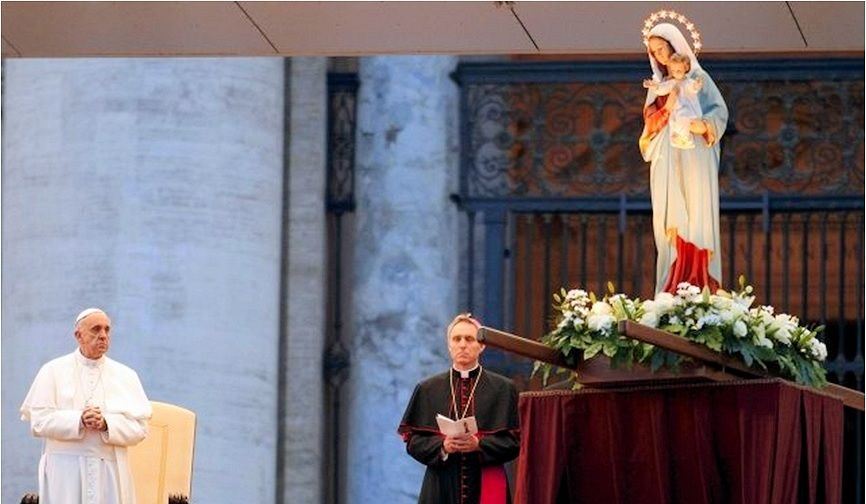 P.S. I finally found a representative photo of the event.
P.S. I finally found a representative photo of the event.
Attention, decision, action: these are three characteristics, which sign the spiritual attitude of Our Lady. This was the focus of Pope Francis’s remarks to the faithful gathered in St Peter’s Square Friday evening, to pray the Rosary at the close of the Marian month of May.
Like Mary, we must listen attentively to the Lord, who speaks to us through our lives. “Listen to everyday reality,” said Pope Francis, “[listen] to people, to the facts: for the Lord is at our door and knocks in many ways, he places signs in our path; he gives us the ability to see them.”
We must also be decisive, as was Mary when she discerned the will of the Lord and undertook the journey to visit her cousin, Elizabeth, notwithstanding her own pregnancy.
Mary also is a model of decisive action: though she does not take rash, rushed decisions, once she has decided, she moves quickly and surely. We, too, “[ought] to move quickly toward others to give them our help, our understanding and our charity,” most especially, to share that, which is the most precious gift we have: the Good News that Jesus is Lord and that He is risen.
“Give people that which we have of most value,” said Pope Francis, “Jesus and his Gospel – in word, and especially with the concrete testimony of our actions.”
The Holy Father concluded with a prayer for Mary’s intercession in behalf of the whole Christian community, that by her intercession our ears might be opened, our minds and hearts enlightened, and hands and feet made swift and strong to serve in charity.
[No RV translation yet of the Pope's full remarks, and no audience figure, for a change! No report or newsphotos of the event from the news agencies, either.]
Having already featured (in the 'almanac' post of May 31) Benedict XVI's clsoing of the Marian month last year, I did not think I would be posting a second feature about that event in his Pontificate, but I realize now I must - if only because last night was only the second time that the end=of-Maytime ceremonies at the Vatican were held in St. Peter's Square. My second lookback feature for May 31 therefore is an account of the first time it happened - on May 21, 2008. Here is the post I had in the PAPA RATZINGER FORUM at the time - which has the kind of photos I was expecting to see from yesterday... Benedict XVI, of course, always wore a ceremonial mozzetta and stole whenever there was a Liturgy of the Word, like that which follows the Rosary that ends the Marian month.

  On the Feast of the Visitation,
On the Feast of the Visitation,
Pope Benedict concludes
Marian month of May
Translated from the
Italian service of
 
May 31, 2008
Mary's simple and sublime greatness, her limpid heart, her unshadowed and spotless faith: these were the traits of the Mother of God recalled tonight by the Holy Father as he concluded the Marian month of May.
For the first time, the ceremony was held in St. Peter's Square, after decades during which it took place in the Vatican Gardens before the grotto of Our Lady of Lourdes.
The faithful prayed the Rosary led by Cardinal Angelo Comastri, Arch-Priest of St. Peter's Basilica, as a statue of the Madonna was carried in slowly procession among them.
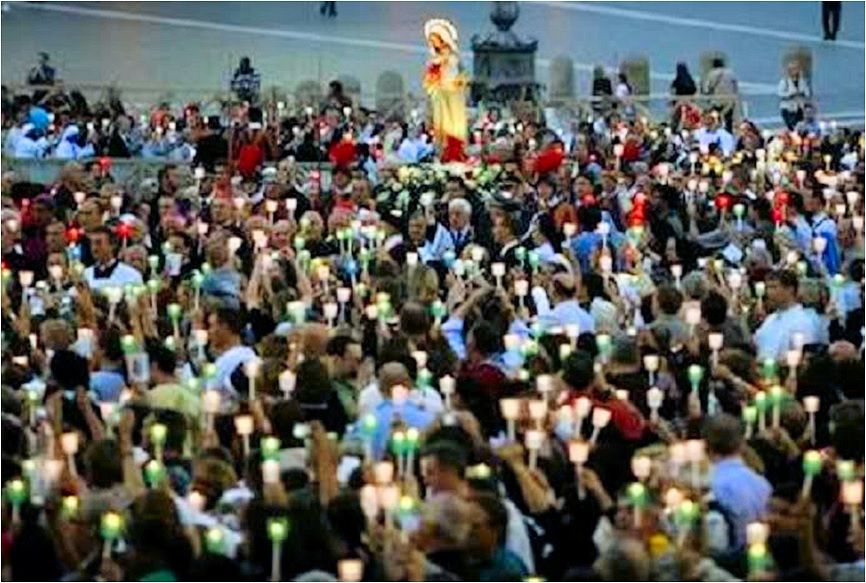
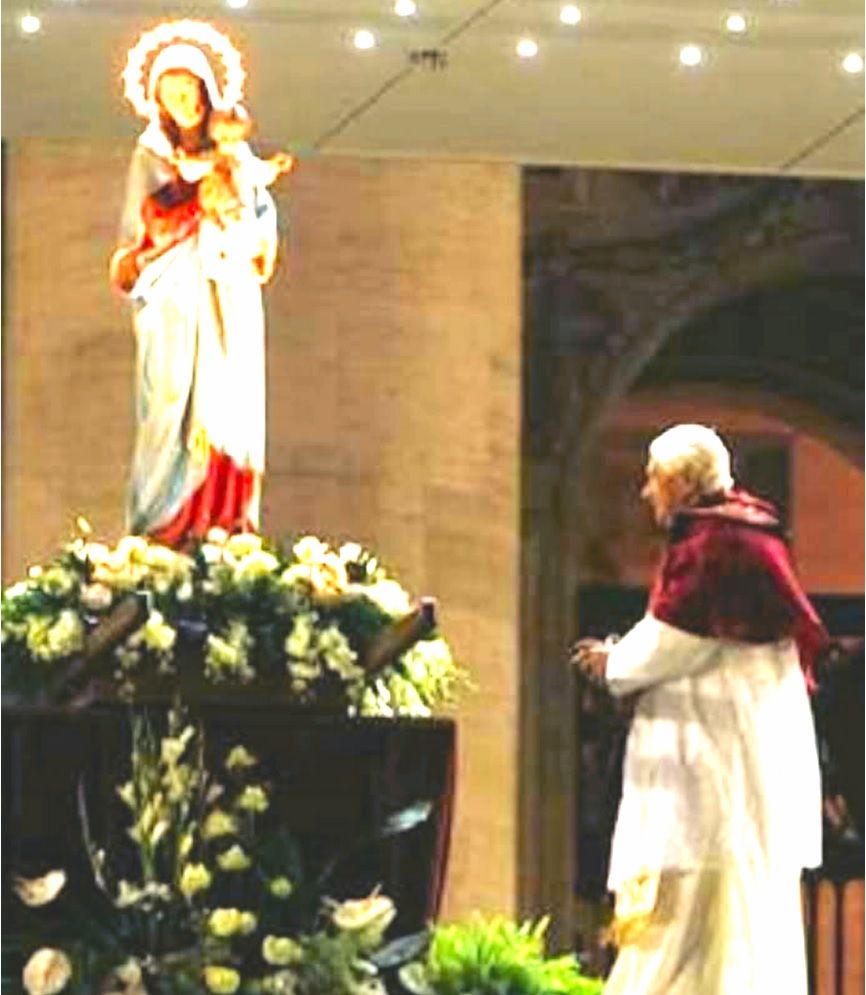
After a celebration of the Liturgy of the Word, marking the Feast of Mary's Visit to Elizabeth, Pope Benedict delivered a brief homily and imparted his apostolic blessing.
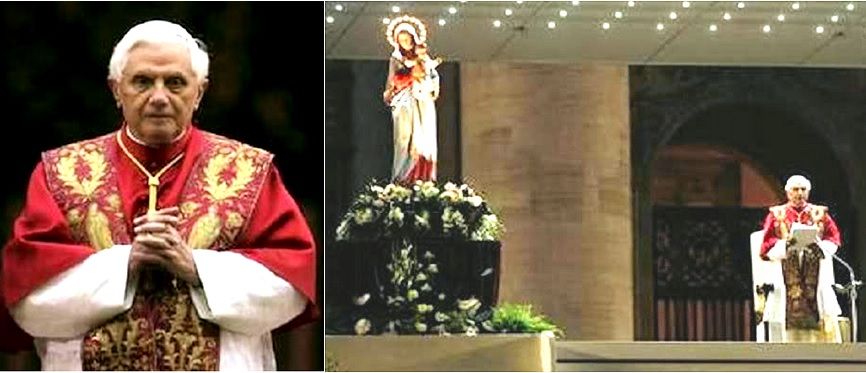
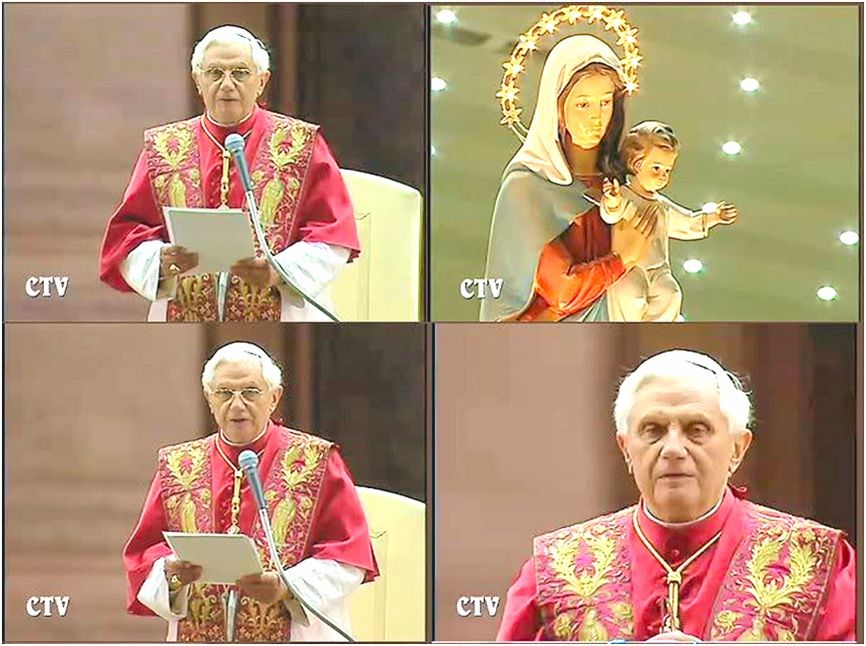
Here is a translation of ef the Pope's homily:
We conclude the month of May with this evocative Marian prayer meeting. I greet you with affection and I thank you for your participation. In the first place I greet Cardinal Angelo Comastri; with him I greet the other Cardinals, Archbishops, Bishops and priests, who have come to this evening celebration. I extend my greeting to the consecrated persons and to all of you, dear lay faithful, who, with your presence have wished to honour the Most Holy Virgin.
Today we are celebrating the Feast of the Visitation of the Blessed Virgin and the memory of the Immaculate Heart of Mary. Therefore, everything invites us to turn our trusting glance to Mary. To her, also this evening, we addressed the ancient and ever actual pious practice of the Rosary.
The Rosary, when it is not a mechanical, traditional form of repetition, is a Biblical meditation that allows us to trace the events of the Lord's life in the company of the Blessed Virgin, pondering them, like her, in our heart. In many Christian communities during the month of May there is the beautiful custom of reciting the Holy Rosary in a more solemn way in families and in parishes.
Now that the month is ending, may this good habit continue. Rather, may it continue with more commitment so that, at the school of Mary, the lamp of faith may shine ever more in the hearts and homes of Christians.
In today's Feast of the Visitation the liturgy has us listen again to Luke's Gospel passage that recounts Mary of Nazareth's journey to the home of her elderly cousin Elizabeth. Let us imagine the Virgin's state of mind after the Annunciation, when the Angel left her.
Mary found herself with a great mystery enclosed within her womb; she knew something extraordinarily unique had happened; she was aware that the last chapter of salvation history in the world had begun. But everything around her remained as before and the village of Nazareth was completely unaware of what had happened to her.
Before worrying about herself, Mary instead thought about elderly Elizabeth, who she knew was well on in her pregnancy and, moved by the mystery of love that she had just welcomed within herself, she set out "in haste" to go to offer Elizabeth her help. This is the simple and sublime greatness of Mary!
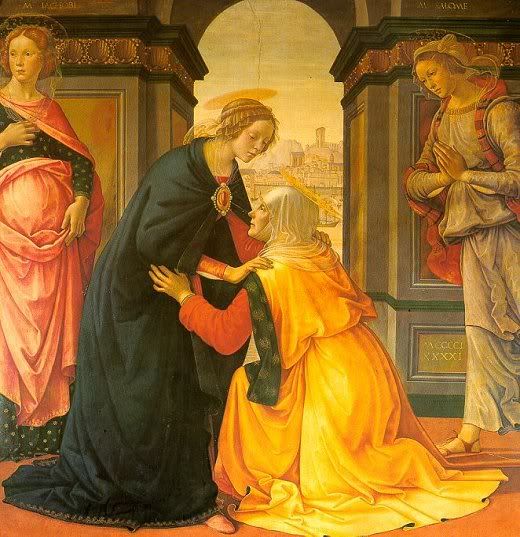 Domenico Ghirlandaio, The Visitation, 1491, Louvre Museum.
Domenico Ghirlandaio, The Visitation, 1491, Louvre Museum.
When she reaches Elizabeth's house, an event takes place that no artist could ever portray with the beauty and the intensity with which it took place. The interior light of the Holy Spirit enfolds their persons.
And Elizabeth, enlightened from on high, exclaims: "Blessed are you among women, and blessed is the fruit of your womb! And why is this granted me, that the mother of my Lord should come to me? For behold, when the voice of your greeting came to my ears, the babe in my womb leaped for joy. And blessed is she who believed that there would be a fulfilment of what was spoken to her from the Lord" (Lk 1: 42-45).
These words could appear to us out of proportion with respect to the real context. Elizabeth is one of the many elderly people in Israel and Mary is an unknown young woman from a lost village of Galilee. What can this be and what can they accomplish in a world where other people count and other powers hold sway.
Yet, once again Mary amazes us; her heart is limpid, totally open to God's light. Her soul is without sin, it is not weighed down by pride or selfishness. Elizabeth's words enkindle in her spirit a canticle of praise, which is an authentic and profound "theological" reading of history: a reading that we must continually learn from the one whose faith is without shadow and without wrinkle.
"My soul proclaims the greatness of the Lord". Mary recognizes God's greatness. This is the first indispensable sentiment of faith. It is the sentiment that gives security to human creatures and frees from fear, even in the midst of the tempest of history.
Going beyond the surface, Mary "sees" the work of God in history with the eyes of faith. This is why she is blessed, because she believed. By faith, in fact, she accepted the Word of the Lord and conceived the Incarnate Word. Her faith has shown her that the thrones of the powerful of this world are all temporary, while God's throne is the only rock that does not change or fall.
Her Magnificat, at the distance of centuries and millennia, remains the truest and most profound interpretation of history, while the interpretations of so many of this world's wise have been belied by events in the course of the centuries.
Dear brothers and sisters, let us return home with the Magnificat in our heart. Let us bring the same sentiments of praise and thanksgiving of Mary to the Lord, her faith and her hope, her docile abandonment in the hands of Divine Providence.
May we imitate her example of readiness and generosity in the service of our brethren. Indeed, only by accepting God's love and making of our existence a selfless and generous service to our neighbour, can we joyfully lift a song of praise to the Lord. May the Blessed Mother, who invites us this evening to find refuge in her Immaculate Heart, obtain this grace for us.
My Blessing to you all.
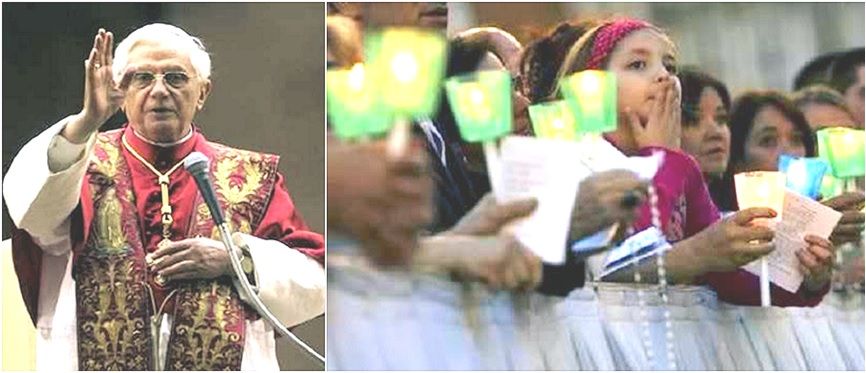 Earlier, Vatican Radio spoke to Cardinal Comastri:
Earlier, Vatican Radio spoke to Cardinal Comastri:
CARDINAL COMASTRI: In the past, the conclusion of the Marian devotions in may took place in the Vatican Gardens, and the Pope would appear towards the end and deliver words which are always like a beautiful lamp that is lit to accompany us on our path following Mary.
But every year, the problem was that many who want to participate cannot gain entry to the Gardens. That is why we thought it would be best to do it in St. Peter's Square. The Pope welcomed the idea, and both Vicariate of Rome and the Vicariate of Vatican City have worked together to promote the initiative.
To conclude the month of May, Paul VI wished to put the Feast of the Visitation of the Virgin Mary with St. Elizabeth. What are we celebrating today?
The visit to Elizabeth can be understood only if we go back to the final moments of the Annunciation. The evangelist Luke , who recounts all the details of this episode, tells us that as soon as Mary had said Yes, as soon as she told the angel, "Behold the handmaid of the Lord, be it done to me according to his Word", Mary had no idea where the path of God would lead her, but she consented fully because Mary was a believer, a woman of faith.
But right afterwards, the evangelist says, "And the Angel left" - he disappeared from her presence, and Mary found herself alone. In her house, which was still what it always was. In her village, which was still the same one. But now, she had received news that could not be shared. Who could she possibly tell that "An angel came to visit me and told me that the son which has been generated in my womb is the Son of God!"?
What could she do? She made the simplest decision, which was also the most beautiful and most courageous. She would live her experience in charity. She sensed that the presence of God had been lit within her, that it was a presence of love. So, she had to put that love to work, she would serve someone with love.
And as she went to do this, she would hear once again the voice of God - in effect, the first comment on the Incarnation - in the voice of her cousin Elizabeth who, enlightened from on high by the Holy Spirit, greeted her with the words, "And how does this happen that the mother of my Lord should come to me? For at the moment the sound of your greeting reached my ears, the infant in my womb leaped for joy. Blessed are you who believed!"
That is Mary's beatitude: Blessed are you because you believed! It is the beatitude that Mary invites us to follow; "See, I believed. Even you, become believers. Convert yourselves daily to an ever more profound faith, to an ever more sincere faith!"
And when Mary hears Elizabeth's words, then the Magnificat gushes forth from her. She had received the greatest, most sensational news in human history, but that did not arouse pride. Instead she took the humble path of service and dedication, responding to a voice from on high that illumined her new condition. So it is that Mary bursts forth in a chant of joy that is also the greatest prophecy ever made.
She says, in effect: "Elizabeth, I am happy. My soul exults in God who is the Savior, because he has looked with favor at the lowliness of his servant, and from now on, all generations will call me blessed."
Mary does commit the sin of presumption by saying this. She recognizes her lowliness, but also that God has looked with favor on it. Mary was not proclaiming her own praises but rather the greatness of God, to sing the greatness of God: "This is what God does - he bends down towards the lowly. He chose me because I am lowly, and because he chose me for that reason, then everyone will call me blessed."
She then adds that even while God looks with favor at the lowly, those who are conceited will not find his favor. So she could say with all certainty, "He has scattered the proud in their conceit, he has cast down the mighty from their thrones, and has lifted up the lowly." Even if, at that historical moment, the thrones all stood firm and solid - the throne of Augustus, the throne of Herod...
But Mary was sure and determined. It is in faith that she proclaims her Magnificat; it is her faith that gives Mary her certainty, and history has in countless instances proven her right and will continue to prove her right.
What does it mean to live the faith that was entrusted to Mary? What must be forgiven to those who do not let themselves be accompanied in life by the Mother of God?
Mary - the Gospel tells us, Elizabeth enlightened by the Holy Spirit tells us - is the believer, the first believer, the perfect believer.
When we entrust ourselves to Mary, we find ourselves in the arms of Jesus. Mary educates us in faith, Mary leads us to the Lord because Mary's testament are the words she said before the miracle at Cana: "Do as he tells you to do."
Every time we draw near to Mary, we feel ourselves more Christian, more like disciples of the Lord - because Mary is never far from God. Mary brings us to Jesus, she brings us to God. So whoever rejects Mary rejects the greatest assistance one can have towards encountering God.
At the time, I referred to a post I had made in THE SAINTS thread of the PRF, to share a beautiful homily by then Cardinal Ratzinger, which he gave when the accompanied European notaries on a pilgrimage to Mariazell in 2004. It is always a profound pleasure to re-read.
It was one of many treasures buried in the official site for the Papal visit to Austria in September 2007 that I did not get around to translating (it was delivered in German, of course) for that visit, but which I am now posting because the homily was based on the Gospel passage about the Visitation. It is sublime, truly 'wonder-full', sounds and reads extemporaneous despite its great poetry, and is always a pleasure to re-read...
Homily of Cardinal Joseph Ratzinger
Pilgrimage of Central European Notaries
Basilica of Mariazell, October 2, 2004
Dear brothers in the episcopal and priestly service,
Honorable notaries from all the states of Europe,
Dear brothers and sisters in the Lord:
MarY hurries across the Judean hills in order to announce to Elizabeth the joy that she has received. She is impelled to visit her with whom she can rejoice over the secret of the coming of God to this world. She must share the joy that is hers. Love must be shared, and joy must be shared.
The Church Fathers saw in Mary’s journey to Elizabeth an image of the Church which, like Mary, carries Jesus in its bosom, across the mountains of the world, through its heights and depths, with the mission to share the joy of God throughout the world.
Yes, God is here, he has a face, he has a name, he is one of us, he is God with us, he is the Almighty of goodness and healing. The Church preaches the Gospel not to win power nor to be able to say that a great number of persons belong to it. It preaches the Gospel because it must pass on the joy which it cannot keep to itself alone, because the love which has been given to us demands to be shared.
Christianity, in its deepest essence, is joy. We have translated the first word with which the New Testament begins – the angel’s greeting to Mary – as “Hail, Mary”, but the Greek words are “Rejoice, Mary”. That is the opening and the real beginning of Christian history, that God came to this world in joy.
But when we hear this, we may think there is a contradiction. That to us, Christianity seems effortful, stale, full of misery and difficulties. It seems to constrict life instead of opening it up. But if we come nearer to its real core, when we listen and allow ourselves to be moved by its innermost reality, it is also supreme joy: joy in the knowledge that chance did not bring us into an existence without sense; joy in the knowledge that we were willed by Love which does not cease and which will never abandon us, on which we can always rely; joy that there is a God who knows us and who is not a cruel judge, but a God of justice, a justice that is good and which desires our healing.
Therefore the first appeal this day makes to us is to rediscover joy, and faith as joy, and to be moved anew by this innermost essence of the faith, and from all this, to be able to bear all burdens and help us to change.
Let us look at the meeting between the two women as also the first meeting between their two children. John leapt in the womb of his mother Elizabeth. In the entire fabric of his narration of Christ’s infancy and childhood, Luke suggests David’s dance before the Ark of the Covenant.
Now here it was, the true Ark of the Covenant, signifying not only that the remote God knows us and speaks to us, but that the living dwelling of God is in our midst.
God does not live in stones, he dwells in living men, and dwells incarnate among us. He loves men so much that he himself became man. There is the Ark of the Covenant, the holy Tabernacle, in which he dwells.
That sacred power of joy, which made the child in his mother’s womb leap, alo sets the rhythm of joy for us, which expresses itself in liturgy, in its holy symbols, in singing and praying, somewhat like a new dance before the Ark of the Covenant, before God, who is truly present and who invites us to be, ourselves, an Ark of the Covenant.
When God gives His body to us in the Eucharist, he wants us to be God’s dwelling ourselves, from which his joy can radiate to the world.
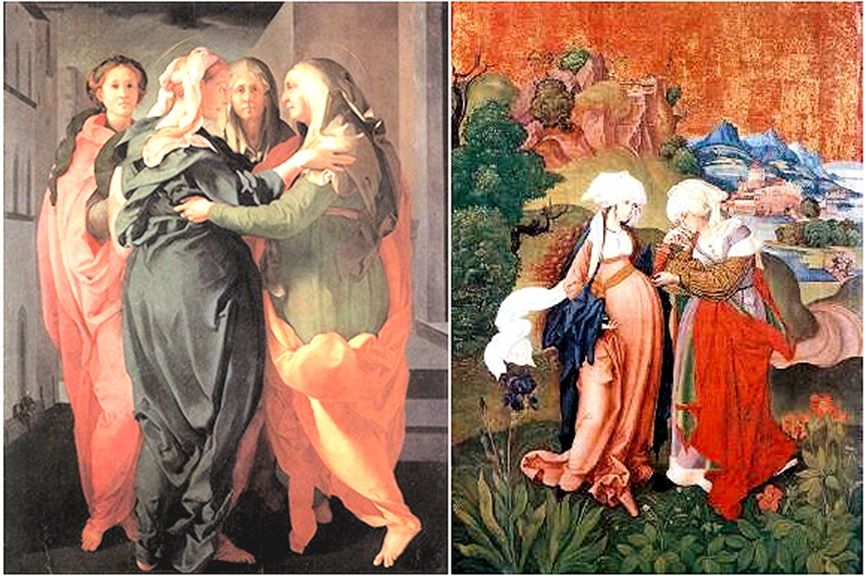
Left, The Visitation, Iacopo Ponotormo, 1528; right, by an artist whose name, provenance and historical period I have been unable to determine.
Let us listen to the words of the two women. Elizabeth completes the greeting of the angel: “Hail, Mary, full of grace, the Lord is with you” - words that the Holy Spirit has spoken through her, as Luke tells us: “Blessed are you among all women, blessed is the fruit of your womb.”
Thus the first and central great Marian prayer of the Church was not an invention of men, but a gift from the angel, who brought greetings from the Father, a gift from the Holy Spirit, who spoke through this woman, Elizabeth.
When we pray it, we say the words that God himself lays on our lips, and we fulfill the promise that Mary announces in her Magnificat: “From here on, all generations will call me blessed.”
Marian veneration is not a belated invention of the Church nor a coming off the unique center of our faith, Jesus Christ. It was offered to us by the Holy Spirit himself. Because God wishes that we should recognize his glory not just in his own pure light. But also in other men who reflect his glory and makes it accessible to us.
In the saints, and above all, in Mary, the Mother of the Lord, we recognize what God himself is, we see the reflection of his glory in a human face, coming to us from a human life.
Equally important is what Elizabeth further tells Mary: “Blessed is she who believed.” She reaches back to the beginnings of the Old Covenant, to Abraham, the Father of the faith, whom God trusted and who dared the impossible, leaving his homeland for an unknown land because God had bidden him to do so, in order to begin a new history for man.
This torch of faith that was first lit in Abraham was then carried forward by the Patriarchs and the Prophets, the holy men and women of the Old Covenant, and now burns to its full glory in Mary.
She believes and thereby, she tears the heavens apart, she opens the doors of Heaven, and we see that God is there and accepts us and cares about us. Mary believes and dares to accept the enormity of God’s irruption into her life by making her the Mother of his son. She believed something that must disrupt any person’s life beyond one’s own hopes and expectations. But she entrusts herself to God, and doing so, she opens the doors between heaven and earth.
“Blessed is she who believed.” Elizabeth is also calling on us: Believe in God, put aside your pride and your doubt, dare to trust in him and to go with him. But go with him truly, so that you may experience that what he says is true, that he really is there. We cannot subject God to experiment. What kind of God is it that we could research in a laboratory?
No, he only wants the courage of faith and communion, and in communion, he sheds His light on us, so that we will know that Yes, he is here, he who shows us the way. He calls us to faith, in a time when the crumbling of faith is not making the world brighter but darker, when the darker forces of man are breaking through again, times during which faith has been shackled, when the Light of God no longer shines.
Let us pray: “Lord, I believe. Help me in my lack of faith.” And let us keep before our eyes what President Weissmann [President of Austria at the time] has already told us: We do not need to believe alone, we do not need to force ourselves alone into a higher plane that seems unreachable.
Faith always means to believe with the whole living Church. Faith means believing with the entire company of saints, those who - in fields where so many weeds grow - were a reflection of God’s light.
Faith is being part of the ‘we’ in the Church of believers. Mary calls us again on this day to dare this shared belief so that like her, we can believe with Abraham and Israel, and find God’s Word open to us anew.
Let us ask the Lord that we may find the courage to believe with the Church and therefore open anew the doors between heaven and earth.
To Elizabeth’s greeting, Mary replied: “My soul extols the greatness of the Lord.” Literally it means, “My soul sees God as great.” And that is what Mary does on this day: She steps back so that the world
can see him in all his greatness.
When we extol God, we do not need to fear that doing so will make us smaller. Only when we extol God will we ourselves be great. But when we write God in small letters, when we belittle God, then we belittle ourselves. Then he becomes nothing more than an incidental product that evolution has cast ashore, about whom one no longer knows whether it matters whether he is there or not.
And we would be no more than an eyeblink in the endless light years of the universe, that comes and goes as an ancient Roman pagan grave inscription says, “From nothing, itself nothing, and towards nothing.” And that becomes our ultimate definition.
We do not become great when we belittle God. Only when God is writ large in our life and when we give him room in this world, do we become great. Then we are creatures of God’s love, then we are the reflection of his face in the world, willed by eternal love and destined for his eternal love.
Under Communist rule, a book of Solzhenitsyn’s could not be printed because he insisted adamantly that the word God must be written with a capital G, which was not allowed – under this ideological power, God must be written in small letters only. Just as human dignity itself came to be writ ever smaller.
We know that such a world, which Solzhenitsyn describes in another book, became the first circle of Hell. Because Hell is wherever God is forbidden, into which his light is no longer allowed to shine. To extol God that links together the words of the two women. It means nothing other than faith.
In the Magnificat, which Mary creates out of the Old Testament, taking from its treasury of prayers and bringing it into the realm of the Church, she also tells us what works against faith. She names three elements: pride in one’s heart, the mighty who would push God off his throne, and the rich who set store only by possessions.
First, pride, which was also Adam’s real sin. Pride means wanting to be God himself and not to acknowledge anyone else, to be completely autonomous and declare oneself emancipated from God, to consider eternal love not as a gift, as the basis for our existence, but rather as subordination. But that is exactly how man falls.
Opposed to pride is humility, which accepts love, which acknowledges that we need it, which believes that it is a gift from God to those who trust in him, and in this, we can find that the true greatness of man.
Beside pride, there is the worship of power, in which whoever can destroy or threaten to destroy is considered mighty. Real power is not the power to destroy but the power to build. Sacred Scripture tells us that God’s omnipotence essentially lies in his power to forgive and to be merciful.
Trusting in that power, we set forth into the world with a faith that is often trampled on, but which has shone through in the stories of martyrs and many suffering men. The other kind of power, that which would destroy the earth, is a caricature.
Finally, Mary speaks of wealth as the worship of property. It is not that men should not increase the gifts of creation and may not serve the whole through having possessions. But when man worships possessions, he becomes a slave to them. He will be possessed by his possessions and is no longer the lord of creation as the image of the true Lord.
Therefore, it is worth liberating ourselves from that which seems to be the promise of life but which really takes away the greatness that builds us up. Let us entreat Mary that she may help us to extol God and that she may thereby lead us to true greatness.
“Sub tuum presidium’ – “Under your protection and shield we shall escape”: the choir will sing this during the preparation for the Offertory. We thank Maestro Planyavsky, who composed the work that is his gift to us today and to the Church, and the musicians who will help us with this music to praise Mary and thus let the light of God into the world.
“Under your protection and shield, we shall escape”: This is the oldest post-Biblical Marian prayer in Christianity. It was found in an ancient Egyptian papyrus from the fourth century. We can imagine that it came from an Egyptian monastic circle and tells of all the troubles that these men were subjected to: oppressed by political power, as well as threatened by the forces of nature and of society - finding refuge in the Mother, as the truly protective and reliable power.
“Under your protection ad shield, we shall escape” – Here in Mariazell, where for almost 900 years, Mary has been prayed to, where men come to ask for her protection and defense, and strength for their lives, we feel the prayers of the centuries present and take our place in the great procession of those who pray.
We entreat her that she may help us to believe; from our faith, become hopeful; and from faith and hope, become loving. We entreat her that she may help you as notaries, and all of us, to be in the service of true justice, of that justice which yields peace.
Here she has spread her cloak over the numerous peoples represented here today, sheltered under her cloak together, one with each other across all borders.
We entreat her to help us build Europe at this time, a Europe where, as President Weissmann said, one does not confuse the tree with its root, in which we will learn to live again from the roots of our faith.
We entreat the Mother of God that she may help Europe to find its soul again, the great ethical and human strength that comes from faith and that has made this continent great.
We entreat to her to guide us through the distresses of life. We entreat her for peace and unity, and that terror may be overcome through the greater power of good.
We entreat her: Show us Jesus, the blessed fruit of your womb. Amen.

[Modificato da TERESA BENEDETTA 02/06/2013 16:43] |
| |
 01/06/2013 15:40 01/06/2013 15:40 |
|
| | | OFFLINE | | Post: 26.776
Post: 9.261 | Registrato il: 28/08/2005
Registrato il: 20/01/2009 | Administratore | Utente Master | |
|

 Saturday, June 1, 2013, Eighth Week in Ordinary Time
Saturday, June 1, 2013, Eighth Week in Ordinary Time
MEMORIAL OF ST. JUSTIN
 ST. JUSTIN (born ca 100, Roman Palestine, d Rome 130), Philosopher and Martyr
ST. JUSTIN (born ca 100, Roman Palestine, d Rome 130), Philosopher and Martyr
Benedict XVI devoted a catechesis to St. Justin on March 21, 2007
www.vatican.va/holy_father/benedict_xvi/audiences/2007/documents/hf_ben-xvi_aud_20070321...
the third, after Pope St. Clement and St. Ignatius of Antioch, in his presentation of the Fathers of the Church. he called him the most important of the second-century 'apologists' for the Church, defenders of the faith. Born in what is now the West Bank city of Nablus, which was then part of Samaria, he was a scholar of Greek philosophy, especially Plato. Around 130, he was in Ephesus when he converted to Christianity, convinced that man cannot answer all the important questions by himself. He went on to Rome where he set up a free school to initiate others into the new religion, which he considered the true philosophy. He wrote industriously in defense of the faith, but only two have come down to us - one addressed to the emperor, the other to the Roman Senate. For refusing to sacrifice to the pagan gods as ordered by the Prefect of Rome, he and six companions were scourged and beheaded. An account of the martyrdom quotes Justin as saying, "Do as you wish, for we are Christians and we do not sacrifice to idols".
Readings for today's Mass:
www.usccb.org/bible/readings/060113.cfm
AT THE VATICAN TODAY
Pope Francis met today with
- H.E. José Mujica Cordano, President of Uruguay, and his delegation
- Cardinal Marc Ouellet, Prefect of the Congregation for Bishops (weekly meeting)
 One year ago today...
One year ago today...
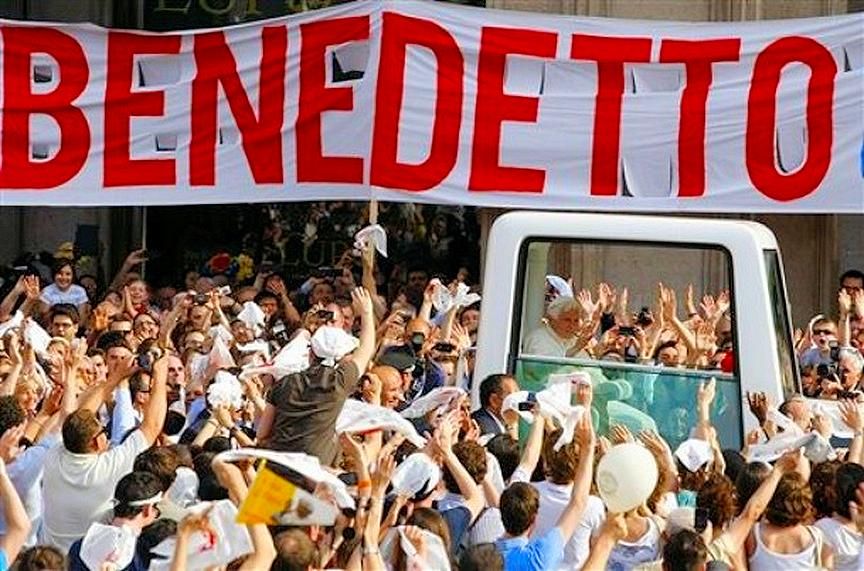
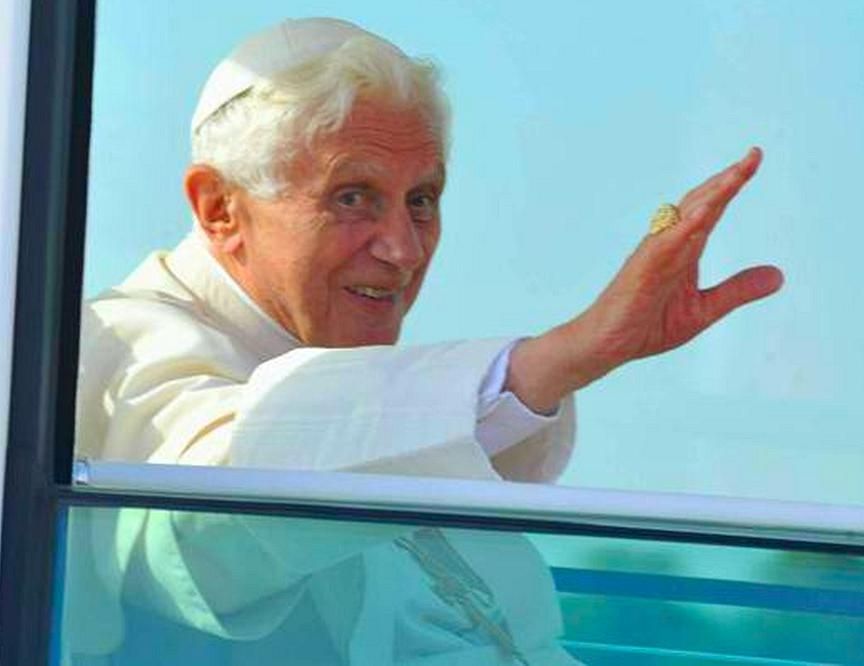
Benedict XVI arrived in Milan for a three-day pastoral visit during which he would also close the 7th World Encounter of Families. His first day in Milan was event-filled. After his arrival, he addressed the diocese from the steps of Milan's famous Duomo (Cathedral), and capped the day with attending a performance of Beethoven's Ninth Symphony conducted by Daniel Barenboim at La Scala. All the events of that day can be reviewed on Page 317 of this thread.
http://benedettoxviforum.freeforumzone.leonardo.it/discussione.aspx?idd=8527207&p=317


|
| |
 02/06/2013 19:27 02/06/2013 19:27 |
|
| | | OFFLINE | | Post: 26.777
Post: 9.262 | Registrato il: 28/08/2005
Registrato il: 20/01/2009 | Administratore | Utente Master | |
|

 June 2, 2013, Ninth Sunday in Ordinary Time
June 2, 2013, Ninth Sunday in Ordinary Time
SOLEMNITY OF THE MOST HOLY BODY AND BLOOD OF CHRIST (CORPUS DOMINI)
in most of the Catholic world, even if it falls properly on the Thursday before this Sunday.
Today's saints:
 SAINTS MARCELLINUS and PETRUS OF ROME (d Rome 304), Martyrs
SAINTS MARCELLINUS and PETRUS OF ROME (d Rome 304), Martyrs
These two early martyrs are mentioned in the Eucharistic Canon of the Mass. Marcellinus was a priest and Peter was an exorcist. They were beheaded together during the persecutions under Emperor Diocletian. They were killed in an out-of-the-way spot to keep Christians from finding their bodies, but two women were guided by a vision to the spot, and the Christians of Rome buried them in what has since been called the Catacombs of Marcellinus and Peter. Pope St. Damasus wrote their epitaph. An ancient ceiling fresco in the catacombs shows Christ with Saints Peter and Paul, and below them four martyrs - Gorgonius, Marcellinus, Peter and Tiburtius (photo second from right above).
Readings for today's Mass:
www.usccb.org/bible/readings/060213.cfm
AT THE VATICAN TODAY
Pope Francis's daily Mass at Casa Santa Marta was said for a group of some 80 persons led by the Military Ordinary (Bishop) for Italy
who was with parents and relatives of Italians killed in the war in Afghanistan in the past 5 years and a dozen of the injured.
At the Angelus, he reflected on the miracle of loaves and fish as he did earlier in the week in his daily homilettes, saying that
the miracle was not so much that everyone was fed - because Jesus trusted that the Father would make it possible with the five
loaves and two fish available, but the fact that the food was shared in community. After the prayers, he expressed his concern for
the continuing civil war in Syria.
In the afternoon, he was to lead a simultaneous worldwide Eucharistic Adoration from 5-6 p.m. Rome time, at St. Peter's Basilica,
one of the universal events pre-programmed for the Year of Faith.
THIRTY-SIX YEARS AGO TODAY...

 Just five days after Joseph Ratzinger was ordained a bishop
Just five days after Joseph Ratzinger was ordained a bishop as Archbishop of Munich-Freising, Pope Paul VI
named him one of five new cardinals that he would elevate formally on June 22, 1977, in what was to be the last
consistory of his Pontificate.
 One year ago today...
One year ago today...
Benedict XVI had another event-filled day on Day 2 of his pastoral visit to Milan, as the program shows:
[ DAY 2 OF THE PASTORAL VISIT TO MILAN
Saturday, June 2, 2012

08.00 Private Mass at the Archbishop's Residence.
09.50 The Holy Father leaves the Archbishop's Residence for the Duomo (Cathedral)
10.00 CELEBRATION OF LAUDS
Duomo of Milan
with the priests and religious of the Archdiocese
- Meditation by the Holy Father
- Veneration of the relics of St. Charles Borromeo in the cathedral crypt
The Holy Father proceeds by car to
the Stadio di San Siro (Milan's football stadium)
11.00 MEETING WITH YOUNG PERSONS PREPARING FOR CONFIRMATION
Stadio di San Siro
- Address by the Holy Father
The Pope then returns to the Archbishop's Residence.
17.00 MEETING WITH CIVILIAN AUTHORITIES
Archbishop's Residence
- Address by the Holy Father
20.00 Proceed by car to Milano Parco Nord-Bresso Airport
20.30 MEETING WITH FAMILIES
FEAST OF TESTIMONIALS
Milano Parco Nord-Bresso
- Address by the Holy Father.
21.30 The Pope leaves Milano Parco Nord by car to return to the Archbishop's Residence.
2013 P.S. From an event-filled day, I had already posted previously on LOOKBACK the Pope's meeting with the young confirmands at St. Siro stadium on the day Pope Francis administered confirmation as part of the pre-programmed Year of Faith celebrations. Although both his addresses to the priests and religious at Lauds and his address to the political and cultural leaders of Milan were both beautiful and significant, I have chosen to highlight for today's LOOKBACK Benedict XVI's encounter with the participants of the 7th World Meeting of Families, which was climaxed by a Q&A session with the Pope:
Day 2
MEETING WITH FAMILIES
Feast of testimonials
Translated from the Italian service of

June 2, 2012
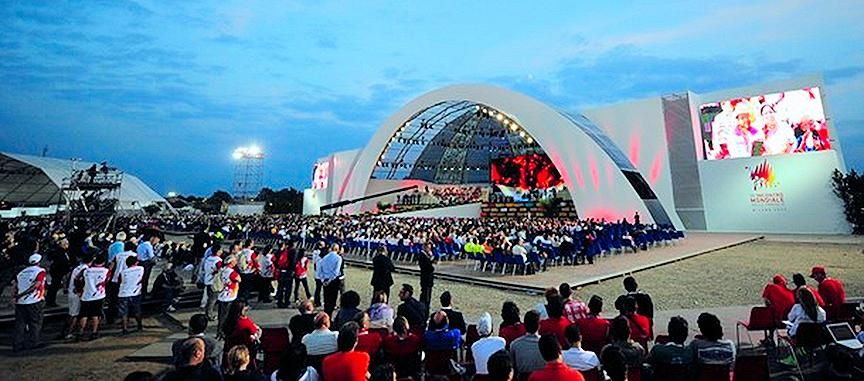
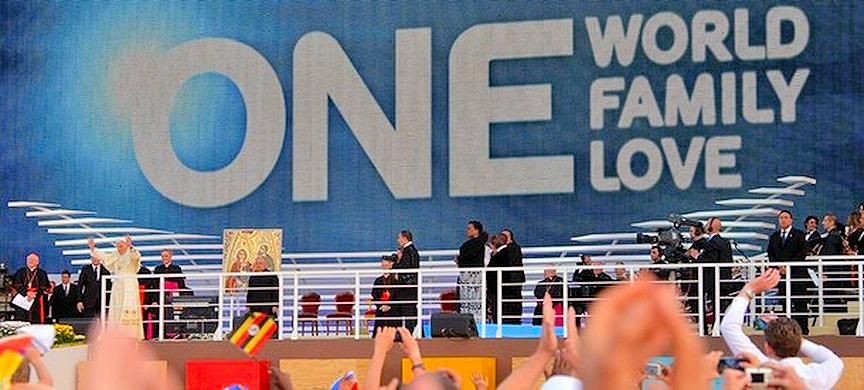
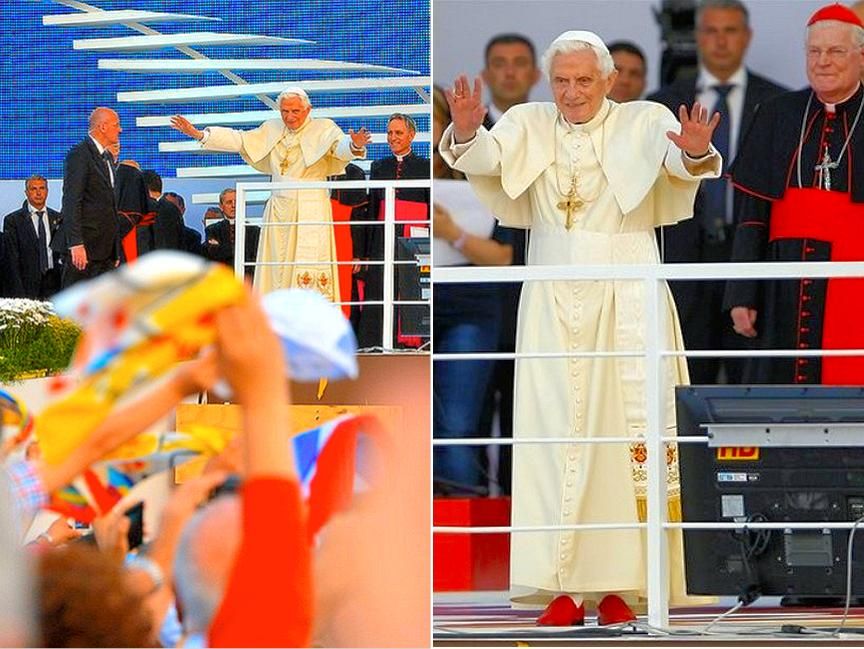
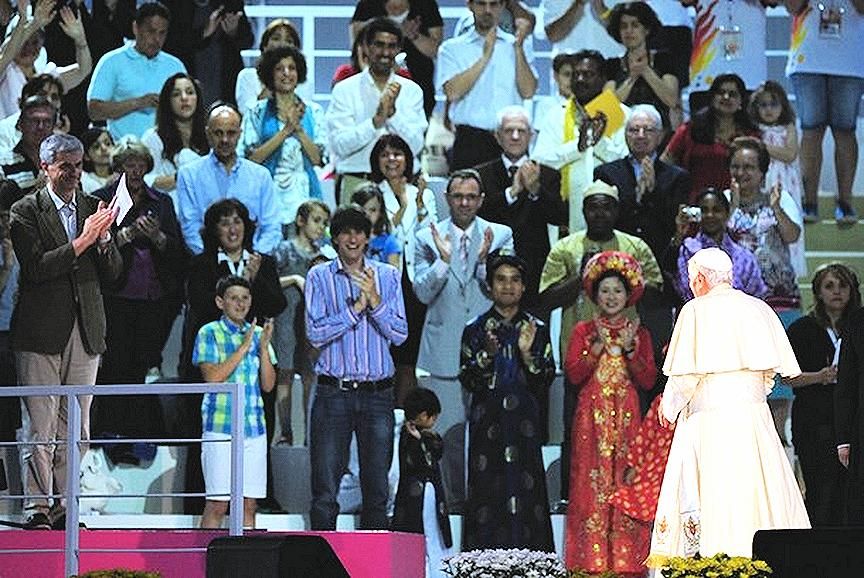
With 350,000 in attendance, the VII World Meeting of Families in Milan had its much-awaited Feast of Testimonials tonight in the presence of Benedict XVI.
After an hour of experiences lived in the light of the Gospel, recounted by families representing the inhabited continents and Oceania, the Pope responded to five questions posed to him on the most typically acute problems facing families today, ranging from the unprecedented national crisis in Greece to the recent earthquakes that struck the central Italian region of Emilia-Romagna. Alessandro De Carolis has this report:
On a former airport that has become a park and Milan's largest fairground, it became this week the epicenter for Catholic families upholding Christian values, a topic that is hardly ever discussed in public, but tonight was 'on show' for world television: the faith of those who build their lives by starting with making room for God.
From the huge stage designed to recall the vault of heaven but open to the skies, it all took place, thanks to precise and expert direction, interspersed with musical numbers by renowned Italian and European pop artists, amid which Benedict XVI sat like a master sage.
Like a fond grandfather with a beloved grandchild, the Holy Father answered the first question from a Vietnamese girl, Cat Tien, by ecalling scenes of domestic tranquillity from his own childhood, and then saying: "To tell the truth, if I try to imagine what it could be like in Paradise, I think back to the days of my youth, of my infancy. In an atmosphere of trust, of joy and of love, we were happy. And so I think that in Paradise there should be something of what my childhood was like. In this sense, I look forward to 'going home' on the other side of our world."
Next, a young engaged couple from Madagascar, confided that they appreciated the virtues of Christian marriage but were apprehensive about the 'for always' part of it.
The Pope said that the way to overcome it was simply to build on a love that is not just sentiment. Which he would also remind a Greek couple whose life has become dependent on the outcome of their country's current crisis. But in this respect, he also said that political leaders should learn to assume responsibility:
"I think that a sense of responsibility should grow in all political parties, not to promise things which they cannot realize; not just to seek votes for themselves, but to be responsible for the good of everyone, that they may understand that politics is always a moral responsibility before God and before men".
A couple from the United States spoke about a typical complaint in the West - the difficulty of observing Sunday rest because of work demands.
"I would call on employers to think of the family, how to make it possible for parents to reconcile both priorities. Then there's Sunday, a holiday. I do not know if in the USA, Sunday is still observed as such. But I think it is very important that Sunday, the Lord's day - and because of this, also 'a day for man' - must be defended as a freedom for man. Let us defend Sunday and other religious holidays as days for God, and therefore for men".
The last question was about divorced Catholics who subsequently remarry without having annulled their previous marriage. The Pope called this "one of the great sufferings for the Church today". He said the Church does not stop loving those in such irregular situations, and said parishes should always be the first refuge for those who are burdened by the problem. [Unfortunately, the report does not say anything more about the Pope's answer!]
The Pope did not forget the victims of recent earthquakes in the Emilia-Romagna region, greeting onstage a family from Cento who lost their home. He directly addressed the residents of the tent cities that now house the homeless, for whom a live TV feed of the Milan event had been arranged:
"Dear friends, you know that we feel your pain profoundly, your suffering, and that above all, I pray everyday that the earthquakes may come to an end. Be assured that we do not forget you and that we are doing everything possible to help you. I wish you well, and may the Lord bless you all".
At 9:30 p.m., after leading the assembly in praying the Our Father, surrounded by representative families, the Pope left Parco Bresso to return to the city. He will be back tomorrow morning to celebrate the concluding Mass of the VII World Meeting of Families.
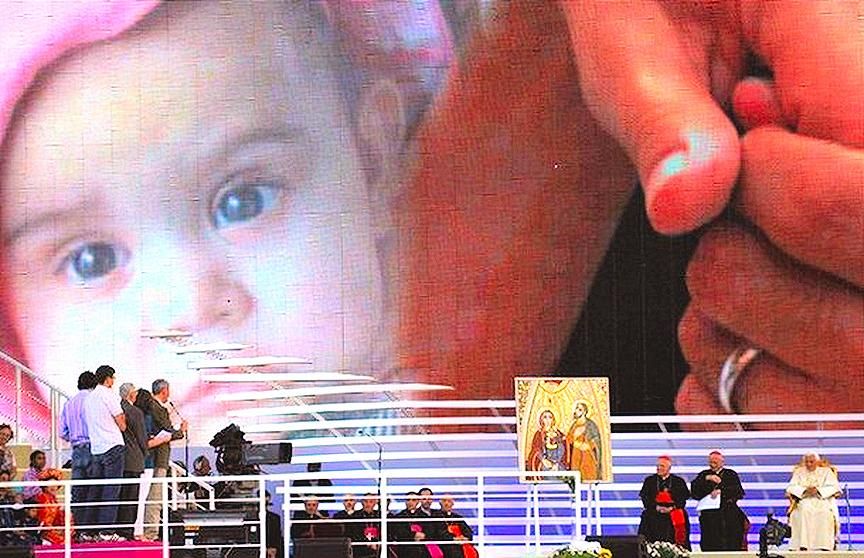
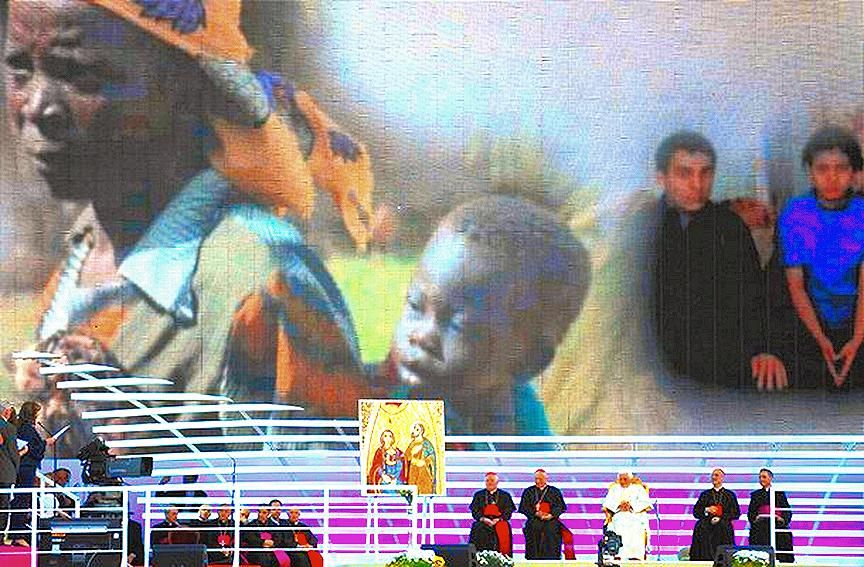
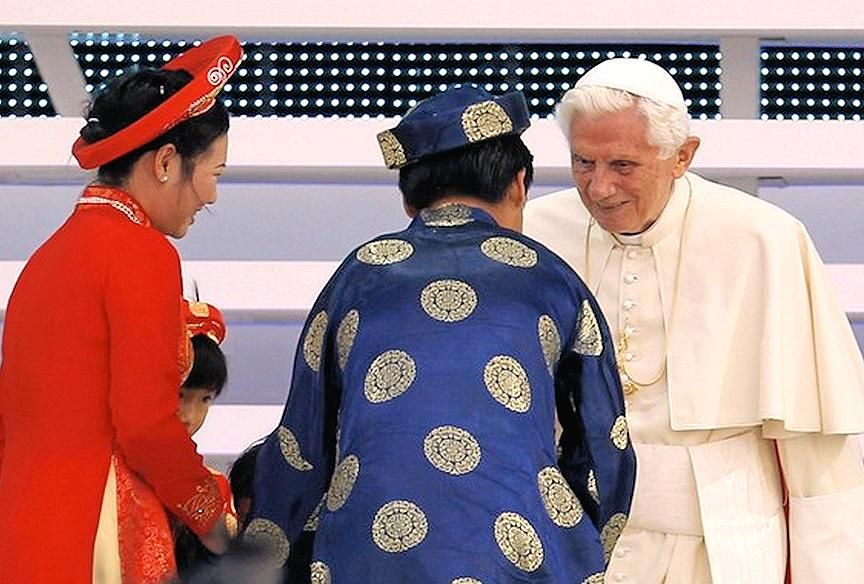
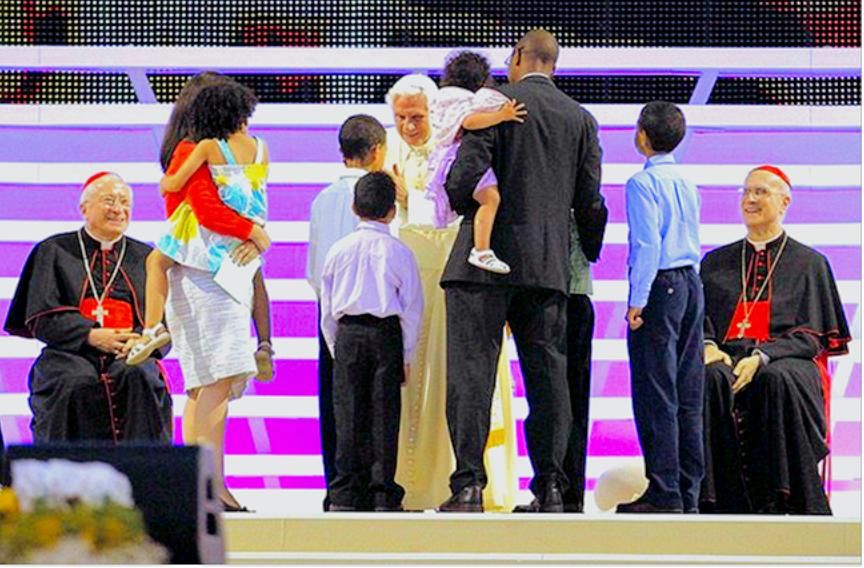
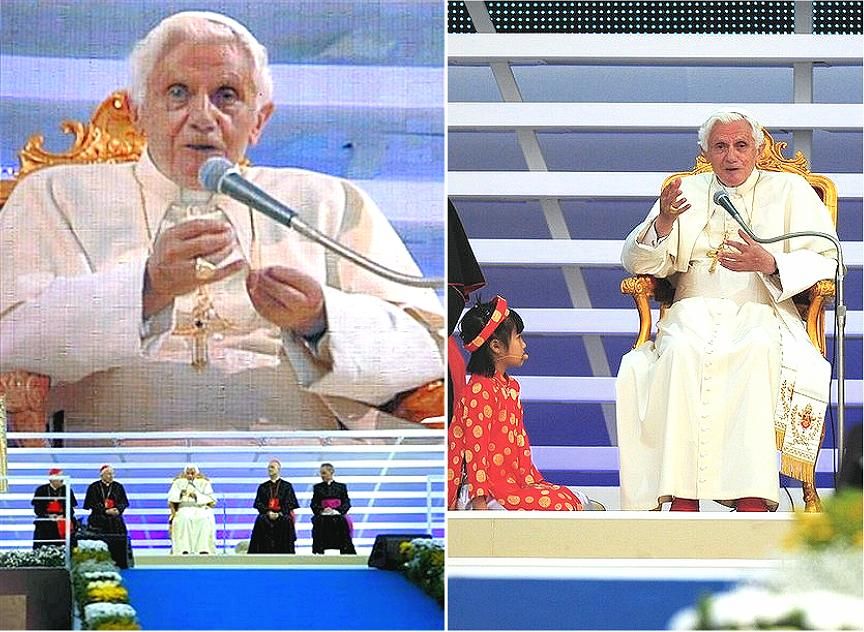 THE POPE'S DIALOG
THE POPE'S DIALOG
with representatives of families
from around the world
Translated from

June 2, 2012
This evening, the Feast of Testimonials of the VII World Meeting of Families took place at Milan's Parco-Nord at the former airport of Bresso.
The Holy Father Benedict XVI arrived at Bresso at 8:30 pm. Cardinal Ennio Antonelli, president of the Pontifical Council for the Family, opened the event with some words of greeting.
In the course of the program, the Pope listened to representatives of families and couples from different regions of the world and answered some questions. Here is a translation of the Q&A transcript:
1. CAT TIEN (a girl from Vietnam):
Ciao, Papa. I am Cat Tien from Vietnam. I am seven years old, and I would like to present my family to you. This is my father Dan, and my mother Tao, and my little brother Binh. I would like so much to know something about your family and when you were a child like me...
THE HOLY FATHER: Thank you, carissima, and to your parents, thank you from the heart. Now, you want to know what I remember about my family and my childhood - that would be quite a lot. I would just want to say a few things.
The essential reference point for our family was always Sunday, but it began for us on Saturday afternoon. That was when Father told us about the readings for the next day, from a book that was in wide use in Germany at the time, which explained the Bible texts. Thus we began our Sunday by getting into the liturgy, in an atmosphere of joy.
Then the next day we went to Mass. We lived in places that were near Salzburg, so we always had a lot of music - Mozart, Schubert, Haydn - and whenever the Kyrie begun, it was like heaven had opened.
Later, the big meal together at home was of course important. And we sang a lot. My brother is a great musician, and even as a boy, he composed things for all of us that the whole family could sing. Our father played the zither and he sang. These were unforgettable times.
We also made little trips together, and took walks. We lived near woods, and so walking through the woods was always beautiful- with adventures, games, etc. In short, we were one heart and one soul as a family, with so many experiences in common, even in very difficult times - because there was the war, and before that, the dictatorship, and afterwards, poverty.
But there was mutual love among us, a joy even in simple things that was so strong that we could overcome and endure the difficulties. I think this was very important: that even small things could give joy - it is the way we expressed our heart to each other.
So we grew up in the certainty that it is good to be alive, to be a human being, because we could see the goodness of God reflected in our parents and our siblings. To tell you the truth, if I try to imagine what it would be like in Paradise, it always seems to me something like my childhood, my infancy. In which we were happy in an atmosphere of trust, of joy, of love. I think that Paradise would be something similar to my childhood. So, in this sense, I expect to be 'going home' as I am bound for the other side beyond our world.
2. SERGE RAZAFINBONY and FARA ANDRIANOMBONANA (Engaged couple from Madagascar)
SERGE: Holiness, we are Fara and Serge, from Madagascar. We got to know each other in Florence where we are students - engineering for me, economics for her. We have been engaged for four years and as soon as we graduate, we plan to return to our country and give a hand to our people through our professions.
FARA: The family models dominant in the West do not convince us, but we are also aware that many traditions in Africa are being lost or overturned. We feel that we are made for each other, and that is why we want to get married and build a family together. We also want every aspect of our life to be oriented by the values of the Gospel. But speaking of matrimony, Holiness, there is a term about it that attracts us more than anything else, but it also frightens us - and that is, 'for always'...
Dear friends, thank you for your witness. My prayers go with you during your engagement and I hope that you will be able to create, with the values of the Gospel, a family 'for always'.
You have indicated various forms of metrimony: we know about the 'mariage coutumier' (customary marriage) in Africa, and Western marriage. But in Europe, in fact, until the 19th century, there was a different kind of marriage that prevailed: often, matrimony was really a contract between clans, where it was sought to preserve the clans, to open them up to a better future, to defend clan property, etc.
And so it was the clans that sought to find who should marry whom among them, hoping that they would turn out to be suitable for each other. That was the case in part of my country. I remember that in the little village where I was a schoolboy, it was still largely like that.
But since the 19th century, too, there emerged the idea of emancipation of the individual, the freedom of each person, and therefore, marriage no longer had to be based on the will of others, but on one's own personal choice. First, falling in love, then engagement, and finally, marriage.
From that time, the whole world was convinced that this was the only correct model and that love in itself would guarantee the 'for always', because love is absolute, and would therefore last for all time, for always.
Unfortunately, reality is not always so. Falling in love is beautiful, but perhaps it is not something that can last in perpetuity, a because that's the way sentiments are - they do not last. Therefore, the passage from falling in love, to engagement, and finally to marriage demands a series of decisions, which are interior experiences.
As I said, the sentiment of love is beautiful, but it must be purified, it must go through a process of discernment - which means reason and will should get into it. One must unite reason, will and sentiment.
The rite of the Church does not say, "Are you in love?", but it asks, "Do you want this (marriage)?" "Are you decided on this?" Therefore, being in love must become true love which involves reason and should go hand in hand with sentiment and will. This is what happens during engagement, a purification that gives greater depth, so that the whole person, with all his abilities, with the discernment of reason adn the strength of his will, can say, "Yes, this is the life I want".
I often think of the marriage at Cana. The first wine is great - that's falling in love. But it doesn't last to the end of the feast. There must be a second wine, one that has fermented and matured. A definitive love which truly becomes this 'second wine' is more beautiful, much better than the first wine. This is what we should seek.
It is also important that the I is not isolated - the I and the you - both should be involved also in the life of the parish, of the Church, of friends. This - all of the right personal relationships, the communion of life with others, with families that can support each other - is very important, because only in this common involvement with the community, with friends, with the Church, in the faith, in God himself, will you have the wine that is 'for always'. My best wishes to both of you!
3. THE PALEOLOGOS FAMILY (form Greece)
NIKOS: Kalispera![Good evening.] We are the Paleologos family from Athens. I am Nikos, and this is my wife Pania, and our two children, Pavlos and Lydia. Years ago, with two associates, we invested everything we had to launch a small informatics company. Because of the current economic crisis, we have lost many customers, and those who remain are increasingly behind with their payments. We can barely afford to pay our two employees, and very little is left for us, the investors, after paying expenses. So, every day that passes, we have even less to keep up with family expenses. Our situation is one of many, of millions like us. In the city, everyone goes around with heads hung low. No one trusts anyone, and there is no hope.
PANIA: And even if we continue to believe in Divine Providence, we too, Holy Father, cannot think what the future can be for our children. Night and day we ask ourselves what should we do not to lose hope. What can the Church tell all this people like us, persons and families who seem to have no prospects left?
Dear friends. Thank you for this testimonial which has struck me in the heart, the hearts of everyone. What can we possibly answer you? Words are insufficient. We ought to be able to do something concrete, and we all suffer from the fact that we are unable to do anything concrete.
But let us speak of politics first. I think that a sense of responsibility should grow in all political parties so they may not promise things which they cannot realize, that they may not seek votes only for themselves but in order to be responsible for the good of everyone, understanding that politics is a human responsibility, a moral one, to God and to men.
Then, of course, individuals suffer and must accept things as they are, often without a possibility of defending themselves, Nonetheless, we can also say: Let us see to it that everyone does what he can and think of himself, his family, and others, with a great sense of responsibility, knowing that sacrifices are necessary to move ahead.
And the third point, what can we do? That is the question now. I think perhaps that 'twinship' between cities, parishes, families, could help. We already have in Europe a network of twin cities but they are focused on cultural exchange - certainly very good and useful - but perhaps, there can be twinships in another sense: for instance, that a family in the West, from Italy, from Ger5many, from France, assumes the responsibility of helping another family elsewhere. Likewise, for parishes and cities, who could take on the responsibility to help their 'twin' in a concrete sense.
But be assured that I and so many others pray for you, and a prayer that is not merely saying words, but opening our heart to God, so we may be given the creativity to find solutions. Let us hope that the Lord may help us, and that the Lord help you always. Thank you.
4. THE BERRIE FAMILY (United States)
JAY: We live near New York. I am Jay, of Jamaican origin, and I work as an accountant. My wife Anna is a substitute teacher. These are our six children, aged 2 to 12. You can well imagine, Holiness, that our life is a perennial race against time, problems and very complicated jams. Even in the United States, one of the absolute priorities is to maintain a job, and to do so, we ought not to mind the hours, often to the point of sacrificing family relations.
ANNA: It is not always easy. The impression, Holiness, is that institutions and enterprises do not care about reconciling work hours with time for the family. And certainly for us, it is not easy to reconcile our infinite work commitments with rest. Do you have any advice for finding this necessary harmony? In the vortex of so many stimuli imposed by contemporary society, how can families to observe holidays according to God's wish?
It's a big problem, and I wish to understand this dilemma between two priorities: the priority of a job is fundamental, so is the priority of the family. How then to reconcile the two. I can only try to give some advice.
The first point: There are some enterprises that allow some kind of bonus days off for the family, such as on your birthday, and they see that to concede a bit more liberty ultimately is good for the company itself because it helps reinforce the employer's love for their work, for their job. So I would call on jobgivers to think of the family, to help them so that they can reconcile both priorities.
Secondly, I think one must also find a certain creativity, which is not always easy. But at least, try every day to bring some element of joy into the family, some attention, some giving up of one's own personal desires in order to be together as a family, and to learn to overcome the nights, the dark times we referred to earlier, thinking of the great good which the family is, so that even in the thoughtfulness of giving the family a bit of something good every day, a small act of goodness, one is able to reconcile the two priorities somehow.
Finally, there is Sunday. I hope Sunday is still observed in the United States. I think that Sunday, the Lord's day, and because of this, 'the day of man' also, is very important, as a day to be free. In the story of Creation, this was the Creator's original intention - that on one day of the week, everyone may be free. And in this being free to be for each other, for ourselves, even, we are free for God. I think doing so, we defend man's freedom by defending Sunday and holidays as days for God, and therefore, days for us. I wish you the best.
5. ARAUJO FAMILY (From Porto Alegre, Brazil)
MARIA MARTA: Holiness, as in the rest of the world, marital failures continue to grow in Brazil. I am Maria Marta, he is Manoel Angelo. We have been married for 34 years and we are grandparents. As a doctor and familial psychotherapist, we meet so many troubled families, noting in the conflicts between couples an increasingly marked difficulty to forgive and to accept forgiveness. But in other cases, we find the desire and the will to construct a new union, something that will last, for the children who will be born from this new union.
MANOEL ANGELO: Some of these remarried divorcees wish to be nearer to the Church but their disappointment is great when they are refused the sacraments. They feel excluded, branded with a judgment that is unappealable. These sufferings deeply hurt those who are concerned, and these are also our wounds. Holy Father, we know that these situations and these persons are very much in the heart of the Church - but what words and what signs of hope can we give them?
Dear friends, thank you for the work that you do as family psychotherapists, which is very necessary these days. Thank you for all that you do to help those who suffer as you say. Indeed, this problem of remarried divorcees is one of the great sufferings for the Church herself. We do not have a simple prescription. The suffering is great, and we can only help through the parishes, so they may help these people to bear the consequences of divorce.
But I would say that it would naturally be very important to begin with prevention, namely, to help couples so that from the time they fall in love, they are able to proceed to a mature and profound decision about marriage. And later on, when they are married, to accompany these couples along the way, so that they do not feel alone or isolated.
As for those you speak about, we must say, as you did, that the Church loves them, but they should be able to see and feel this love. I think it is a great task for a parish, for a Christian community, to do what is possible to make them feel loved and accepted, that they are not cast out because they cannot receive absolution and the Eucharist. They must see that even so, they still live fully within the Church.
Even if the absolution of confession is not possible, they can still have permanent contact with a priest, with a spiritual guide, which is important so that they can see they are truly being helped along.
And they must feel that the Eucharist is true, that they participate in the Eucharistic sacrifice if they truly enter into communion with Christ. Because even without physically receiving the Sacrament, we can be spiritually united to Christ in his Body [the Church]. To make them understand this is important - so that they may truly find the possibility of living a life of faith, with the Word of God, in the communion of the Church, seeing their suffering as a gift to the Church, serving to help everyone defend the stability of love in marriage; and that this suffering is not just a physical and psychological torment, but a suffering in the community of the Church in the name of the great values of our faith. I think that their suffering, if accepted interiorly by themselves, is a gift to the Church. And they should know that in their way, they serve the Church, they are in the heart of the Church. Thank you for your commitment.
TO THE EARTHQUAKE VICTIMS
OF CENTRAL ITALY
The feast of families from around the world did not forget the tragedy of those persons struck in recent days by the earthquakes in Emilia-Romania. In a satellite link to the children assembled at the tent city in San Felice sul Panaro, the Holy Father addressed this greeting:
Dear friends, you know that we feel profoundly your pain and your suffering. Above all, I pray everyday that these earthquakes may end. We all wish to work together to help you - Caritas, all the organizations of the Church, the State, other communities - each of us wish to help you, you are in our prayers, we are spiritually close to you in our hearts, as well as with material assistance, and I pray constantly for you. God help you, and God help us all. I wish you well, and that the Lord bless you all.
At 9:30 pm, the Pope left Bresso and returned by car to the Archbishop's residence in Milan. The family prayer vigil in Bresso continued to 10:30 pm.


[Modificato da TERESA BENEDETTA 05/06/2013 22:29] |
| |
 05/06/2013 14:17 05/06/2013 14:17 |
|
| | | OFFLINE | | Post: 26.778
Post: 9.263 | Registrato il: 28/08/2005
Registrato il: 20/01/2009 | Administratore | Utente Master | |
|
 Pope leads worldwide
Pope leads worldwide
Eucharistic Adoration

June 3, 2013
Millions of people around the world took part in an hour of Solemn Eucharistic Adoration on Sunday evening, June 2.
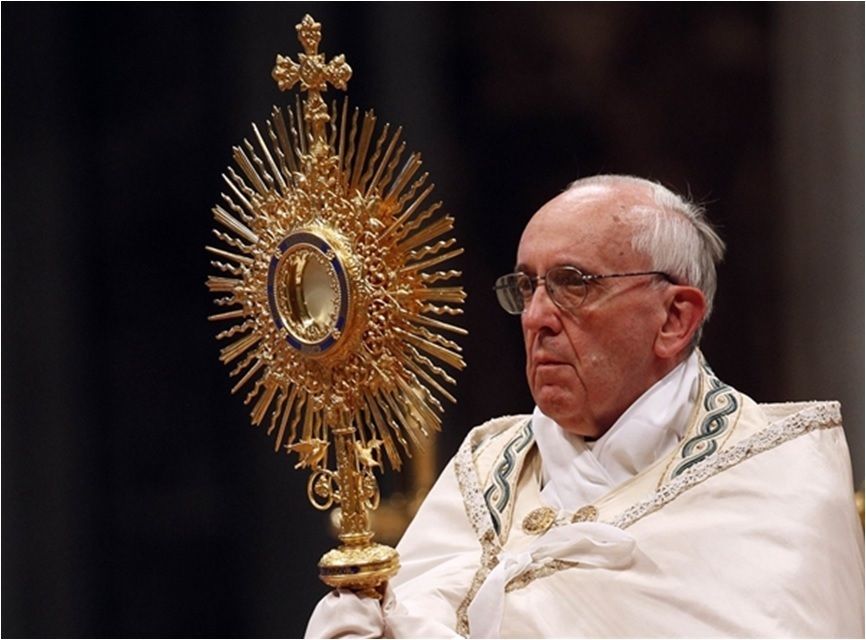
Pope Francis led the unprecedented, worldwide event from Saint Peter's Basilica in Rome. Catholic faithful throughout the world took part in their own Cathedrals and churches, and followed the event on television, radio, and the internet.
Earlier, through a Vatican bulletin, the Holy Father asked that this time of Eucharistic Adoration be offered especially for: For the Church spread throughout the world and united today in the adoration of the Most Holy Eucharist as a sign of unity:
May the Lord make her ever more obedient to hearing his Word in order to stand before the world 'ever more beautiful, without stain or blemish, but holy and blameless.' That through her faithful announcement, the Word that saves may still resonate as the bearer of mercy and may increase love to give full meaning to pain and suffering, giving back joy and serenity.
For those around the world who still suffer slavery and who are victims of war, human trafficking, drug running, and slave labor. For the children and women who are suffering from every type of violence. May their silent scream for help be heard by a vigilant Church so that, gazing upon the crucified Christ, she may not forget the many brothers and sisters who are left at the mercy of violence.
Also, for all those who find themselves in economically precarious situations, above all for the unemployed, the elderly, migrants, the homeless, prisoners, and those who experience marginalization. That the Church's prayer and its active nearness give them comfort and assistance in hope and strength and courage in defending human dignity.
Solemn Adoration consisted of Gospel readings taken from Christ's Eucharistic discourse in the Gospel of Saint John, chapter six, along with traditional Eucharistic hymns and chants. Prayers from each of the past six popes, beginning with Pope Pius XII and concluding with Pope Benedict XVI, were offered during Adoration, with invocations for the needs of all mankind.
The ceremony concluded with the Tantum ergo and solemn benediction with the Blessed Sacrament by Pope Francis.
None of the few reports about the Sunday adoration mentioned Benedict XVI at all. It is important to remember that the main events of the Year of Faith were planned from the time Benedict XVI first announced it on October 11, 2011. The main events, with the participation of the Pope, were announced on June 21 last year, as follows:
 PREVIEW OF THE 'YEAR OF FAITH'
Adapted from the English service of
PREVIEW OF THE 'YEAR OF FAITH'
Adapted from the English service of

Vatican City, 21 June 2012 (VIS) - A press conference was held this morning in the Holy See Press Office for the presentation of the Year of Faith which will be observed by the universal Church from 11 October 2012 to 24 November 2013.
The conference was presented by Archbishop Rino Fisichella and Msgr. Graham Bell, president and undersecretary, respectively, of the Pontifical Council for Promoting New Evangelisation.
Archbishop Fisichella also presented the website and logo of the Year of Faith, and outlined the calendar of major events to be presided over by the Holy Father himself.
Here are excerpts from his presentation:
In his Apostolic Letter 'Porta fidei' Benedict XVI speaks ... of the need to rediscover the journey of faith so as to shed ever clearer light on the joy and renewed enthusiasm of the encounter with Christ..
For this reason he has convoked the Year of Faith, which will also coincide with two anniversaries: the fiftieth anniversary of the beginning of Vatican Council II and the twentieth anniversary of the publication of the Catechism of the Catholic Church...
The Year of Faith aims, above all, to support the faith of believers who, in their daily trials, never cease to entrust to entrust their lives to the Lord Jesus, with courage and conviction. Their precious testimony, which does not make the news, ... is what enables the Church to present herself to the world today, as she did in the past, supported by the strength of the faith and the enthusiasm of ordinary people.
The Year of Faith falls into a broader context which is characterised by a generalised crisis that also touches the faith. ... The crisis of faith is a dramatic expression of an anthropological crisis which has abandoned man to his own devices.
We must overcome the spiritual poverty affecting so many of our contemporaries who do no longer perceive the absence of God from their lives as a void that needs to be filled.
The Year of Faith, then, is an opportunity which the Christian community offers to the many people who feel nostalgia for God and who desire to rediscover Him.
The programme of events for the Year "touches the daily life of all believers and the ordinary pastoral care of the Christian community, in order to rediscover that genuine missionary spirit which we need in order to give life to the new evangelisation", Mons. Fisichella said.
In this context, the archbishop announced that the Congregation for Divine Worship and the Discipline of the Sacraments has approved the prayers for a special "Mass for New Evangelisation". This, he said, is a sign that during the Year of Faith "priority will be given to prayer, and especially to the Eucharist as source and summit of all Christian life".
He presented the logo of the Year of Faith in which the image of a ship symbolises the Church. The mast of the vessel is a cross with full-blown sails which form the monogram of Christ (IHS) and in the background is a sun representing the Eucharist.
The website of the event (www.annusfidei.va) is available in various languages and can be consulted by smartphone and tablet. The Year also has an official hymn entitled: "Credo, Domine, adauge nobis fidem".
A multilingual pastoral guide entitled "Living the Year of Faith" will be published in early September.
Archbishop Fisichella enumerated the events of the Year of Faith which will be celebrated in Rome in the presence of the Holy Father:
They include the opening, which "will take place in St. Peter's Square on Thursday 11 October, fiftieth anniversary of the beginning of Vatican Council II. There will be a solemn Eucharistic celebration concelebrated by the Synod Fathers, the presidents of the world's episcopal conferences and by Council Fathers who are still alive".
Sunday 21 October will see the canonisation of seven martyrs: Jacques Berthieu, Pedro Calungsod, Giovanni Battista Piamarta, Maria del Carmen (born Maria Salles y Barangueras), Kateri Tekakwitha, Maria Anna Cope, and Anna Schaffer.
On 25 January 2013, during the traditional ecumenical celebration at the Roman basilica of St. Paul's Outside-the-Walls, participants will pray that, "through their joint profession of the Symbol, Christians ... may not forget the path of unity".
On 28 April the Holy Father will impart the Sacrament of Confirmation to a group of young people, while 5 May will be dedicated to expressions of popular piety.
On 18 May, the eve of Pentecost, Catholic movements, both old and new, will gather in St. Peter's Square.
On 2 June, Corpus Christi, the Blessed Sacrament will be adored at the same time all over the world.
Sunday 16 June will be dedicated to the Gospel of Life.
On 7 July seminarians and novices from all over the world will conclude their pilgrimage by gathering in St. Peter's Square.
September 29 will be dedicated to catechists on the twentieth anniversary of the publication of the Catechism of the Catholic Church, and 13 October will focus on the presence of Mary in the Church.
Finally, the closing celebration of the Year of Faith will take place on 24 November 2013.
The Year of Faith will also include a number of cultural events in Rome, including an exhibition on St. Peter to be held at Castel Sant'Angelo from 7 February 2013 to 1 May 2013 and a concert in St. Peter's Square on 22 June 2013.
 I haven't yet seen any roundup of photos from the worldwide celebration of Holy Hour - as we used to call it pre-Vatican II, when it was a habitual event in most Catholic churches (in Catholic school, we observed it once a week, with each class taking its turn for Holy Hour in the school chapel). Holy Hour fell into general disuse after Vatican II - and Benedict XVI must be credited for re=introducing it in a most dramatic way by leading the million young people gathered in Cologne in August 2005 for World Youth Day, on an unforgettable evening of silence and prayer, the first of three such massive and equally unforgettable Adorations during his Pontificate (Sydney in 2008, Madrid in 2011), with smaller versions in Prague, Zagreb and London.
I haven't yet seen any roundup of photos from the worldwide celebration of Holy Hour - as we used to call it pre-Vatican II, when it was a habitual event in most Catholic churches (in Catholic school, we observed it once a week, with each class taking its turn for Holy Hour in the school chapel). Holy Hour fell into general disuse after Vatican II - and Benedict XVI must be credited for re=introducing it in a most dramatic way by leading the million young people gathered in Cologne in August 2005 for World Youth Day, on an unforgettable evening of silence and prayer, the first of three such massive and equally unforgettable Adorations during his Pontificate (Sydney in 2008, Madrid in 2011), with smaller versions in Prague, Zagreb and London.
Because of their 'local' character, none of the celebrations anywhere in the world this Sunday could match the power of those images. I have not even seen any photo of the congregation at St. Peter's.
I was taken aback earlier that Pope Francis did not mention the Adoration in his noontime remarks at the Angelus a few hours before the event. Benedict XVI, author of that great post-synodal apostolic exhortation about the Eucharist, Sacramentum caritatis, would have, in so many ways, highlighted this worldwide adoration before the event, during the interval from the 'correct' day for the Solemnity of Corpus Domini last Thursday to its post-Vatican II Sunday observance. He never failed to invite the faithful to join him for any scheduled liturgies.
Once again, my apologies for being away from the Forum due to unavoidable circumstances - I hope I can make up for the past two days later today...
[Modificato da TERESA BENEDETTA 05/06/2013 22:30] |
| |
 05/06/2013 23:44 05/06/2013 23:44 |
|
| | | OFFLINE | | Post: 26.779
Post: 9.264 | Registrato il: 28/08/2005
Registrato il: 20/01/2009 | Administratore | Utente Master | |
|
|
| |
 05/06/2013 23:44 05/06/2013 23:44 |
|
| | | OFFLINE | | Post: 26.780
Post: 9.265 | Registrato il: 28/08/2005
Registrato il: 20/01/2009 | Administratore | Utente Master | |
|

 Still catching up...
Monday, June 3, Ninth Week in Ordinary Time
Still catching up...
Monday, June 3, Ninth Week in Ordinary Time
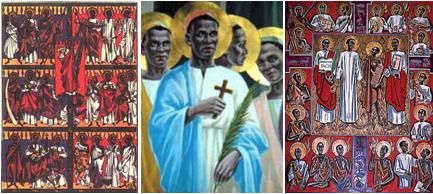 ST. CHARLES LWANGA AND 21 UGANDAN MARTYRS (d 1885-1887)
ST. CHARLES LWANGA AND 21 UGANDAN MARTYRS (d 1885-1887)
Between 1885-1887, an Ugandan tribal chief had 22 Catholic and ten Anglican court pages
killed for refusing to denounce their Christian faith. One of them was Charles, who became
head page after his predecessor Joseph Mukasa was beheaded for the same offense. Charles
then protected his pages from the homosexual advances of the tribal chief. He was a catechumen,
converted by the White Fathers, when he joined the royal household, where he managed to
convert other pages. He was considered the best athlete in the court and 'the handsomest man
in Uganda'. The tribal chief had been tolerant of Christianity at first but one of his chief
advisers persuaded him that Christians with their pacifism would be counterproductive to his
rule. He first turned against the rebellious pages who were sentenced to death by burning, with
Charles burned alive first to set the example. The other pages (15 Catholics and 10 Anglicans,
aged 13-30) likewise stood and died for their faith. Benedict XV recognized their martyrdom and
beatified them in 1935, and Paul VI canonized them in 1964. Charles is venerated as the patron
of African youth.
Monday, June 3, 2013, AT THE VATICAN
Pope Francis met with
- H.E. Jorge Carlos Fonseca, President of the Republic of Cape Verde, and his delegation
- His Beatitude Nersès Bédros XIX Tarmouni, Patriarch of Cilica of the Armenians, and his delegation
- Cardinal Manuel Monteiro de Castro, Major Penitentiary [Latest among the heads of Roman Curial offices with whom Pope Francis has met one-on-one since his election]
At 6:15 p.m., the Pope addressed a delegation from Bergamo, hometown of Blessed Pope John XXIII, after a Mass
celebrated in St. Peter's Basilica by Mons. Beschi, Bishop of Bergamo (in northeast Italy) to mark the 50th
anniversary of the Pope's death. The date is marked as his liturgical feast.
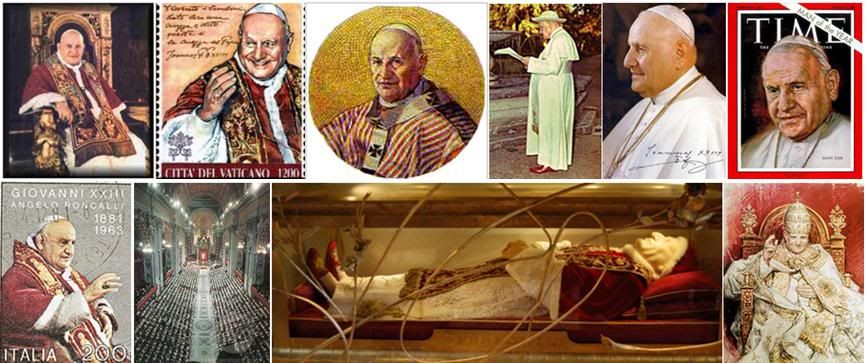 BLESSED POPE JOHN XXIII (1881-1963)
Cardinal Angelo Roncalli was Patriarch of Venice and one month short of his 78th birthday when he was elected Pope to succeed Pius XII in 1978. Shortly thereafter, he made history by convoking the Second Vatican Council. He lived only through its first session, succumbing to stomach cancer on June 3, 1963. He was beatified in 2000 by John Paul II and his body was moved from a tomb in the Vatican grottoes to a glass urn in a side chapel on the main floor of St. Peter's Basilica.
Three years ago...
BLESSED POPE JOHN XXIII (1881-1963)
Cardinal Angelo Roncalli was Patriarch of Venice and one month short of his 78th birthday when he was elected Pope to succeed Pius XII in 1978. Shortly thereafter, he made history by convoking the Second Vatican Council. He lived only through its first session, succumbing to stomach cancer on June 3, 1963. He was beatified in 2000 by John Paul II and his body was moved from a tomb in the Vatican grottoes to a glass urn in a side chapel on the main floor of St. Peter's Basilica.
Three years ago...
Mons. Luigi Padovese, president of the Turkish bishops' conference, was assassinated by his driver in Iskenderun, Turkey, one day before he was to join the Holy Father on his visit to Cyprus June 4-6, 2010.
The driver has pleaded mental problems, but the crime had all the features of a Muslim hate killing
 One year ago...
One year ago...
The last day of Benedict XVI's three-day pastoral visit to Milan. The highlight was obviously the Mass attended by an estimated million people...
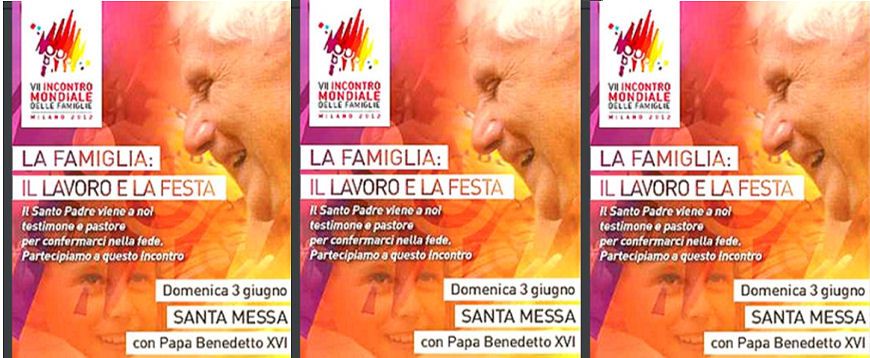 Day 3
Day 3
Concluding Mass
VII World Meeting of Families
Bresso-Parco Nord
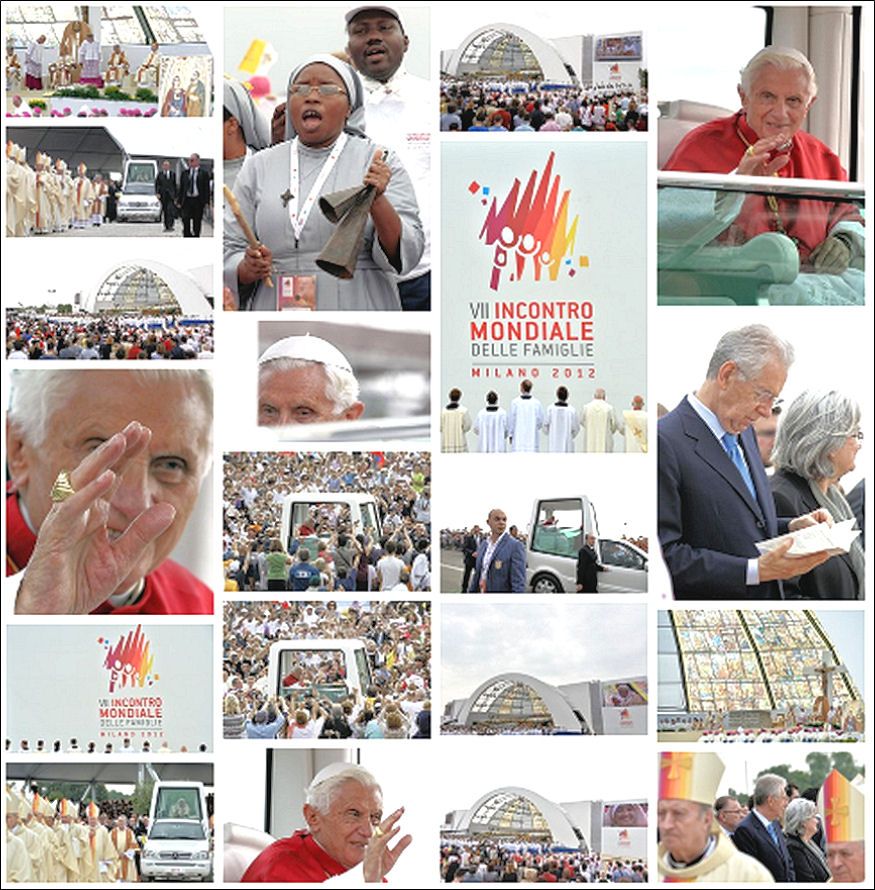
 In praise of Christian marriage
In praise of Christian marriage
and the Christian family
Adapted from

June 3, 2012
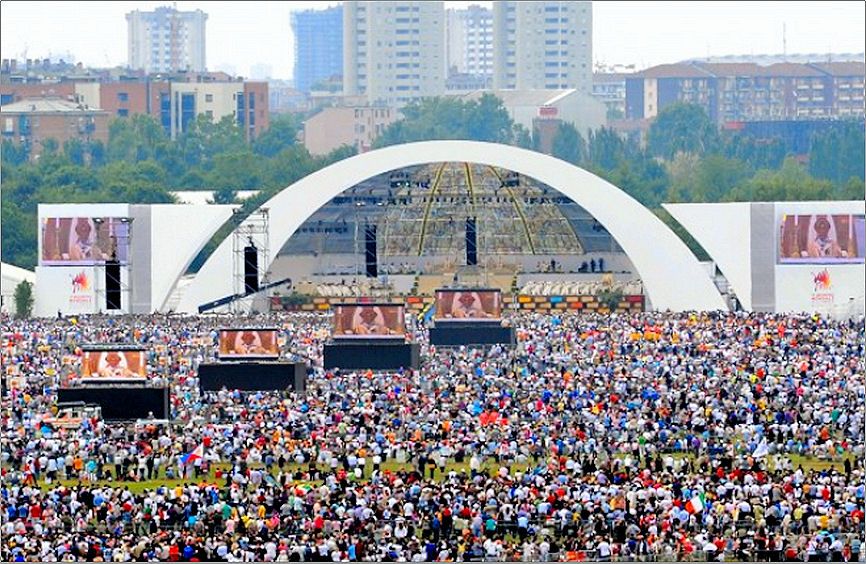
Up to a million people packed into Milan’s Parco Nord in Bresso for a Mass celebrated by Pope Benedict XVI, marking the conclusion of the VII World Meeting of Families, which was the occasion for Benedict XVI's three-day pastoral visit to Milan, his first as Pope.
Speaking on this year's theme "The Family: Work and Celebration", the Holy Father said it was important to 'strike the right balance' among the various areas of life because it is essential “for building up a society with a human face".
He stressed the significance of the sacrament of Marriage, saying that marriage between a man and a woman had “fruitful consequences" in every way.
The Pope said that this sacred union was fruitful first and foremost for the married couple, because “you desire and accomplish one another's good, you experience the joy of receiving and giving."
"It is also fruitful," he said, "in your generous and responsible procreation of children, in your attentive care for them, and in their vigilant and wise education. And lastly, it is fruitful for society, because family life is the first and irreplaceable school of social virtues, such as respect for persons, gratuitousness, trust, responsibility, solidarity, cooperation."
Pope Benedict underscored that being a family also means "maintaining a constant relationship with God and participating in the life of the Church.
He warned against the consequences that modern economic theories and practice can have on the family, when they create "ferocious competition, strong inequalities, and degradation of the environment", while reducing family relationships to "fragile convergences of individual interests" that undermine the social fabric.
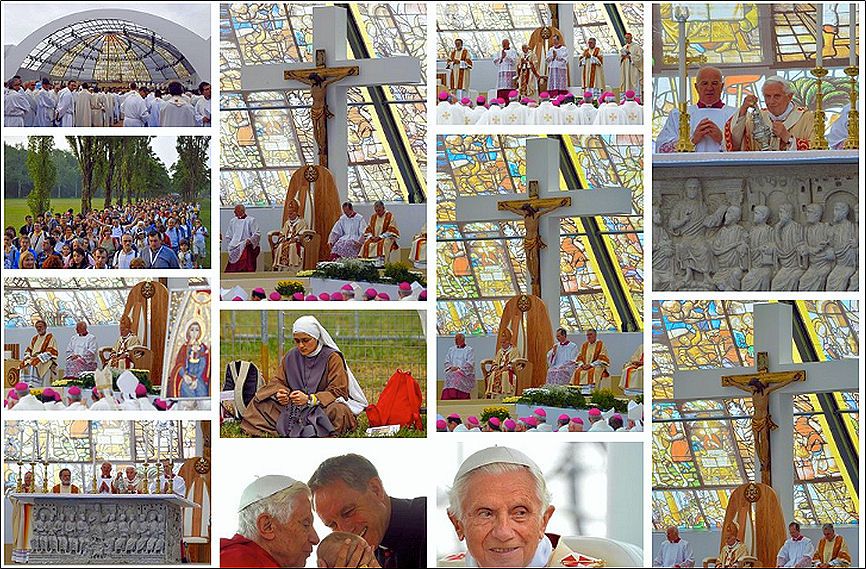
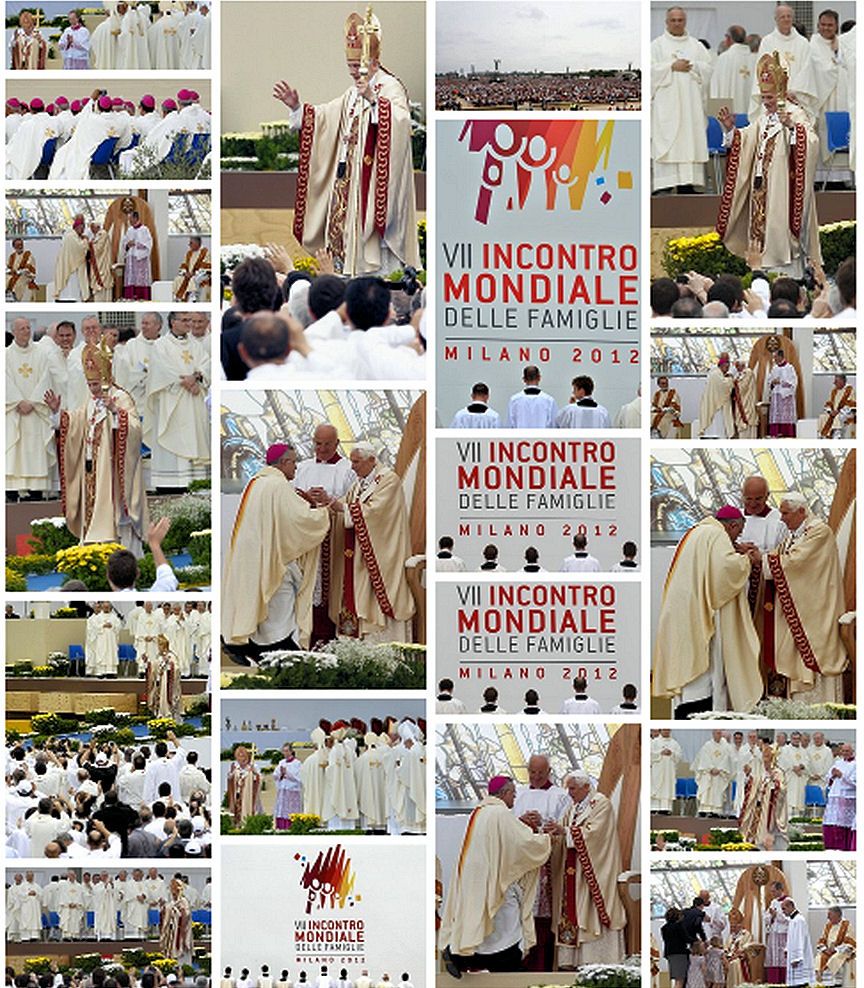 Another million-faithful Mass with Pope Benedict XVI
Another million-faithful Mass with Pope Benedict XVI....
Cologne, Sydney, Madrid, almost a million in Guanajuato, Mexico recently, and of course, the funeral Mass for John Paul II and the Beatification Mass....
Here is Vatican Radio's English translation of the Pope's homily:
Dear Brother Bishops,
Distinguished Authorities,
Dear Brothers and Sisters,
It is a time of great joy and communion that we are experiencing this morning, as we celebrate the Eucharistic Sacrifice: a great gathering, in union with the Successor of Peter, consisting of faithful who have come from many different nations.
It is an eloquent image of the Church, one and universal, founded by Christ and fruit of the mission entrusted by Jesus to his Apostles, as we heard in today’s Gospel: to go and make disciples of all nations, “baptizing them in the name of the Father and of the Son and of the Holy Spirit” (Mt 28:18-19).
With affection and gratitude I greet Cardinal Angelo Scola, Archbishop of Milan, and Cardinal Ennio Antonelli, President of the Pontifical Council for the Family, the principal architects of this VII World Meeting of Families, together with their staff, the Auxiliary Bishops of Milan and the other bishops. I am pleased to greet all the Authorities who are present today. And I extend a warm welcome especially to you, dear families! Thank you for your participation!
In today’s second Reading, Saint Paul reminds us that in Baptism we received the Holy Spirit, who unites us to Christ as brothers and sisters and makes us children of the Father, so that we can cry out: “Abba, Father!” (cf. Rom 8:15,17).
At that moment we are given a spark of new, divine life, which is destined to grow until it comes to its definitive fulfillment in the glory of heaven; we became members of the Church, God’s family, sacrarium Trinitatis as Saint Ambrose calls it, “a people made one by the unity of the Father, the Son and the Holy Spirit”, as the Second Vatican Council teaches (Lumen Gentium, 4).
The liturgical Solemnity of the Holy Trinity that we are celebrating today invites us to contemplate this mystery, but it also urges us to commit ourselves to live our communion with God and with one another according to the model of Trinitarian communion.
We are called to receive and to pass on the truths of faith in a spirit of harmony, to live our love for each other and for everyone, sharing joys and sufferings, learning to seek and to grant forgiveness, valuing the different charisms under the leadership of the bishops.
In a word, we have been given the task of building church communities that are more and more like families, able to reflect the beauty of the Trinity and to evangelize not only by word, but I would say by “radiation”, by the strength of living love.
It is not only the Church that is called to be the image of One God in Three Persons, but also the family, based on marriage between man and woman. In the beginning, “God created man in his own image, in the image of God he created him; male and female he created them. And God blessed them, and God said to them, ‘Be fruitful and multiply’” (Gen 1:27-28).
God created us male and female, equal in dignity, but also with respective and complementary characteristics, so that the two might be a gift for each other, might value each other and might bring into being a community of love and life. It is love that makes the human person the authentic image of God.
Dear married couples, in living out your marriage you are not giving each other any particular thing or activity, but your whole lives. And your love is fruitful, first and foremost for yourselves, because you desire and accomplish one another’s good, you experience the joy of receiving and giving.
It is also fruitful in your generous and responsible procreation of children, in your attentive care for them, and in their vigilant and wise education.
And lastly, it is fruitful for society, because family life is the first and irreplaceable school of social virtues, such as respect for persons, gratuitousness, trust, responsibility, solidarity, cooperation.
Dear married couples, watch over your children and, in a world dominated by technology, transmit to them, with serenity and trust, reasons for living, the strength of faith, pointing them towards high goals and supporting them in their fragility.
And let me add a word to the children: Be sure that you always maintain a relationship of deep affection and attentive care for your parents, and see that your relationships with your brothers and sisters are opportunities to grow in love.
God’s plan for the human couple finds its fullness in Jesus Christ, who raised marriage to the level of a sacrament. Dear married couples, by means of a special gift of the Holy Spirit, Christ gives you a share in his spousal love, making you a sign of his faithful and all-embracing love for the Church.
If you can receive this gift, renewing your “yes” each day by faith, with the strength that comes from the grace of the sacrament, then your family will grow in God’s love according to the model of the Holy Family of Nazareth.
Dear families, pray often for the help of the Virgin Mary and Saint Joseph, that they may teach you to receive God’s love as they did. Your vocation is not easy to live, especially today, but the vocation to love is a wonderful thing, it is the only force that can truly transform the world.
You have before you the witness of so many families who point out the paths for growing in love: by maintaining a constant relationship with God and participating in the life of the Church, by cultivating dialogue, respecting the other’s point of view, by being ready for service and patient with the failings of others, by being able to forgive and to seek forgiveness, by overcoming with intelligence and humility any conflicts that may arise, by agreeing on principles of upbringing, and by being open to other families, attentive towards the poor, and responsible within civil society.
These are all elements that build up the family. Live them with courage, and be sure that, insofar as you live your love for each other and for all with the help of God’s grace, you become a living Gospel, a true domestic Church (cf. Familiaris Consortio, 49).
I should also like to address a word to the faithful who, even though they agree with the Church’s teachings on the family, have had painful experiences of breakdown and separation. I want you to know that the Pope and the Church support you in your struggle. I encourage you to remain united to your communities, and I earnestly hope that your dioceses are developing suitable initiatives to welcome and accompany you.
In the Book of Genesis, God entrusts his creation to the human couple for them to guard it, cultivate it, and direct it according to his plan (cf. 1:27-28; 2:15).
In this commission from God, we may recognize the task of man and woman to collaborate with God in the process of transforming the world through work, science and technology. Man and woman are also the image of God in this important work, which they are to carry out with the Creator’s own love.
In modern economic theories, there is often a utilitarian concept of work, production and the market. Yet God’s plan, as well as experience, show that the one-sided logic of sheer utility and maximum profit are not conducive to harmonious development, to the good of the family or to building a more just society, because it brings in its wake ferocious competition, strong inequalities, degradation of the environment, the race for consumer goods, family tensions. Indeed, the utilitarian mentality tends to take its toll on personal and family relationships, reducing them to a fragile convergence of individual interests and undermining the solidity of the social fabric.
One final point: man, as the image of God, is also called to rest and to celebrate. The account of creation concludes with these words: “And on the seventh day God finished his work which he had done, and he rested on the seventh day from all his work which he had done. So God blessed the seventh day and hallowed it” (Gen 2:2-3).
For us Christians, the feast day is Sunday, the Lord’s day, the weekly Easter. It is the day of the Church, the assembly convened by the Lord around the table of the Word and of the eucharistic Sacrifice, just as we are doing today, in order to feed on him, to enter into his love and to live by his love.
It is the day of man and his values: conviviality, friendship, solidarity, culture, closeness to nature, play, sport. It is the day of the family, on which to experience together a sense of celebration, encounter, sharing, not least through taking part in Mass.
Dear families, despite the relentless rhythms of the modern world, do not lose a sense of the Lord’s Day! It is like an oasis in which to pause, so as to taste the joy of encounter and to quench our thirst for God.
Family, work, celebration: three of God’s gifts, three dimensions of our lives that must be brought into a harmonious balance. Harmonizing work schedules with family demands, professional life with motherhood, work with celebration, is important for building up a society with a human face.
In this regard, always give priority to the logic of being over that of having: the first builds up, the second ends up destroying. We must learn to believe first of all in the family, in authentic love, the kind that comes from God and unites us to him, the kind that therefore “makes us a ‘we’ which transcends our divisions and makes us one, until in the end God is ‘all in all’ (1 Cor 15:28)” (Deus Caritas Est, 18). Amen.
Next World Meeting of Families
will be held in Philadelphia -
first time in North America

June 3, 2016
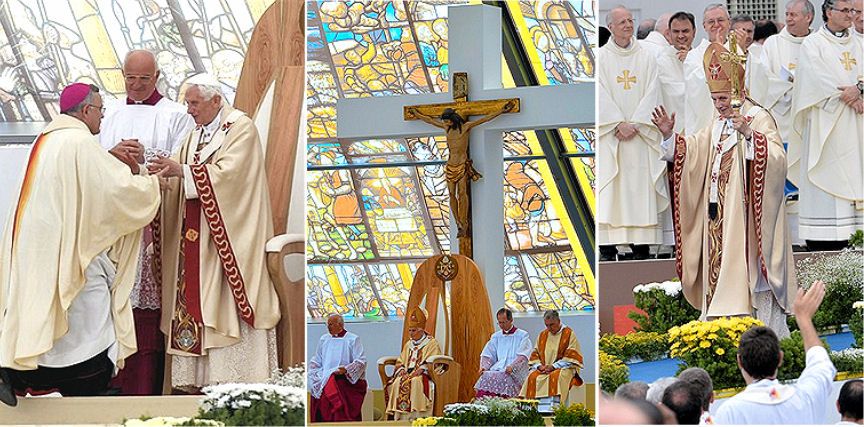 Mons. Chaput, Archbishop of Philadelphia, was on hand for the good news that his diocese will be hosting the VIII World Meeting of Families.
Mons. Chaput, Archbishop of Philadelphia, was on hand for the good news that his diocese will be hosting the VIII World Meeting of Families.
After the final Communion prayer and before leading the Angelus today, the Pope, speaking off the cuff said, “I cannot find the words to express my thanks for your presence here for this celebration of the Family.”
And to the cheers of the hundreds of thousands gathered, the Holy Father announced that the 2015 World Meeting of Families would take place in Philadelphia in the United States.
“I now have the joy of announcing that the next World Meeting of Families will take place in 2015 in Philadelphia in the United States of America. I send my warm greetings to Archbishop Charles Chaput and to the Catholics of that great city, and look forward to meeting them there along with numerous families from all around the world. May God bless you all!”
There was also loud applause when the Auxillary Bishop of Milan Erminio De Scalzi announced that Pope Benedict was donating 500,000 euros to those affected by the recent earthquake in the Emilia Romagna region of Italy.
In concluding remarks, the Pope encouraged the faithful to be always near to families who face difficulties, such as the Italians stricken by the recent earthquake and those who face hardship due to the economic crisis.
Here is a translation of the Holy Father's words before and after the Angelus prayers:
Dear brothers and sisters:
I cannot find the words of thanksgiving for this faest of God, for this communion of the family of God that we are. At the end of this celebration, then, we thank God who has given us this great ecclesial event.
On my part, I extend my heartfelt thanks to all who have worked for this event, starting with Cardinal Ennio Antonelli, president of the Pontifical Council for the Family - thank you, Eminence! =- and to Cardinal Angelo Scola, Archbishop of Milan - thank you! Also for this beautiful temple of God that you gave us for today. I thank all the officials who organized the event and all the volunteers.
And I am happy to announce that the next World Meeting of Families will take place in 2015, in Philadelphia in the United States of America.
I greet the Archbishop of Philadelphia, Mons. Charles Chaput, and I thank him for his readiness to host the event.
In French he said:
I affectionately greet French-speaking families, especially those who travelled to Milan for this event. I entrust all families to the Holy Family of Nazareth so that they may be places where life can flourish - families in which God has a place.
Today, I also take part spiritually in the joy of the faithful of the Archdiocese of Besancon in France, who are gathered to celebrate the beatification of Fr. Marie Jean-Joseph Lataste, a priest of the Order of Preachers (dominicans), apostle of mercy and apostle of prisons.
I am happy to announce that the next World Meeting of Families will take place in the city of Philadelphia, USA, in 2015. Through the intercession of the Virgin Mary, may you open your hearts and homes to Christ!
In English:
As we conclude this celebration by turning in prayer to the Virgin Mary, I wish to extend my thanks to all who have contributed to the success of this World Meeting of Families, particularly to Cardinal Ennio Antonelli, President of the Pontifical Council for the Family, to Cardinal Angelo Scola, to the Archdiocese and City of Milan, and to the many people from Italy and abroad who have prayed and worked so hard to make this Meeting a time of grace for all.
I now have the joy of announcing that the next World Meeting of Families will take place in 2015 in Philadelphia in the United States of America. I send my warm greetings to Archbishop Charles Chaput and to the Catholics of that great city, and look forward to meeting them there along with numerous families from all around the world. May God bless you all!
In German:
I greet all the pilgrims and families from German-speaking countries. I thank you for your participation in this World Meeting of Families in Milan. The family is, as we know, vital for society. In God's plan of creation, it is the privileged place where human beings can grow and learn the right way of life. Its contribution to the overall development of man is indispensable.
Let us therefore all do everything to create, even today, a family-friendly climate. and let us pray for good families and their togetherness.
Even now I invite you to the next World Meeting of Families in Philadelphia in 2015. May the Lord bless and protect families and all of us.
In Spanish:
I greet with special affection the Spanish-speaking faithful who have taken part with great enthusiasm in this World Meeting of Families, as well as those who are spiritually united to us through the communications media.
May the Most Holy Trinity - Father, Son and Holy Spirit - make everyone grow interiorly in the wisdom of love and abandonment to God, so that following the example of the Virgin Mary - perfect model of daughter, mother and spouse - your homes may increasingly be temples of God and true domestic churches in an abundance of virtues. beauty of mutual union, and constant fidelity.
With joy I announce that the next World Meeting of Families in 2015 will take place in the city of Philadelphia, in the United States of America. A happy Sunday to all...
In Portuguese:
I greet the families from the various Portuguese-speaking lands who are present in communion, and remind everyone of the Divine Treaty which, from the dawn of creation, hovered over the work that God had done and rejoiced: "It is good".
Dear families, you are with God at work and in celebration. Reserving Sunday for God, you celebrate like God did and rest together, at the spring where life arises, in order to construct the present and the future.
Divine powers are always stronger than your difficulties: Do not be afraid! You are strong in God. With joy, I announce to you that the next World Meeting of Families will take place in 2015 in the American city of Philadelphia.
In Polish:
I greet the Polish families present here in Milan and those who are with us through the communications media. May the the themes discussed these days - family, work and celebration - strengthen family love, fidelity and conjugal honesty; encourage young people so that they may desire 'to be' rather than 'to have', and help everyone to live Sundays as an encounter with Christ, in the joy of family celebration.
For the next World Meeting of Families, I invite you to Philadelphia in the United States, God willing, in three years. I entrust all your families to Mary, Queen of Families!
Finally, in Italian once more:
Dear families of Milan, Lombardy, Italy and the entire world. I greet you all with affection and thank you for your participation. I encourage you to always show solidarity with the families who are undergoing the most difficulties - such those who are suffering from the economic and social crisis, and the victims of the recent earthquakes in Emilia. May the Virgin Mary accompany you and sustain you always. Thank you.
After the Mass and Angelus, the Pope returned to the Archbishop's residence by car for lunch with cardinals, bishops and representatives of the families who took part in the week's events. The lunch was held in an interior balcony of the residence.
In the afternoon, at 4:30 pm., the Holy Father greeted the members of the Fondazione Famiglia 2012 and other organixers of the event. Downstairs, he greeted volunteers who had worked for the WMF, then left by car for Linate airport and the trip back to Rome.
At the airport, he made his farewell to his hosts, as well as Prime Minister Mario Monti, who represented the Italian government.


[Modificato da TERESA BENEDETTA 06/06/2013 15:33] |
| |
 06/06/2013 00:06 06/06/2013 00:06 |
|
| | | OFFLINE | | Post: 26.781
Post: 9.266 | Registrato il: 28/08/2005
Registrato il: 20/01/2009 | Administratore | Utente Master | |
|

 Allow me to further indulge by posting the immediate 'assessment' stories of Benedict XVI's three-day visit to Milan, starting with that by Andrea Tornielli who may not recognize himself as the writer of this story after appearing to have contracted total Benedict amnesia on March 13, 2005...
Allow me to further indulge by posting the immediate 'assessment' stories of Benedict XVI's three-day visit to Milan, starting with that by Andrea Tornielli who may not recognize himself as the writer of this story after appearing to have contracted total Benedict amnesia on March 13, 2005...
 The real Ratzinger/Benedict XVI:
The real Ratzinger/Benedict XVI:
No anathemas in Milan, just encouragement
for families and married couples
by ANDREA TORNIELLI
Translated from the Italian service of

June 3, 2012
MILAN - This morning, a million persons rallied around Benedict XVI at the Mass which concluded the VIII World Meeting of Families, an event that was celebrated at a time that is particularly difficult for the Holy See and for the Pope's own household, in particular, because of the investigation of Vatileaks that has so far led to the arrest and detention of the Pope's valet.
It has been said and written that the affection of the faithful who came from 153 countries - who were very disciplined during the papal Mass at Bresso Park as much as they were warmly enthusiastic at the non-liturgical events - has sustained and comforted the Pope at this time.
The truth is that Benedict XVI, during the three days of his pastoral visit to Milan, had encouraged and sustained not the family in the abstract, but families in flesh and blood who had responded to his invitation to join this triennial event. He encouraged and sustained them in the positive experiences they already had and were carrying them on.
A first reality that surprised many was Papa Ratzinger's capacity to bear up to the physical demands on him. Especially Saturday evening, during the Feast of Testimonials when the Pope - who gives the best of himself in terms of effective communications ability - answered extemporaneously to the questions asked of him by representative families.
Of course, he had an idea beforehand what the questions would be, but his replies were concise and precise.
Paradoxically, it was at the event where there were hardly any politicians in attendance that the Pope had said the most beautiful thing about politicians:
"I think that the sense of responsibility should grow, in all political parties, not to promise things which they cannot realize, that they stop simply seeking votes for themselves, but that they should be responsible for the good of all, and that they understand that politics is always a moral responsibility before God and before men".
A second element is the tone that the Pope chose for the messages he sent for these days. One might have expected anathemas against the 'threats' that undermine the family, and yet, despite repeated headlines about 'abortion', 'euthanasia', 'de facto unions', Benedict XVI during these three days has spoken about the family and of families without once saying those words.
He has shown what is and what should be the contribution of Christians in this plural and 'fluid' society': a creative minority of persons who are not 'prophets of doom' (as Cardinal Scola said in his first greeting to the Pope at Milan's Piazza del Duomo) but who seek to bear witness to their experiences of living 'good'.
Even if he did not present any doctrinal change regarding communion for remarried Catholic divorcees [whose original Catholic marriage has not been annulled), the words the Pope addressed to this issue - showing that he grasps and acknowledges their difficulty and their suffering in this respect, and asking the Church community to pay more attention to them, were significant.
They showed once more that the true Ratzinger - the man that the million or more pilgrims gathered in Milan saw and heard - is different from the Ratzinger 'perceived' through the lenses of mass media.
No anathemas, condemnations or jeremiads. Nor dark-toned pictures of the reality - which are objectively difficult -that the world and its families are experiencing.
Benedict XVI did not 'fly high', but he spoke of the Other, which makes it worth living and building a family.
Back in July 2006, when Benedict XVI attended the V World Meeting of Families in Valencia, Spain, he said this to newsmen on the plane from Rome to Valencia, when he was asked specifically about whether he would criticize the anti-Catholic legislation of then Prime Minister Zapatero's socialist government:
I only wish to take a message of encouragement... 1 would not like to begin immediately with the negative aspects, because I am thinking of families that love one another, that are happy. We want to encourage this reality which is the reality that gives hope for the future...
"There are points where the Christian faith says 'no', it is true, and we want to make it understood that, precisely according to the nature of the human being, man and woman are ordered one for the other, and that they are also ordered to give a future to humanity. Therefore, we underline these positive things and in that way, we make it understood why the Church cannot accept certain things.
Fr. Lombardi on the Pope's visit:
'A great success - three days of joy
for the Church and the Pope'
Translated from the Italian service of

June 3, 2012
MILAN - "One couldn't have hoped for anything better," said Fr. Federico Lombardi about the Pope's pastoral visit to Milan and 'the great success' of the VII World Meeting of Families. "It didn't even rain. Everything went as well as it could".
At a briefing for newsmen Sunday afternoon, he said the events with Benedict XVI "all told, probably had about one-and-a-half million to two million participants - a Church event that was extremely expressive for the Church towards society and mankind. Everything was positive and helps to appreciate what is beautiful in the Church, in men and in the world".
As for Pope Benedict, Fr. Lombardi said that these 'three days of joy' in Milan will be of help to him "to face in silence and hope" the problems that face the Church, especially after the publication of leaked private documents that resulted in the arrest of the Pope's own valet.
[I don't understand why Fr. Lombardi persists in referring to the entire Vatileaks episode as a problem for 'the Church" - it's a Vatican problem, and the Vatican is not the Church. He, of all people, should not be taking the lead in feeding this confusion that the media have been perpetrating. Earlier this week, he told newsmen at one of his briefings, "I know this problem has resulted in a great loss of trust in the Church etc". If that was so, there would not have been a million people at the Mass in Milan. The faithful would not have lined the Pope's motorcade route from Linate airport to the city, and vice-versa, three days later.
Obviously, the so-called 'simple folk' have more common sense than the so-called communications experts, MSM and Fr. Lombardi included, who seem to believe that the world begins and ends with the news headlines. The 'simple folk' in whose behalf Benedict XVI has been laboring to clarify the faith constantly - so that they do not get confused by human irrelevancies - do not have their world view shaped by the media, and thank God for that.
Of course, there are not a few gullible persons, Catholics or not, generally among the bourgeois with intellectual pretensions, who deliberately get their opinions (and world-view) from whatever is the prevailing 'spirit of the times', which today is very secular and particularly anti-Catholic. The bourgeois mentality is one that wants to be 'in' all the time. Clearly, such persons can never see reason in a faith whose divine founder said would always be 'a sign of contradiction' - counter to what 'the world' thinks, i.e., not 'in' at all, not politically correct, not plugged into the herd mentality.]
These days, Fr. Lombardi added, "We have seen the Pope very serene and very happy. These have been three beautiful days for the Church - beautiful and intense. He is very sensitive to the manifestations of affection from the faithful, and he experiences their enthusiasm and their applause with joy and gratitude."
As for the new documents (one signed, the other anonymous) published today in an Italian newspaper, Fr. Lombardi said: "I am not surprised that more documents are coming out, nor am I more concerned now about these particular documents, but only for the general situation that so many confidential files have been released, about which we are still investigating the real significance and objectives pursued by this operation".
He added: "We do not expect that these will be the last of these documents, and I will not be surprised if more will follow. It is clear that whoever has received a vast quantity of documents has a chance to play out various strategies depending on his purposes. And I certainly don't think he would release everything once and for all, but rather keep us guessing. He won't leave us alone". [Could Nuzzi be the source of the documents cited today by Repubblica*, which is naturally playing coy about their source, or is there someone else now who is playing the same game as Nuzzi? It's hard to believe that if Nuzzi had anything more 'explosive', he would not have already used it in his book which suffers from a general paucity of 'major' disclosures, let alone any 'smoking gun' about any of the Curial hierarchy!]
Fr. Lombardi also revealed that Italian Prime Minister Mario Monti, who attended the papal Mass this morning in Milan, had greeted the Pope briefly after the Mass. He said the Prime Minister had waited after the Mass by the structure used as the sacristy for the Pope to vest and unvest his liturgical garments, and spoke to him when the Pope arrived in the Popemobile.
Lombardi said "it was an act of courtesy and kindness, not a conversation", but he noted that the presence of the Prime Minister at the Mass was "a very important gesture for society, not just for the Church, because the event was all about the family".
The Pope at Milan's Feast of Families:
'Never have I seen such dialog
between a Pope and the people',
says an aged parish priest
by Giacomo Galeazzi
Translated from the Italian service of

June 3, 2012
"I have never seen such dialog between a Pope and the people", an aged parish priest said, one of almost half a million people gathered in Milan's Bresso-Parco Nord for the Feast of Testimonials with Benedict XVI on the eve of the conclusion of the VII Wolrd Meeting of Families on Saturday night.
Benedict XVI's second day in Milan had a memorable epilog. Since sunset, a rainbow of families from around the world, listened to a Pope who took on questions from representative families on a range of issues facing families today.
They acclaimed him from the field, as onstage, he answered questions that included communion for remarried Catholic divorcees and common difficulties about being faithful to Catholic teaching.
This Catholic kermesse became an agora of ideas and a time machine. After having listened to a round of testimonials about their life experiences from families in different parts of the world, Papa Ratzinger, instead of addressing the assembled faithful with a prepared text, had decided earlier to answer representative questions from the participants of the VII World Meeting of Families.
He looked into the eyes of those who posed the questions, went back into his own personal memories of family and childhood, and extemporaneously answered them with the good sense and wisdom of a man of faith.
Like a grandfather reminiscing on a summer evening, he described walks in the mountains with his parents, the music they enjoyed at home, his infancy in various little towns of Bavaria. Slices of domestic routine, flashes of how one family shared their humanity and Catholicism.
The world's parish priest united warmth and fidelity to doctrine. During this trip, he made no exceptions, calling on everyone to hold and uphold 'high ideals' - at the Cathedral to the clergy of the archdiocese; at the football stadium to the young confirmands; and now in this park in Bresso, enfolded in the embrace of a crowd not previously seen in Milan.
And yet, the model of public and private life that Benedict XVI has constantly proposed in his Pontificate is anything but 'on the cheap'. Perhaps he may have conceded to pop 'form' when he met with Milan's two famous football teams and received a jersey from each of them, or by sitting through the pop-music choreography that interspersed the Feast of Testimonials. But none of this touched on the content of his teaching.
Thus, the theologian Pope and Pastor catechized politicians not to vote laws that promote abortion or euthanasia, admonished young people to opt for marriage instead of simply living together and the virtues of family that derive from marriage, and re-stressed to the clergy the nature and grace of priestly celibacy.
But despite his characteristic preaching, which is neither 'soft' nor 'sweetened' up for public consumption, every event of his visit to Milan was am oceanic immersion among the faithful.
And remarkably, he also had a significant private meeting with Milan's emeritus Archbishop, Cardinal Carlo Maria Martini, historic leader of Italy's progressive bishops, whose request to meet with the Pope was the sign of a Milan which stands behind the Pope even as 'crows and moles' continue to poison the higher levels of the Curial hierarchy in Rome.
"The people sense the sincerity and power of his message", said don Luca, a Sicilian parish priest pushing the wheelchair of a disabled child towards the stage in front of the Cathedral of Milan to get a papal blessing.
Every movement of the Pope from one event to the next has taken place amidst singing, chanting and ovations. In front of the football stadium in Meazza, thousands [who were not participants in the stadium event] had been awaiting his arrival since dawn.
"I learned the faith in my family, where my character was shaped to be able to make my choices in life, and so I feel it is my moral duty to reciprocate to the Pope something of the good that I receive from his teaching", said Alessio Angeloni, a 35-year-old man who came to Milan from Ancona with 20 friends to see the Pope in Milan.
And from the 65-yearold parish priest of Sant'Andrea outside Florence, don Vasco Giuliani: "Benedict XVI has the best 'product' to sell in Christ, and at the best price, since he is free for everyone".
Don Vasco, who was a spiritual adviser for Italian Catholic Action for two decades and is now in charge of family ministry for his diocese, said: "Benedict XVI has the courage to propose not a generic ideal of the family, but that which must conform to Christian identity".
The faithful seek him out and he sees in them a plurality of individual stories. The vigil in Bresso was a collective conversation. Divorce, the economic crisis, a sense of difficulty about everything.
For each problem the Pope does not have 'a simple prescription' to make and says so clearly, but every question offers him a starting point for reflection, the comfort of his closeness, and the warmth of a Magisterium that speaks to real life, lie as it is.
To a Greek family that has been torn to pieces by the economic crisis, he admits: "Words are inadequate, we must do something concrete, and yet we are all incapable of doing that".
Then he calls on politicians to take responsibility: "Individuals are suffering, and their leaders ought to accept their responsibility for this".
And all around him, half a million faces who see in the gentle face of this Pope a glimmer of hope. Including divorced Catholics, whom he assures: "The Church loves everyone. You are not excluded".
In the Church, the Pope assures, no one is cast out, and no one is alone.
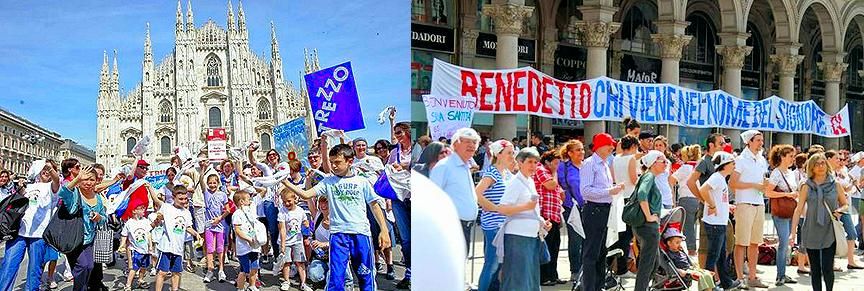 This is the kind of sidebar I have been hoping to read every time the Pope goes on the road (or eben in St. Peter's Square, where the whole world comes), but most journalists think it is not worth the effort. And yet, 'man-on-the-street' reactions have always been a good staple of journalism. The trick is to be able to talk to as many people as you can in order to get a range of answers. And invariably, one is surprised how individual and even how original almost every answer is. They are so spontaneous they cannot be invented. And not the least of this story's merits is that in an almost matter-of-fact way, without melodrama, the writer does not hesitate to convey the sense that she is in the midst of an extraordinary happening, about which is not in the least blase... It is most refreshing.
Caterina, Seunghee, Mahmoud...
This is the kind of sidebar I have been hoping to read every time the Pope goes on the road (or eben in St. Peter's Square, where the whole world comes), but most journalists think it is not worth the effort. And yet, 'man-on-the-street' reactions have always been a good staple of journalism. The trick is to be able to talk to as many people as you can in order to get a range of answers. And invariably, one is surprised how individual and even how original almost every answer is. They are so spontaneous they cannot be invented. And not the least of this story's merits is that in an almost matter-of-fact way, without melodrama, the writer does not hesitate to convey the sense that she is in the midst of an extraordinary happening, about which is not in the least blase... It is most refreshing.
Caterina, Seunghee, Mahmoud...
Here are the Pope's faithful
by Elena Galardoni
Translated from

June 2, 2012
"Me gusta su corazon" (I like his heart), says little Lucia, 8 years old, who has come to Milan from Cuenca near Madrid with Suor Maria de la Cruz who is wearing a baseball cap over her brown sister's veil.
Lucia puts her hand over her heart and beats it to the rhythm of her heartbeat when I asked her what she liked most about Benedict XVI.
Here, at Milan's Piazza del Duomo this later afternoon, there are children everywhere among the adults, even many dogs on a leash or carried by their masters.
And when the Pope with his unmistakable shock of white hair blowing in the wind emerges to greet the people of Milan from the little stage in front of the cathedral doors, not just the babies but even the dogs were raised high to greet him! Umbrellas close down as if on cue, and the chant is taken up, BE-NE-DET-TO!
God's creatures present here today are exultant. Faces are alight with smiles, even as the first stretcher with a woman prostrated by the heat, rushes by, towards the Galleria.
"It's almost too much to bear," says Ana Maria, dressed in yellow. "The emotion is overwhelming".
Thousands like her had been waiting here for hours, almost rooted to the pavement on the Piazza. The whole world is here but not to protest. Rather to rejoice.
"Please write that we are here to pay our respects to beauty - we are so tired of ugliness", says Maria P. 40, a Milanese, who is here with a friend.
Caterina Grassi, 41, also Milanese: "I am here to start a religious journey. I have the essentials, but I waited for this day to formally mark my initiation into faith. It is never too late".
Seunghee Kang, 32, Korean: "It's a difficult and complicated time for the Pope. We are with him. And God is with him".
Hamissou, 23, Nigerian: "Benedict XVI is a strong religious figure. I am a believer, but he makes me believe even more".
Mahmoud, 33, Egyptian: "He is a good man, and his goodness is contagious. He works only for what is good, which is rare in our time".
Elizabeth, 20, from the USA: "It's a stupendous feeling to see so many people of so many races gathered here today - and for a good cause. What a great celebration! 'No Benedict, no party'."
Simone R., 20, Milanese: I am not a believer, and I think that at this time, any money should go to the earthquake victims. I hope the Church is thinking of them. [Yes, Simone, all kinds of collections have been taken up in Milan for those victims, in connection with the Pope's visit and the big Family get-together!] I'm here because I want to see the Pope. He's a VIP".
Kevin, 28, from Hong Kong: "I think Benedict XVI is a great theologian - and a very likable man"
Agnes, 18, German: "He's a most beautiful personality. He has an extraordinary personality. He helps ordinary folk to follow the faith".
Scott Pickering, 21, from California: "I came to Milan to be with my girl friend. But I did not want to miss the opportunity to see the Pope. I am agnostic but I am very curious. I want to see him in person, with my own eyes".
Jacinthe, French, is wearing a white lace veil: "I'm wearing it for the Holy Father and for San Damiano".
Maria Fabrela, 19, from Pamplona, Spain: "Six of us girls travelled from Spain to celebrate with the Pope. He shows us the right path, along which step by step, we get to Christ".
Angelo Fumagalli, 66, from Sesto San Giovanni: "Today man seems to be on his knees all day worshipping ephemeral things. I kneel only for Jesus Christ".
Hans and Monica, from Bavaria, with six kids. "We came to Milan only for the Holy Father. Later, we will spend a few days in Turin and three days on Lake Garda".
There are some who are worried because they think the Pope looks tired. And someone asks whether the Mayor of Milan had kissed the Pope's ring.
"What does it matter?", answers someone impatiently. "The important thing is that like all of us here, he is aware that from this man, there is everything to learn!"
Cardinal Martini on 'current events':
'I told the Pope that we suffer with him
and that these events are purifying'

ROME, June 4, 2012 (Translated from TMNews) - A private meeting took place Saturday afternoon at the Archbishop's Residence in Milan between Benedict XVI and Cardinal Carlo Maria Martini, emeritus Archbishop of Milan, who spoke to Vatican Radio that among other things he spoke to the Pope about the so-called Vatileaks episode. [I have looked for the Vatican Radio report but do not see it on its online service in Italian.]
"I told the Pope that to accept these painful things as a gift is purifying. He is suffering, and we suffer with him. But the truth will come out".
He added that "During our conversation, the Pope was very humble and simple as he always is... these are certain very difficult times. I no longer 'think' about the Church today, but simply pray for it".
[If the cardinal was correctly quoted, I find the last statement quite uncharitable to the Church under Benedict XVI. According to an earlier report I read, the cardinal on account of the advanced stage of Parkinson's which he is suffering from, finds speaking difficult and does so using a special microphone to amplify his voice, and with an aide who interprets his words if they are not easy to understand. His conversation with the Pope took place with the interpreter on hand. The quotes attributed to him in that report were also 'better'. I have to look for it now.] [2013 P.S. Cardinal Martini passed away on August 31 last year.]

[Modificato da TERESA BENEDETTA 06/06/2013 00:11] |
| |
 06/06/2013 00:06 06/06/2013 00:06 |
|
| | | OFFLINE | | Post: 26.782
Post: 9.267 | Registrato il: 28/08/2005
Registrato il: 20/01/2009 | Administratore | Utente Master | |
|
|
| |
 06/06/2013 00:40 06/06/2013 00:40 |
|
| | | OFFLINE | | Post: 26.783
Post: 9.268 | Registrato il: 28/08/2005
Registrato il: 20/01/2009 | Administratore | Utente Master | |
|
I still have to catch up to Tuesday, June 4, and Wednesday, June 5.... |
| |
 06/06/2013 13:30 06/06/2013 13:30 |
|
| | | OFFLINE | | Post: 26.784
Post: 9.269 | Registrato il: 28/08/2005
Registrato il: 20/01/2009 | Administratore | Utente Master | |
|
[Modificato da TERESA BENEDETTA 10/06/2013 15:54] |
| |
 06/06/2013 16:37 06/06/2013 16:37 |
|
| | | OFFLINE | | Post: 26.787
Post: 9.272 | Registrato il: 28/08/2005
Registrato il: 20/01/2009 | Administratore | Utente Master | |
|

 Tuesday, June 4, 2013, Ninth Week in Ordinary Time
Tuesday, June 4, 2013, Ninth Week in Ordinary Time
 Center photo: Francesco's statue in St. Perer's Basilica as an order founder His images show him with a Eucharistic monstrance because of his order's
Center photo: Francesco's statue in St. Perer's Basilica as an order founder His images show him with a Eucharistic monstrance because of his order's
devotion to the Blessed Sacrament.
ST. FRANCESCO CARACCIOLO (Italy 1563-1608), Priest, Founder of the Minor Clerks Regular, Patron of Naples
At age 22, Francesco developed a troublesome skin disease resembling leprosy — one of the most dreaded diseases of the day. He vowed
that if he recovered he would devote his life to God. The skin condition cleared up completely. Convinced his recovery was miraculous,
Francesco kept his promise to God. He studied for the priesthood in Naples. There he befriended a man who wanted to establish a new
religious community that would focus on both the active and the contemplative life. Francis helped draw up Rules for the new Order
of the Minor Clerks Regular. One of their vows is perpetual adoration of the Blessed Sacrament which is kept up by rotation within the order.
Members of the Order agreed among themselves never to seek leadership within the group, though Francesco was elected many times to
serve in such positions. Even in his capacity as superior of the Order, he insisted on sharing simple tasks: sweeping rooms, making
beds, washing dishes. As a priest, he spent many hours in the confessional. He also begged in the streets for the poor and
gave away most of his possessions to the needy. Francesco died in 1608 and was canonized in 1807. He is the patron saint of Naples.
AT THE VATICAN, June 4, 2013
No events announced for Pope Francis.
The Congregation for the Causes of Sainthood announced the Pope has approved decrees recognizing the martyrdom
of another 90 priests and laymen killed for their faith during the Spanish Civil War, and the heroic virtues
of two female founders of religious orders (one Italian, one Spanish) and two male founders of religious orders
(one Portuguese, one Italian).
 ON THIS DAY...
ON THIS DAY...
In 2010, Pope Benedict XVI began a three-day apostolic visit to Cyprus.
In 2011, he began a three-day apostolic visit to Croatia.
In 2012, Benedict XVI had no official events. He had just returned from a three-day pastoral visit to Milan.
The Congregation for the Doctrine of the Faith released the text of a Notification it issued last March regarding a 2006 book entitled 'Just Love, a Framework for Christian Sexual Ethics', by an American nun, Sr. Margaret Farley, R.S.M., who failed to answer satisfactorily the questions raised by the CDF about the incompatibility with the Church Magisterium of some ofher writings on the topic, particularly with regard to masturbation, homosexual unions, the indissolubility of Christian marriage, and divorce. Sr. Farley writes that the Church Magisterium in these matters is just another opinion among many.
Recapping Benedict XVI; visit to Milan:
 In 2011, Mons. Georg Gaenswein was widely quoted when he said that what one finds in the media, especially about the Church and the Pope, is "not public opinion, but published opinion". Cardinal Angelo Scola was even more blunt today....
Cardinal Scola tells the media:
In 2011, Mons. Georg Gaenswein was widely quoted when he said that what one finds in the media, especially about the Church and the Pope, is "not public opinion, but published opinion". Cardinal Angelo Scola was even more blunt today....
Cardinal Scola tells the media:
'What you think about the Pope is not
what the faithful think about him'
by Massimo Giardina
Translated from

June 4, 2012
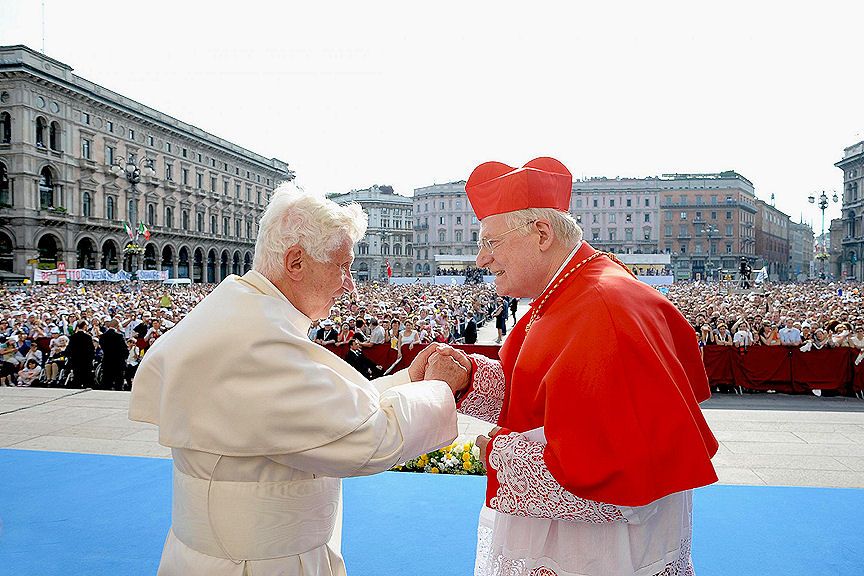
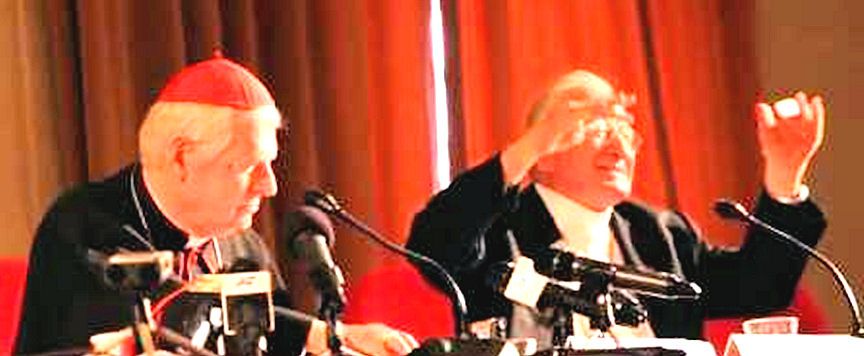 Cardinals Scola and Antonelli at the news conference on Monday, June 4.
Cardinals Scola and Antonelli at the news conference on Monday, June 4.
"When he arrived last Friday, the Pope told me that he is more comforted than tired [by recent events], and that he is convinced that demanding trips like these constitute a special grace for him", Cardinal Angelo Scola, Archbishop of Milan, told the media today at the concluding news conference on the VII World Meeting of Families held in this city May 28 to June 3.
"You must resign yourselves to actual fact: the opinion of the media is not public opinion. There's is a gross difference between what you report and what people really think, feel and live", he said, referring to the media coverage of Vatileaks in recent weeks, and of the Pope in general.
"You may think of yourself as being the vanguard, but throughout history, being the vanguard of controversy has been quite dangerous. The people love the Pope, and in particular these last few days, the Milanese have shown they love the Pope for the illuminating power of his humility along his superior intelligence about the faith and about man. In human beings, these two things rarely come together".
Cardinal Ennio Antonelli, president of the Pontifical Council for the Family, who co-presided at the news conference said the Pope remarked to him, "It's so beautiful to be in the midst of a living Church".
Antonelli said he found the remark "an indication that he is paying attention to the Church and not to 'marginal' things". The 'marginal things' clearly referred to Vatileaks and new developments about it.
But the organizers of the VII World Meeting on Families also presented statistics on the event, msot of them ahving to do with the presence of the Pope. And the numbers speak clearly.
- At least one million present at the Mass in Bresso-Parco Nord on Sunday.
- 350,000 participants in the Feast of Testimonials on Saturday night
- 80,000 recently-confirmed or about to be confirmed children at the football stadium on Saturday morning, with their parents and catechists
- Tens of thousands of wellwishers who lined the streets of Milan during the Pope's local transfers from one event to the next
And the special grace the Pope speaks about also reached the 3 million Italians who watched the RAI-1 live broadcast of the Feast of Testimonials - 25% of audience share on a Saturday night.
Fr. Davide Milani, spokesman for the ArchDIocese of Milan, said the audience drawn by the 'family feast' celebrated with the Pope was even more remarkable because "It was not your typical Saturday-evening fare - it was a program of substance, asnd yet it was the most viewed program that night".
Cardinal Scola underscored the responsibility that follows upon the VII World Meeting of Families: "Now it's up to us follow up on an important event that is significant because it lays emphasis on the 'ordinary' - the daily life of families".
He said this would be the second phase of the work he inherited from his predecessor, Cardinal Dionigi Tettamanzi, who started the preparations for the event, stressing 'family, work and solidarity' and deciding that "the diocese must re-invent the old-fashioned mutual aid societies".
Cardinal Antonelli said he was surprised by Benedict XVI's choice of Philadelphia to host the next World Meeting of Families. "In the short list of possible sites, I did not think Philadelphia was included. But then, all of the US bishops who have been to Rome for their ad limina visits in the past year have discussed the great difficulties and challenges faces by American families today , but that Catholic families also have a great vitality thanks to the positive contributions by the Church in the USA".
Other statistics on the Pope's visit
from the official site of the VIII WMF
TV viewership (from Auditel figures on viewership of Italian state TV RAI, mostly on its premier channel RAI-1):
2,097,000 Papal Mass on Sunday, June 3
1,791,000 "A Sua Immagine" focusing on the family and the Pope's visit, Sunday afternoon, June 3
3,082,000 Feast of Testimonials on Saturday night, June 2
1,305,000 “A Sua immagine” on Saturday afternoon
800,000 The Pope's meeting with the confirmands at San Siro stadium on Saturday morning, June 2
1,490,000 The Pope's address to the city of Milan in Piazza del Duomo, Friday afternoon, June 1
1,200,000 Concert at La Scala in honor of the Pope, Friday night, June 1
Police figures on attendance
and participation
150,000 lined the Pope's route on Sunday on his way to and from Bresso for the Mass
150,000 lined the Pope's route from the Archbishop's Residence in Milan to Linate airport om Sunday, June 3
200,000 lined the Pope's route from the Cathedral to San Siro and back to the Archbishop's residence, and then from the Archbishops residence to Bresso-Parco Nord on Saturday, June 2
100,000 lined the Pope's route from Linate airport to the Cathedrla of Milan on Friday, June 1
The Pope's other audiences:
On Saturday, June 2 -
5,500 Priests, religious and seminarians at the Cathedral of Milan on Saturday, June 2
80,000 Confirmands at San Siro Stadiumj on Saturday, June 2
95 Civilian officials and business leaders at the Archbishop's residence on Saturday, June 2
On Friday, June 1 -
80,000 Faithful assembled in Piazza del Duomo for the Pope's arrival
1,880 Attendees at the concert at La Scala
Assorted figures:
80,000 Visitors to the Family Fair in Bresso-Parco Nord
6,900 Foreign delegates to the Theoological-Pastoral Congress which opened the VII WMF
5,000 Tele-Participants in the Congress in Milan city center and other cities of Lombardy
5.300 Family2012 volunteers who worked the week of May 30-June3
900 Children who participated in the Congress for Children at Milan's fairgrounds
153 Nations represented at the VII WMF


[Modificato da TERESA BENEDETTA 06/06/2013 16:40] |
| |
 06/06/2013 19:28 06/06/2013 19:28 |
|
| | | OFFLINE | | Post: 26.788
Post: 9.273 | Registrato il: 28/08/2005
Registrato il: 20/01/2009 | Administratore | Utente Master | |
|
[Modificato da TERESA BENEDETTA 06/06/2013 22:14] |
| |
 06/06/2013 20:33 06/06/2013 20:33 |
|
| | | OFFLINE | | Post: 26.789
Post: 9.274 | Registrato il: 28/08/2005
Registrato il: 20/01/2009 | Administratore | Utente Master | |
|

 Wednesday, June 5, 2013, Ninth Week in Ordinary Time
Wednesday, June 5, 2013, Ninth Week in Ordinary Time
 Third from right, medieval illustration of the saint's preaching and martyrdom; center photo, John Paul II at Boniface's tomb in Fulda, Germany; next to it, a painting of Boniface's martyrdom.
ST. BONIFACE (born England ca 672, died Germany,754), Benedictine, Missionary, Apostle of the Germans, Martyr
Third from right, medieval illustration of the saint's preaching and martyrdom; center photo, John Paul II at Boniface's tomb in Fulda, Germany; next to it, a painting of Boniface's martyrdom.
ST. BONIFACE (born England ca 672, died Germany,754), Benedictine, Missionary, Apostle of the Germans, Martyr
Benedict XVI dedicated a catechesis to the saint on 3/11/09:
www.vatican.va/holy_father/benedict_xvi/audiences/2009/documents/hf_ben-xvi_aud_20090311...
Boniface was a learned monk who gave up the chance to be an abbot when he was assigned by Pope Gregory II to evangelize the Germanic tribes, where paganism was rife, and Christian teaching was lax for lack of appropriate catechists. He was much aided in his work by a letter of safe conduct from Charles Martel, father of Charlemagne. His mission was characterized by doctrinal orthodoxy and fidelity to the Pope. He established Benedictine convents to facilitate the mission and introduced Benedictine nuns to the work of education. On a mission to the Frisians, he and 53 others were killed while preparing converts for Confirmation. He is buried in Fulda, Germany.
AT THE VATICAN, June 5, 1013
At 9:15 a.m., Pope Francis met at Casa Santa Marta with the participants of a meeting among Catholic charitable
organizations who are assisting needy populations in Syria and neighboring countries of the MIddle East under
the coordination of the Pontifical Council Cor Unum. Address in Italian. The Vatican English translation here:
http://attualita.vatican.va/sala-stampa/bollettino/2013/06/05/news/31116.html#TRADUZIONE%20IN%20LINGUA%20INGLESE
At 10:30, he held his weekly General Audience in St. Peter's Square,
speaking on the theme "Cultivate and protect creation"
on the occasion of World Environment Day (June 5). Vatican Radio has the report, but not the full translation:
http://en.radiovaticana.va/news/2013/06/05/popes_general_audience_of_june_5,_world_environment_day_/in2-698611
Apropos, there was actually one small news item about Benedict XVI in this day's news:
Emeritus Pope gets 2012 diocesan prize
for promoting conservation of water resources
Translated from

June 5, 2013
The Diocese of Acqui Terme in the Piedmont region of Italy announced it has given its Grand Prize for 2012 in its Annual Premio Acui Ambienti in recognition of outstanding work for conserving and safeguarding water resources to Joseph Ratzinger, "who, in the course of his mission as Pontiff of the Roman Church, emphasized the importance of conserving the environment in its various aspects".
The jury that awarded the Prize said Benedict XVI's thoughts on the environment are best summarized in the book Per una ecologia dell’uomo (For an ecology of man), published by the Vatican Publishing House.
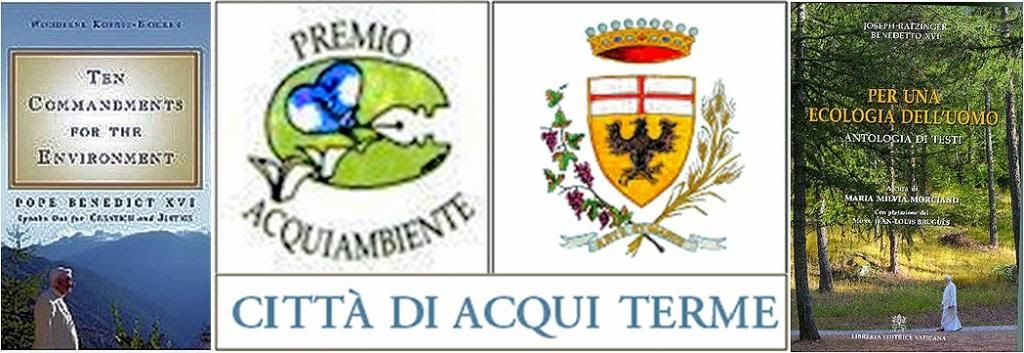
Benedict XVI was informed of the prize several weeks before he announced his renunciation of the Papacy. The Bishop of Acqui Terme,
Mons. Pier Giorgio Micchiardi, will accept it in his place.
My addendum:
In March last year, after his Angelus remarks, Benedict XVI said this:
Yesterday, in Marseilles, the VI World Forum on Water was concluded, and next Thursday, the world will mark the World Day of Water, which this year, focuses on the fundamental link between this precious and limited resource with food security.
I hope that these initiatives will contribute to guarantee equitable, sure and adequate access to water for all, thus promoting the rights to life and to nutrition of every human being, and a responsible and mutually supportive use of the goods of the earth for the benefit of present and future generations.
Under Benedict XVI, the Vatican, almost alone of all the countless entities concerned with the environment, has consistently promoted the conservation and sharing of water resources, especially in the poorer countries of Asia and Africa, which are chronically stricken with drought.
Here is a little sidebar about the book whose cover is in the photo above. In 2009, Benedict XVI had said enough in public about man's responsibility to preserve and protect creation that a researcher in Oregon had enough material for her 185-page book:
Author sheds light
on Pope’s 'greenness'
By Emily Smith
Monday, Aug 17, 2009
EUGENE, OREGON - Even some of the most devout Catholics are astonished to learn that Pope Benedict XVI powers his home in Germany by solar panels.
Although snippets of environmentalism have snuck into many of the Pontiff’s speeches and writings, Catholic author Woodeene Koenig-Bricker, 57, of Eugene, was as surprised as anyone to learn of the Pope’s fierce environmental advocacy, which she sheds light on in her new book, Ten Commandments for the Environment.
The notion of a green papacy is unfamiliar to most, she said. “People expect the Pope to talk about God, sex and marriage,” she said. “So the environment comes as a surprise to people.”
The Pope’s latest encyclical [Caritas in Veritate] touches on his own 10 commandments for the environment, but is hardly succinct, the author said. So, her book serves to enlighten on the Pope’s message and his own history with environmentally sound practices.
For instance, the Vatican set out to become the first carbon-neutral nation-state in the world just more than two years ago. In taking strides toward that goal, it has been outfitted with solar panels and has begun a reforestation project in Hungary.
And, of course, there’s Pope Benedict’s own home in Germany, which, like the Vatican, is heated by solar panels.
For a world leader — and a religious figurehead at that — to lead by example, not just pontificating, sets a new precedent for leadership, she said.
“Yes, he’s a theologian, but he’s also practical,” she said.
The environment was not a burning passion of Koenig-Bricker’s when she and her editor first discussed the Pope’s work as a book idea. But, she said, researching and writing about the green papacy led her to take the Pope’s message to heart.
“It forced me to change my life,” she said.
The Pope’s activism departs from the realm of politics and religion, Koenig-Bricker said, and enters that of morality.
“Care for the environment is truly a moral issue,” she said. “It’s not a religious issue, it’s not a dogmatic issue, but it is a moral issue.”
Although the Pope has given numerous talks on the environment, there has been little publicity of it. As she delved into the Pope’s writings, she was struck by his insistence that nations rich and poor alike have a responsibility to preserve the planet, each other, and all living species.
“I was taken aback a little by the intensity of his message and the extent of it,” she said.
Since humans alone are capable of destroying the environment, she said, the Pope urges that people take on the mission of saving it.
“The Pope makes a point of saying we have a responsibility to all the species on the planet,” she said. “We don’t have the right to force other species into extinction just because we can.”
Koenig-Bricker found the Pope’s message on potable clean water especially moving.
In a place with abundant clean water, she said, it’s easy to forget that people worldwide fight to survive without access to the same.
“Clean drinking water isn’t a privilege, it’s a right,” she said.
Since her research for the book, the writer has become vigilant about her own water waste.
From shutting off the water while she brushes her teeth to installing a sprinkler system to help eliminate excess water runoff in her yard, Koenig-Bricker said conservation has become a priority.
An exhaustive exercise in research, she said writing the 152-page paperback, with its 11 pages of footnotes, felt like preparing a dissertation. But it had its rewards.
“On a real personal level, it was an exciting intellectual stretch,” she said.
[Modificato da TERESA BENEDETTA 06/06/2013 23:43] |
| |
 06/06/2013 23:17 06/06/2013 23:17 |
|
| | | OFFLINE | | Post: 26.790
Post: 9.275 | Registrato il: 28/08/2005
Registrato il: 20/01/2009 | Administratore | Utente Master | |
|
 I thought it would be useful to re-post this essay by Fr. Schall one year ago on the 12th anniversary of Dominus Iesus just to remind us of what it was really all about...
'Dominus Iesus':
I thought it would be useful to re-post this essay by Fr. Schall one year ago on the 12th anniversary of Dominus Iesus just to remind us of what it was really all about...
'Dominus Iesus':
The truth about God
By Fr. James V. Schall, SJ

June 5, 2012
The truth about God is not abolished or reduced because it is spoken in human language; rather, it is unique, full, and complete, because he who speaks and acts is the Incarnate Son of God. Thus, faith requires us to profess that the Word made flesh, in his entire mystery, who moves from incarnation to glorification, is the source, participated but real, as well as the fulfillment of every salvific revelation of God to humanity, and that the Holy Spirit, who is Christ’s Spirit, will teach this “entire truth” to the Apostles and, through them,to the whole Church
- Dominus Jesus (§6)
Dominus Iesus was issued on the Feast of the Transfiguration in 2000. Cardinal Joseph Ratzinger was then Prefect of the Congregation for the Doctrine of the Faith. Though not “inspired,” perhaps, in any technical sense, still the document was “prophetic.” It represents the teaching of the ordinary Magisterium of the Church. In many ways, it is one of the most instructive and incisive of all recent papal documents. [Technically speaking, it was not a papal document, because it was issued by the CDF under the signature of Cardinal Joseph Ratzinger, and indeed, the document affirms many of the indispensable fundamental bases of Christianity as expressed by Joseph Ratzinger/Benedict XVI in his countless writings.]
As I look back on it now, it was a document meant to recall the central teaching of what Christianity is about. But even more, perhaps, it was to inspire Christians with the courage of their mission, which remains to go forth and teach all nations what Christ has asked and commanded. (1)
It does indicate that we should be prudent, and theologically accurate, in whatever we do. But it does not say: “Go forth and teach all nations, except Jews, Protestants, Muslims, Buddhists, Chinese communists, sincere secularists, or Hindus.” This would, in practice, only leave a few African pagans who are not yet Muslim or Christian.
The fact is that, even with all the technological means available to us today, politically and culturally, it is less and less possible to teach and present Catholicism outside its own confines, and it is often under attack there. Freedom of religion is today much narrower than at almost any time in modern history. “Hate language” legislation has become largely a democratic, totalitarian tool to silence any real freedom of religion.
The document begins by stating what the Church itself is obliged to do and teach. It defines positions which deviate from that central purpose that is put into the world by Christ. It is thus of great significance to know just who and what Christ was and is — God? a prophet? a zealous man? a madman?
“The Church’s universal mission is born from the command of Jesus Christ, and is fulfilled in the course of the centuries in the proclamation of the mystery of God, Father, Son, and Holy Spirit, and the mystery of the Incarnation of the Son, as saving event for all humanity” (§1). Obviously, at the end of the second millennium, “this mission is still far from complete” (§2).
At this point, many begin to wonder: “Why is it not complete?” Surely two thousand years is enough time to give to a divine project. The implication is either that it really is not divine, or that the folks in charge, the Pope and the hierarchy, have constantly botched the job, misunderstanding the mission. Many, therefore, want to find another way to salvation, one that would utilize other religions and rites. Christianity is only one among many ways, not the way.
Dominus Iesus reaffirms the centrality of the Church and the place of Christ, true man and true God. It also relates the truths, found in other religions and philosophies, to the purposes of revelation.
Citing Paul’s statement in 1 Corinthians 9 about the “necessity” to preach the Gospel, Dominus Iesus “explains the Magisterium’s particular attention to giving reasons for, and supporting the evangelizing mission of the Church, above all, in connection with the religious traditions of the world.”
Inter-religious dialogue does not replace the need to evangelize. There is only one way of salvation. Inter-religious dialogue is designed that Catholicism be understood by other faiths, and that the Church itself knows exactly what other faiths hold.
This mutual understanding is not conceived as an assault on other religions, but as a respectful understanding of how they think of themselves. Likewise, the Church has been misunderstood and misrepresented too often over the centuries to look kindly on the deliberate or inaccurate understanding of what it actually teaches and practices. It does not hide what it holds and teaches.
Dominus Iesus takes up “what has been taught in previous Magisterial documents, in order to reiterate certain truths that are part of the Christian faith” (§3).
“The Church’s constant missionary proclamation is endangered today by relativistic theories which seek to justify religious pluralism, not only de facto, but also de jure” (§4).
Relativism holds that there is no single religious truth. All religions have something that is admirable. Therefore, religions should be joined together in a kind of world parliament of religion, under some larger cultural or political authority, which would define the limits of belief and religious practice. The claim to preserve a genuine revelation, and to make it known, is considered a threat to all religions. In this theory, Catholicism becomes the real enemy of religions in the world.
The following basic doctrines of revelation, in this new order view, have now been “superseded”:
- The definitive and complete character of the revelation of Jesus Christ, the nature of Christian faith as compared with that of belief in other religions, the inspired nature of the books of Scared Scripture, the personal unity between the Eternal Word and Jesus of Nazareth, the unity of the economy of the Incarnate Word and the Holy Spirit; the unicity and salvific universality of the mystery of Jesus Christ, the universal salvific mediation of the Church, the inseparability — while recognizing the distinction — of the kingdom of God, the kingdom of Christ, and the Church, and the subsistence of the one Church of Christ in the Catholic Church (§4).
These positions are controverted on all sides. The Church has the duty to remain itself, in all ages, to teach what was handed down to it. This is the good that Christ was sent into the world to make clear. His teaching was about the ultimate human purpose, and how it was to be achieved.
The document immediately states the philosophical and theological background to the objections against the truth of this revelation. Every objection to the truth of revelation will have its roots in an alternate intellectual system. What are these presuppositions?
- The conviction of the elusiveness and inexpressibility of divine truth, even by Christian revelation;
- Relativistic attitudes toward truth itself, according to which, what is true for some, would not be true for others;
- The radical opposition posited between the logical mentality of the West, and the symbolic mentality of the East;
- The subjectivism which, by regarding reason as the only source of knowledge, becomes incapable of raising its “gaze to the heights, not daring to raise to the truth of being;”
- The difficulty in understanding and accepting the presence of definitive and eschatological events in history;
- The metaphysical emptying of the historical incarnation of the Eternal Logos, reduced to a mere appearing of God in history;
- The eclecticism of theologians, who uncritically absorb ideas from a variety of philosophical and theological contexts, without regard for consistency, systematic connection, or compatibility with Christian truth;
- The tendency to read, and to interpret, Sacred Scripture outside the Tradition and Magisterium of the Church (§4).
Needless to say, these statements themselves are a good review of the theology and philosophy behind the rejection of the specifically Catholic understanding of revelation. The document locates the background of arguments that, sooner or later, end up by denying essential positions of revelation. The courage to protect revelation includes the courage to state clearly what is revealed, and the reasons why it is credible.
The Koran, for example, denies both the Trinity and the Incarnation of the Man God. Indeed, it not only denies them, but forbids their expression. In the name of ecumenism, we often underestimate the virulence with which the Cross, and divinity of Christ, are denied in most segments of Islam. Calling Jesus a “prophet” here — as also occurs in liberal Christianity — is designed precisely to deny what is being taught in this document, that Jesus was not just a prophet, but the Son of God.
In the light of this view that Christ was only a prophet — a view obviously itself developed centuries after the events of Christ’s life—it is necessary to affirm that Christ was not a simply a prophet (as in the Koran), nor was he a revolutionary, nor a nice guy, nor a deluded madman. The separation of the Jesus of faith and the Jesus of history, so dear to much modern theology, is, as the document says, simply untenable on the basis of the text itself. The Christian dispensation “will never pass away” (§5).
The Koran’s version of another dispensation, replacing the Old and New Testaments, is simply untenable on its own, and on the grounds of the New Testament.
Nor are all religions, including Christianity, just so many partial revelations of something which none of them, by themselves, can completely grasp. There may be, and often is, some truth in most religions — from any era or in any part of the world. The Church does not deny this, but rather affirms it.
But the only salvific message about salvation, in its fullness, is given in Christ (§6). Moreover, we should try to express exactly what it means when we say that “Christ is true God, and true man.” We often need philosophy — usually Greek philosophy — to assist us. In using such terms, we do not betray, but fulfill, the intent of Scripture.
“The truth about God is not abolished or reduced because it is spoken in human language; rather, it is unique, full, and complete, because he who speaks and acts is the Incarnate Son of God” (§6). Those religions and systems that would say that God is so ineffable that he cannot be spoken of — so that we must lapse into silence concerning God — do not reckon with the significance of the Incarnation. The fact is that the Son of Man did use human speech, and used it accurately. This still grants that there is much more to be said, even when we have spoken rightly.
Theological faith, our personal adherence to God, and the “beliefs” of other religions are not equivalent. “The distinction between theological faith, and belief in the other religions, must be firmly held” (§7).
This position does not say that, therefore, nothing in other religions is valid, but rather that the central and coherent fullness of God’s revelation is in Christ, and nowhere else. Non-revealed religions are still groping for what God is. They belong to the virtue of pietas: what man naturally owes to God. Christian revelation in this sense is not a religion. It is initially God seeking man, not man seeking God, though both have their proper places (§7).
Some writers want to maintain that the books of other religions are also “inspired.” Often, the reason they want to maintain this view is because they despair of the Christian mission in the world. If all are to be saved, they argue, the only way this can happen is if the books and rites of other faiths are equally salvific with the Christian books.
The Church, however, reserves the term “inspiration” to the Old and New Testaments alone (§8). It does not deny that good things can be found in these other books, but not the proper explanation of what God has revealed. Nor does this mean that all men are not called to the same end.
Citing the famous passage from Gaudium et Spes §22, the document states that God will “not fail” to make ways known to them. But the source of these ways is not independent of Christ, and his relation to the human race. “The sacred books of other religions, which, in actual fact, direct and nourish the existence of their followers, receive from the mystery of Christ the elements of goodness and grace which they contain” (§8).
Other theories want to “elevate” the Holy Spirit to a position independent of Christ and His Church. The document has no trouble in admitting that the range of the Spirit, and grace, is outside the limited boundaries of the visible Church.
Jesus is not just another pious or holy figure, along with others (§9). “These theses (that say he is) are in profound conflict with the Christian faith. The doctrine of faith must be firmly believed which proclaims that Jesus of Nazareth, son of Mary, and he alone, is the son and the Word of the Father” (§10). Nor is it possible to maintain that the Word of God, the Logos, is one thing, and Jesus, the man, is another. They are one and the same.
There is but one salvific program that is revealed: that is in Christ, who is true man. He is the sole, universal redeemer. Any theory of redemption must pass through him (§11). This is why some theories of the Holy Spirit, providing an alternate way of redemption, are untenable.
The Holy Spirit is the Spirit of God. There is one redemption effected by the Trinity, for one purpose: that all men might be saved. “There are also those who propose the hypothesis of an economy of the Holy Spirit, with a more universal breadth than that of the Incarnate Word, crucified and risen. This position also is contrary to the Catholic faith, which, on the contrary, considers the salvific incarnation of the Word a Trinitarian event” (§12).
Even from the beginning of the world, as well as in areas not yet evangelized, the presence of the Holy Spirit is always directed to the incarnational event. The Church has no trouble in admitting that the work of the Spirit, even now, ranges freely over the earth; but its purpose is the same redemption in Christ. There is but one “divine economy.”
The salvific mission of Christ is universal, being one within itself. With rather dry words, the document reads: “The thesis which denies the unicity and salvific universality of the mystery of Jesus Christ is also put forward. Such a position has no biblical foundation” (§13).
The constant teaching is that salvation will finally come through the sacrifice of the Cross. There are not “many” ways to salvation. All salvation will be through the grace of Christ, through the plan of the Father in sending him, and his Spirit, into the world.
“Those solutions that propose a salvific action of God, beyond the unique mediation of Christ, would be contrary to Christian and Catholic faith” (§14). This reaffirmation is not stated with any arrogance or defensiveness. It is just a report of what the texts say, and of what the Church has always taught.
It is one thing to say that “I do not agree with this, or I do not think it applies to me.” What is of concern here is whether this unconcern is what the Church teaches, on the basis of its mandate in Scripture and tradition.
Some propose that “theology should avoid the use of terms like ‘unity’, ‘universality’, and ‘absoluteness’, which give the impression of excessive emphasis on the significance and value of the salvific event of Jesus Christ in relation to other religions. In reality, however, such language is simply being faithful to revelation” (§15).
The final two sections of Dominus Iesus have to do with the Church, and its role in our salvation. The Church was established: she is an organized society under the successor of Peter and the bishops (§16).
“Therefore, there exists a single Church of Christ” (§17). The mission of this Church remains to make known this single revelation to all men (§18). We may not like this establishment, or think we have a better plan. Rather, what is at issue here is: “What did Christ do?” The document states the difference between the Church, and churches and ecclesiastical bodies (§17). And there is no doubt that all Christians should worship in one Church.
The document is careful to distinguish between the Church, theKingdomofGod, and theKingdomofChrist(§18). These are biblical terms, and technical ones. Christ, as the man-God, is the center.
The Church is not identified with theKingdomofGod, but is not apart from it. It is within it, as a body set up by Christ, to carry out his mission in this world. The document notes a modern “kingdom-oriented” thesis that wants to downplay both Christ and the Church, in order to get everyone into the Kingdom of God.
Again, “these theses are contrary to Catholic faith because they deny the unicity of the relationship which Christ and the Church have with the kingdom of God” (§19). In wanting to gather everyone into the kingdom, they bypass the means and institutions that Christ set up in the world to accomplish what he offered to mankind.
Finally, the Church is not just one way, among other ways, to salvation. If there is going to be an eternal destiny for all mankind, as there is, it cannot avoid a relationship with Christ. Dominus Iesus states that the Church is necessary for salvation, but this doctrine should not “be set against the universal salvific will of God” (§20).
The true Church, established by Christ, “subsists in” the Catholic Church. This does not mean that grace and the Spirit are not operative beyond the visible Church’s structure, but it does mean that grace and the Spirit are not setting up some alternative way to salvation that somehow bypasses what the Church is.
“It would be contrary to the faith to consider the Church as one way of salvation alongside those constituted by the other religions, seen as complementary to the Church, or substantially equivalent to her, even if these are said to be converging with the Church toward the eschatological kingdom of God” (§21).
How all of this is to be coherently explained is something for theologians to ponder. Dominus Iesus is concerned with these issues, but within the parameters of what is given in revelation itself. We may not see how God’s salvific will — that all be saved — is explained within the context of what Christ said about baptism, and the Church. But any explanations should begin with these givens. Otherwise, we have, in effect, some other position that was established by Christ.
“With the coming of the Savior Jesus Christ, God has willed that the Church, founded by him, be the instrument for the salvation of all humanity. This truth of faith does not lessen the sincere respect which the Church has for the religions of the world, but at the same time, it rules out, in a radical way, the mentality of indifferentism, characterized by a religious relativism, which leads to the belief that ‘one religion is as good as another’” (§22).
The universal plan of God for salvation means that the Church must always, even today, be “missionary” to all peoples in ways that respect the freedom, intelligence, and customs of others, but which also include the core of revelation.
Thus, if it is asked about its truth, the Church must speak it. This truth is what it owes to the people of the world, who look for a salvation from their sins.
The document concludes by citing the Declaration on Religious Liberty (§1) from Vatican II: “We believe that this one true religion continues to exist in the Catholic and Apostolic Church, to which the Lord Jesus entrusted the task of spreading it among all peoples’” (§23).
Looking back over a decade since the publication of Dominus Iesus, we can note that in the meantime, we witness the rise of a militant Islam, the increased and aggressive secularism that no longer “tolerates,” but replaces religion, and the continued decline in births in formerly Christian areas.
We also see the growing doubt, in many quarters, that the Church is the mediator of salvation. As Benedict wrote in Spe Salvi, we see a secular eschatology, not the one given through the Lord Jesus, but invented by man himself.
We notice that the alternatives to Christianity are pale imitations of what men really want, which is eternal life. It is refreshing that the Church still has the vigor, in her heart and in her head, to reaffirm that the salvation, offered to mankind through Christ, remains the only one which answers the longing in men’s restless souls.
Surely, the Church is right to reaffirm what it is to the nations, whether they listen or not. To repeat: “The truth about God is not abolished or reduced because it is spoken in human language; rather, it is unique, full, and complete, because he, who speaks and acts, is the Incarnate Son of God” (§6).
[Modificato da TERESA BENEDETTA 06/06/2013 23:54] |
| |
 06/06/2013 23:20 06/06/2013 23:20 |
|
| | | OFFLINE | | Post: 26.791
Post: 9.275 | Registrato il: 28/08/2005
Registrato il: 20/01/2009 | Administratore | Utente Master | |
|

 Thursday, June 6, 2013, Ninth Week in Ordinary Time
Thursday, June 6, 2013, Ninth Week in Ordinary Time
 Woodcut shows Norbert receiving the Rule from St Augustine; statue is in the Founders' Gallery at St. Peter's Basilica.
ST. NORBERT (Germany, ca 1080-1134)
Woodcut shows Norbert receiving the Rule from St Augustine; statue is in the Founders' Gallery at St. Peter's Basilica.
ST. NORBERT (Germany, ca 1080-1134)
Benedictine, Missionary, Founder of the Norbertine Order, Bishop, Patron of Bohemia
Born near Cologne, he rose to be almoner in the court of Emperor Henry V during which he lived an indulgent life. A near-death experience led him
to penance, and at age 30, he joined the Benedictines. Intent on reforming the clergy and fighting heresies, he obtained papal permission to be an
itinerant preacher, at which time, miracles were already attributed to him. At the Council of Reims in 1119, Pope Callixtus II asked him to start
an order, which he did in Piemontre, France, (thus called the Premonstratarians, now more commonly, Norbertines) adapting the Augustinian rules.
The order spread rapidly throughout Europe. He was named Bishop of Magdeburg, where he went to work with a will at reforming the clergy. In this,
he worked with Saints Bernard of Clairvaux and Hugh of Grenoble. He died shortly after he was elevated to archbishop. He was buried in a Magdeburg
abbey but when the city became a center of Lutheranism during the Reformation, his remains were transferred to a church outside Prague where he is
venerated as a patron of Bohemia.
Readings for today's Mass:
usccb.org/bible/readings/060612.cfm
AT THE VATICAN TODAY
Pope Francis met with
-H.E. Mohammad Taher Rabbani, Ambassador from the Islamic Republic of Iran, who presented his credentials:
- Executive Board members of the Confederation of Latin American Religious
- Mons. Beniamino Stella, President of the Pontifical Ecclesiastical Academy (training college for Vatican diplomats)
- Students, professors and staff of the Pontifical Ecclesiastical Academy. Address in Italian. English translation here:
http://en.radiovaticana.va/news/2013/06/06/pope_francis_to_future_diplomats:_no_to_careerism!/en1-698966
 One year ago...
One year ago...
At the General Audience, Benedict XVI gave an account of his three-day pastoral visit to Milan where he also presided over the concluding events of the VII World Meeting of Families... The Vatican released the text of Benedict VXI's letter dated May 23, 2012, congratulating Her Majesty Queen Elizabeth II of the United Kingdom on the Diamond Jubilee of her coronation.
TWO YEARS AGO TODAY....
Benedict XVI ended a three-day apostolic visit to Cyprus, which produced one of the most unusual events during the Pope's travels. The papal processional towards the Church where he was to celebrate Mass took place, overlooked by armed UN forces, on a street at the edge of the UN-designated buffer zone between the Turkish and Greek sectors of Nicosia, the capital. That, in itself, was unusual, even if the convent where he stayed during the visit was just around the corner from the Church. But something even more unusual happened at the start of that walk...
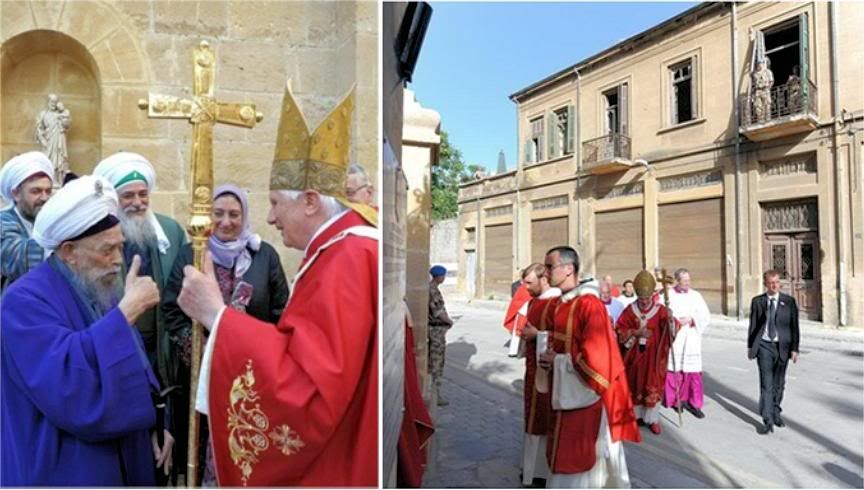 An 89-year-old imam, leader of a Sufi (mystic Muslims) sect, who lives on the Turkish side, waited a few hours to see the Pope as he walked out of the convent to say Mass for the Catholic community of Nicosia at the nearby cathedral, so he could greet the Pope and present him with a gift (a decorative plaque with an Arabic inscription). Their fraternal embrace was touching.
An 89-year-old imam, leader of a Sufi (mystic Muslims) sect, who lives on the Turkish side, waited a few hours to see the Pope as he walked out of the convent to say Mass for the Catholic community of Nicosia at the nearby cathedral, so he could greet the Pope and present him with a gift (a decorative plaque with an Arabic inscription). Their fraternal embrace was touching.

Today is also the 69th anniversary of D-Day, the Allied landings in Normandy that spelled the beginning of the end of World War II in Europe... Very notably, John Paul II sent German Cardinal Joseph Ratzinger to represent him at the 60th anniversary of D-Day in 2004.

[Modificato da TERESA BENEDETTA 12/06/2013 01:40] |
| |
 07/06/2013 00:54 07/06/2013 00:54 |
|
| | | OFFLINE | | Post: 26.792
Post: 9.276 | Registrato il: 28/08/2005
Registrato il: 20/01/2009 | Administratore | Utente Master | |
|
 'Benedict XVI is doing well'
'Benedict XVI is doing well'
German author says after
a visit to Mater Ecclesiae
Adapted and translated from the German service of

June 6, 2013
[I had to tweak the report around, because in the original, one does not learn until the fifth paragraph that Lutz visited eB16 with Cardinal Cordes, which is a strange oversight, considering that the purpose of the visit was to present the Pope with a book co-authored by the two!]
German psychiatrist and best-selling author Manfred Lutz recently had an honor that very few persons today will experience: On Tuesday evening, he and German Cardinal Paul Josef Cordes, emeritus president of the Pontifical Council Cor Unum, visited Emeritus Pope Benedict XVI at the Vatican.
They presented him with a new book that they wrote together entitled Benedikts Vermächtnis und Franziskus` Auftrag. Entweltlichung – Eine Streitschrift [Benedict's legacy and Francis's task: Detachment from the world - a debate].
Lutz says about Benedict: "it was a very warm and familiar atmosphere, just as we had known him earlier, completely quick-witted. Of course, he is older now, and a bit more stooped. But he was
trigger-ready in his answers. There were times when we would recount something to him, and he would reply. 'Yes, you told me that before'. He continues to be humorous in a way that has always been his style. Above all, he did not give the impression that he was in any way depressed". Lutz said the visit lasted half an hour.
[Mr. Lutz is a psychiatrist, so he should know. But I find it really strange that anyone should speak of B16 as if, just because he is no longer Pope, his mental faculties would have changed drastically overnight - from that peak display during his 45-minute extemporaneous lesson on Vatican II three days before he stepped own as Pope! It's only been three months since he retired!]
Asked whether Pope Francis's line on 'detachment from the world' is continuous with that of Benedict XVI, Lutz said: "Benedict himself observed that, saying that the theology of Pope Francis appears to be very much in tune with his own, and will take it even farther [on the question of worldliness]. I found it very important that the theologian Pope has that impression".
Benedict told Cordes and Lutz that he lives like a monk at Mater Ecclesiae. "I pray and I read". He said he did not feel as if he had 'given up' the Petrine ministry, only that he was "carrying it out in a different form".
"He has not separated himself from Petrine service but he lives it in prayer. I found that a very striking expression. He did say that he prays and he reads. He did not say he has been writing".
After the General Audience on Wednesday, Cordes and Lutz also presented a copy of their book to Pope Francis.
Angela Ambrogetti had a slightly different presentation of the above but she based hers on an interview given by Lutz to the German tabloid BILD. Here is a translation of the BILD article:
Benedict XVI on his life as a hermit:
'I feel fine, I live like a monk'
German author Manfred Lutz belies rumors
about the emeritus Pope's state of health
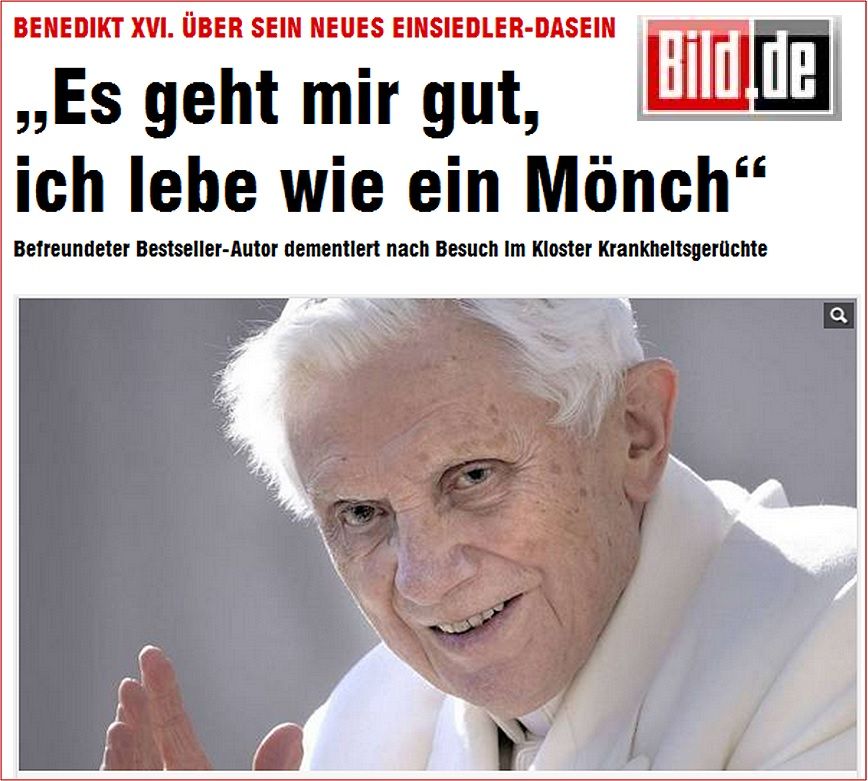 The photo is from Benedict XVI's last General Audience on February 27, 2013.
The photo is from Benedict XVI's last General Audience on February 27, 2013.
by Vatican Correspondent ALBERT LINZ
Translated from BILD
June e5, 2013
Finally we can dispose of the most dubious 'diagnoses from afar' of the state of Benedict XVI's health!
For weeks, rumors have been floating about in the Vatican and in newsrooms around the world that Benedict XVI, in his retirement home at the Vatican's Mater Eccclesiae monastery, can hardly take food anymore.
There had been earlier talk, of course, that he was suffering from some terminal illness, even if Vatican spokesman Fr. Lombardi has repeatedly said there is no truth to such speculation, and that the emeritus Pope has nothing more than "the afflictions of old age that are normal for any 86-year-old".
Benedict XVI himself had said on announcing his renunciation of the Papacy that the reason for his decision was his 'diminishing strength'.
Benedict XVI has now received a visit from a couple of old friends at his retirement home: bestselling author Manfred Lutz and former Curial Cardinal Paul Josef Cordes who have written an attention-getting book over necessary reforms in the Church in Germany.
Lutz's impression after a half-hour visit with Benedict XVI: "He was quick on the draw, witty, very involved and good-humored as he has always been".
He appears to have settled quite well into his retirement, which he has described as 'a humble service to the Church': "I live like a monk. I pray and I read. I feel fine", the emeritus Pope told his visitors.
Lutz, who studied medicine and theology, has known Joseph Ratzinger for more than 30 years, since he was a university student in Rome and lived in the Vatican. For a time, he lived under the same roof with then Cardinal Ratzinger. [Probably during the months the cardinal lived in a German priests' residence in Rome after his sister's death.]
Lutz said he did not sense - 'not in the least' - any disturbance in Benedict XVI about the enthusiasm of the faithful for his successor and his decisive personal 'style'.
"Benedict XVI has retained all his serenity and Christian cheeerfulness which arise from being secure in his faith -even if he is physically less strong and more stooped than he was than at our last meeting".
The Cordes-Lutz book is based on Benedict XVI's admonition to the Catholics of Germany against 'worldliness' in the now-famous 'Freiburg address' during his last visit in 2011
Asked about the striking frequency with which Francis speaks about the "Church of the poor", Benedict said his impression was that "Theologically, we are entirely in tune".
He was, of course, especially interested in the Cordes-Lutz book which takes up his Freiburg admonition that the Church in Germany should renounce power and influence in order to concentrate on its essential tasks.
The authors say that the Church in Germany must stop employing too many people who do not even identify with the Church, and that
Catholic schools, hospitals, homeless centers and child care centers must be run by convinced and convincing Christians.
Their conclusion: Instead of just the paid staff of social organizat6ions, all German Christians should be encouraged to be more directly involved in helping others in need, to help and to serve them, because charity cannot be delegated.
[Modificato da TERESA BENEDETTA 07/06/2013 03:09] |
| |
|
|
|
|